The Diagnosis That Changed Everything
My name is Lorraine, and I'm a 46-year-old wife and mother facing the most challenging chapter of my life. I sit in the sterile examination room, the doctor's words still ringing in my ears: breast cancer. Two simple words that just shattered my entire world. The fluorescent lights suddenly seem too bright, and I can't stop staring at my hands, wondering if they'll lose their strength during treatment. As I drive home clutching the folder of information—a folder no one ever wants to receive—my mind races with how I'll tell Mark and our children. But even more, I dread telling Patricia, my mother-in-law. That woman has opinions about EVERYTHING, especially health. Last Thanksgiving, she lectured us for an hour about the dangers of microwave ovens and how they're secretly destroying our immune systems. I can already hear her voice: "Well, if you'd been taking that oregano oil I recommended..." I grip the steering wheel tighter, tears blurring the road ahead. How do you tell your family that the person they rely on—the one who makes the dentist appointments and remembers the permission slips—might not be able to do those things for a while? And how do I prepare myself for Patricia's inevitable health crusade that's about to descend upon my already overwhelmed household?
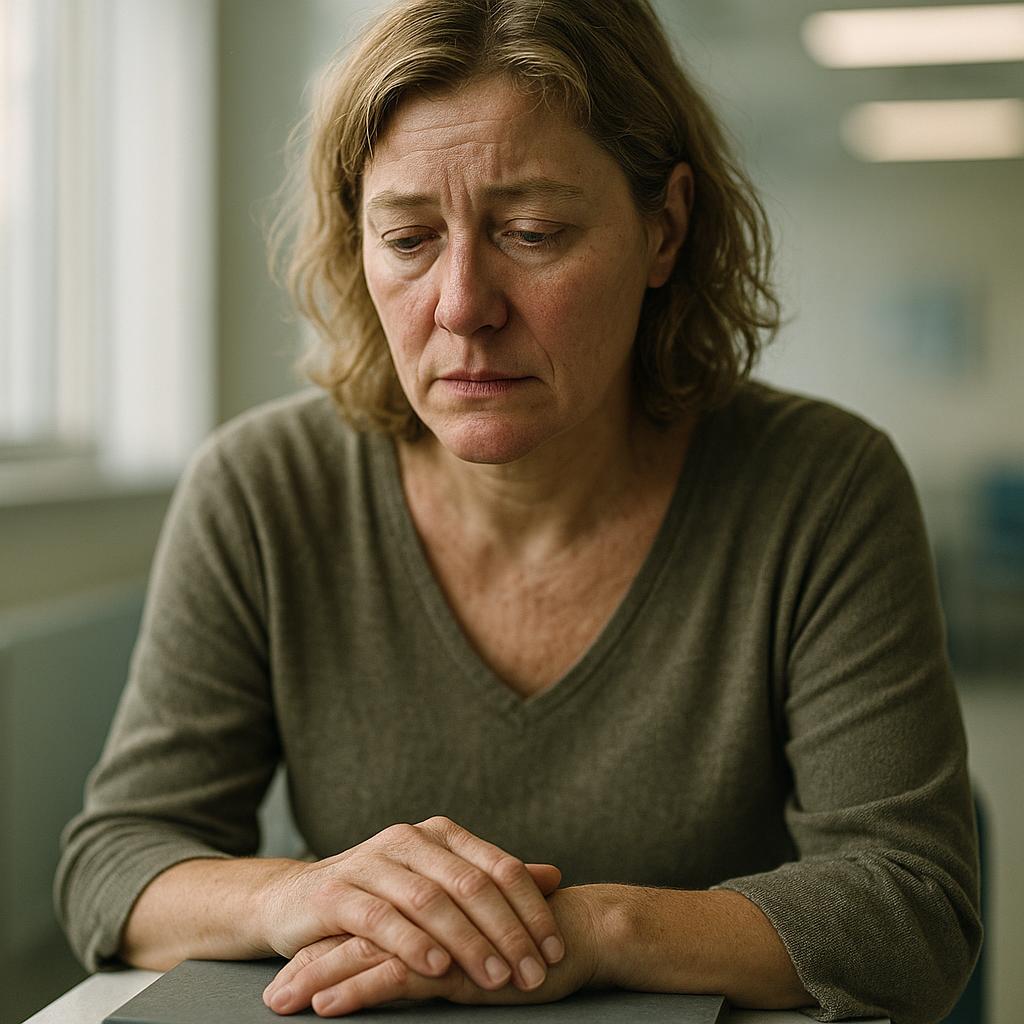 Image by RM AI
Image by RM AI
Breaking the News
I sat Mark down that evening after the kids went to bed, clutching my diagnosis papers like they might burn through my fingers. When I finally managed to say the words 'breast cancer,' his face crumpled in a way I'd never seen before. He pulled me into his arms, and I just broke. I sobbed against his chest while he held me, his body solid when mine felt like it was dissolving. 'We'll fight this together,' he whispered into my hair. 'Every step.' Telling the kids was another kind of heartbreak. Emma immediately went into research mode, her laptop becoming a command center of medical journals and survivor stories. 'Mom, I found a support group that meets near us,' she said, her voice steady even as her eyes glistened. Jason, though—my talkative, always-joking son—just nodded silently and disappeared into his room. I found him later staring blankly at his video game, controller untouched. But nothing prepared me for Patricia's reaction when Mark called her. 'Oh, those doctors always jump to the worst conclusion,' she said, her voice dripping with dismissal. 'Have you tried eliminating dairy? My friend Cheryl had a lump that disappeared completely after she stopped eating cheese.' Mark's knuckles went white around the phone, and I knew right then that Patricia's 'help' was going to be its own kind of battle.
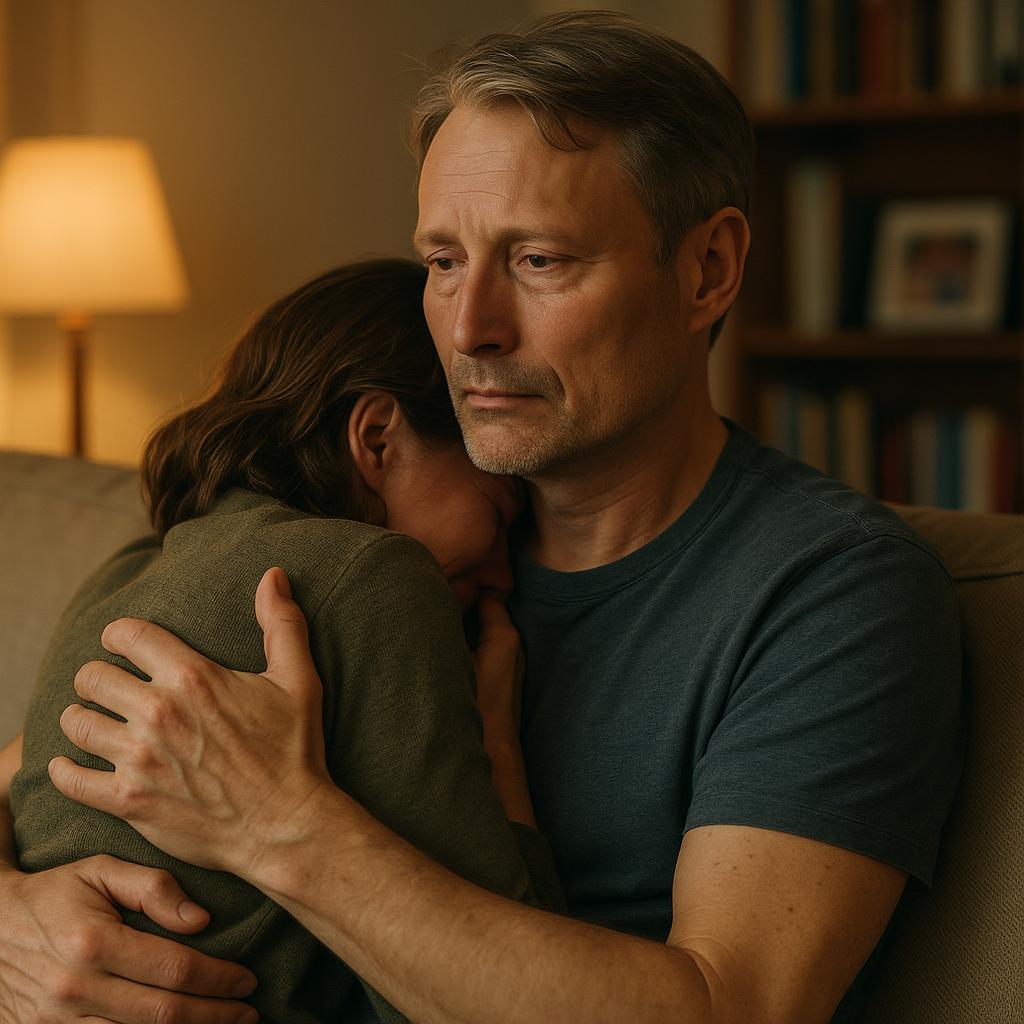 Image by RM AI
Image by RM AI
The Treatment Plan
Dr. Sharma's office feels like a war room as he lays out my battle plan against cancer. Surgery first to remove the tumor, then chemotherapy to kill any remaining cancer cells, followed by radiation. I nod along, trying to look brave while my insides feel like they're being twisted into knots. Mark sits beside me, his pen scratching furiously across his notepad. He's always been my rock, the organized one when I'm falling apart. 'We have an excellent success rate with this protocol, Mrs. Wilson,' Dr. Sharma says with gentle confidence. I want to believe him more than anything. But my phone keeps buzzing in my purse—Patricia again. Since my diagnosis, she's appointed herself my unofficial 'alternative medicine consultant.' Just this morning, she sent me five links about how wheatgrass juice 'melts tumors' and something called 'German New Medicine' that suggests cancer is just emotional trauma manifesting physically. I silence my phone without looking at it. 'Any questions?' Dr. Sharma asks. I have a thousand, but they're all variations of 'Am I going to die?' Instead, I ask about side effects and recovery time. As we leave the office with a folder full of information and prescriptions, Mark squeezes my hand. 'One day at a time,' he whispers. What he doesn't know is that I'm already dreading Sunday dinner, where Patricia will undoubtedly try to convince me that her essential oil diffuser is more effective than my chemotherapy.
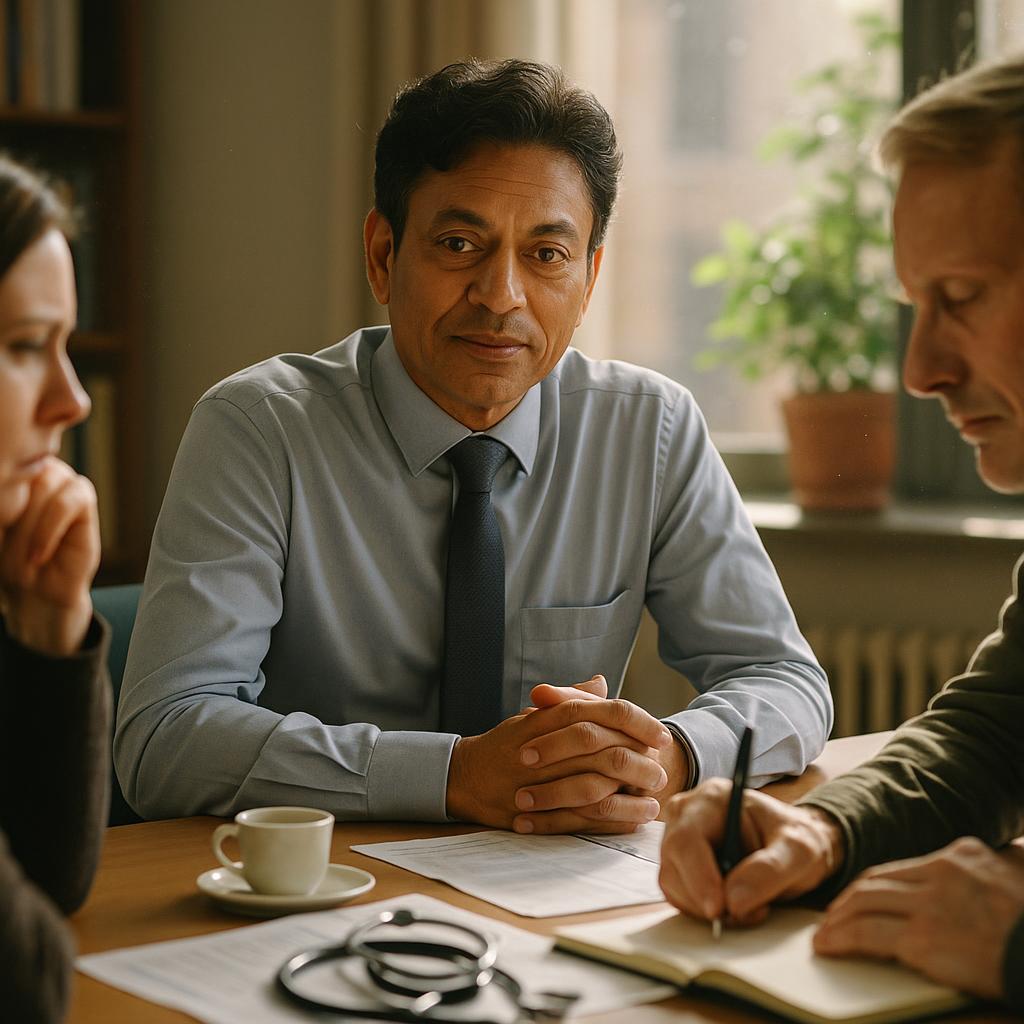 Image by RM AI
Image by RM AI
Patricia's First Visit
The doorbell rang three days after my first chemo session, when I was still feeling like I'd been hit by a truck. There stood Patricia, not with flowers or a casserole, but with three bulging canvas tote bags and that determined look I'd come to dread. 'I've been researching, Lorraine,' she announced, brushing past me into the kitchen. Before I could even offer her coffee, she'd commandeered my counter space, lining up bottles of murky liquids, powders, and pills like she was setting up a medieval apothecary. 'This one,' she said, holding up a bottle of something that looked like pond water, 'reversed stage four cancer in my friend's cousin's neighbor.' Mark walked in and froze, his eyes meeting mine in silent panic. Patricia didn't notice—she was too busy explaining how apricot kernels contain 'secret compounds' the pharmaceutical companies don't want us to know about. 'And I've printed out all these testimonials,' she continued, slapping down a stack of papers from websites with names like 'TruthHealers' and 'BigPharmaTruth.' I sat down, suddenly exhausted, as she pulled out a book titled 'Cancer: The Disease That Doesn't Exist.' My nausea pills were upstairs, and I desperately needed one, but Patricia had positioned herself between me and the staircase, her evangelical fervor for alternative medicine creating an impenetrable force field. What I didn't realize then was that this visit was just the opening salvo in Patricia's campaign to 'save' me from modern medicine—a campaign that would soon take a much darker turn.
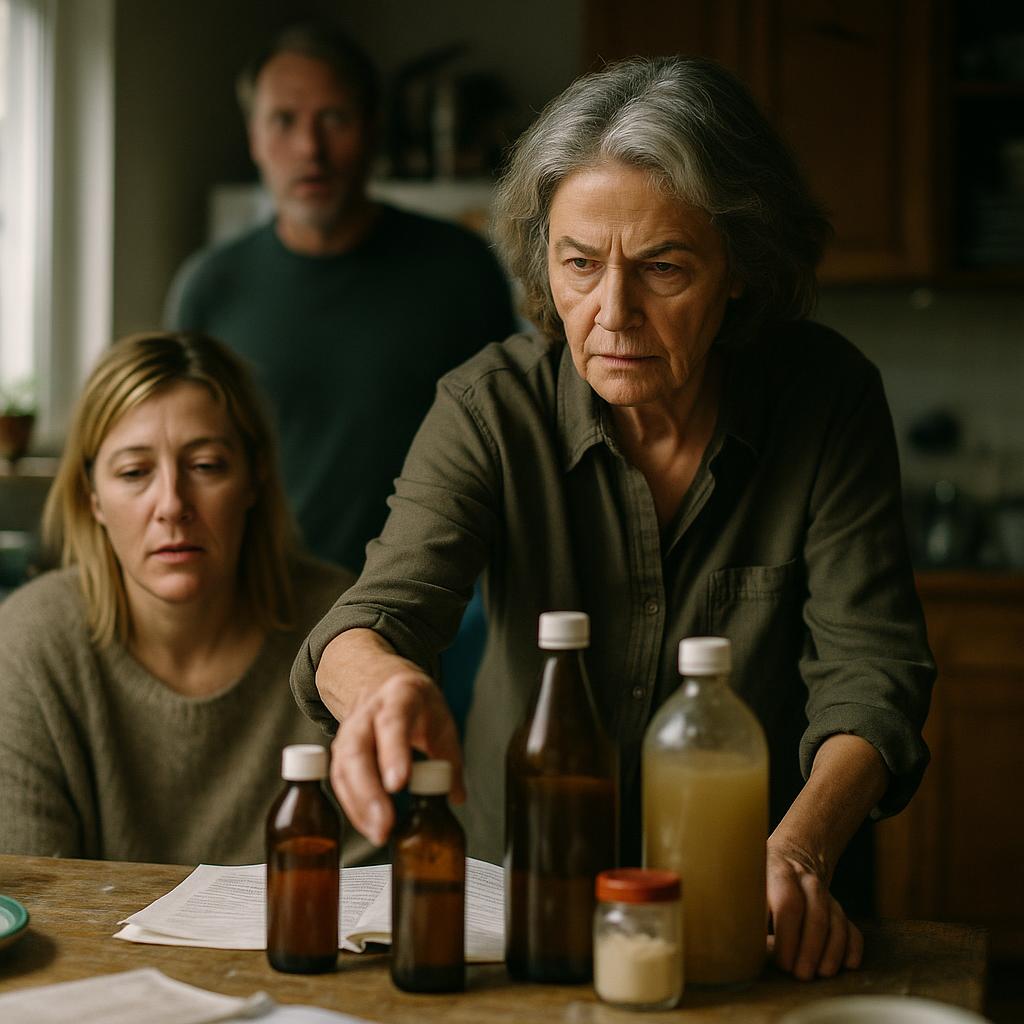 Image by RM AI
Image by RM AI
Surgery Day
The morning of my lumpectomy arrived with a jolt—not from my 5 AM alarm, but from the sound of Patricia rummaging through our kitchen cabinets. Somehow, my mother-in-law had let herself in with the emergency key we keep under the garden gnome. 'Lorraine! I made you a pre-surgery cleansing juice!' she announced triumphantly, holding up a mason jar filled with what looked like liquified grass clippings and smelled even worse. Mark appeared behind me, his face a mixture of shock and barely contained frustration. 'Mom,' he said firmly, taking the jar from her hands, 'Lorraine can't have anything to drink. Doctor's orders. She's fasting for surgery.' Patricia's face fell like I'd just rejected a life-saving elixir. 'But the toxins—' she began, before Mark gently guided her away from me. At the hospital, things went from awkward to mortifying when Patricia cornered poor Dr. Sharma in the waiting room. 'Have you considered the long-term effects of anesthesia toxins?' she interrogated him while he tried to politely escape. I watched in horror until Emma, bless her heart, swooped in with a distraction. 'Grandma, I found this article about organic healing crystals on my phone. Can you explain how they work?' As Dr. Sharma made his getaway, our eyes met briefly, and I mouthed 'I'm sorry' while being wheeled toward the operating room. What I didn't know then was that Patricia's interference was about to escalate from annoying to dangerous.
 Image by RM AI
Image by RM AI
Recovery and Revelations
The pathology results came back three days after my surgery, and Mark held my hand as Dr. Sharma delivered the news: Stage 2B, with cancer cells found in one lymph node. 'This means chemotherapy is non-negotiable, Mrs. Wilson,' he explained gently. 'It's our best chance to ensure we get all the cancer cells.' I nodded, tears welling up despite my determination to stay strong. When we told Patricia later that evening, her face transformed into a mask of disbelief and indignation. 'But the surgery was supposed to remove everything!' she protested, as if arguing with a store clerk about a refund policy. 'This is exactly how they trap you,' she muttered, not quite under her breath. 'Doctors creating customers, not cures.' Mark shot her a warning look, but she just pressed her lips together and busied herself rearranging the fruit basket she'd brought. That night, exhausted and sore from surgery, I noticed something new on my nightstand—a book with a garish cover showing syringes shaped like dollar signs: 'The Cancer Industry: The Truth They Don't Want You To Know.' I stared at it in the dim light, feeling something shift inside me. Not fear this time, but anger. Pure, clarifying anger. Who does this woman think she is, undermining my treatment when my literal life is at stake? I tossed the book into my bedside drawer and slammed it shut. Little did I know that Patricia's 'helpful' interventions were about to cross a line I never imagined possible.
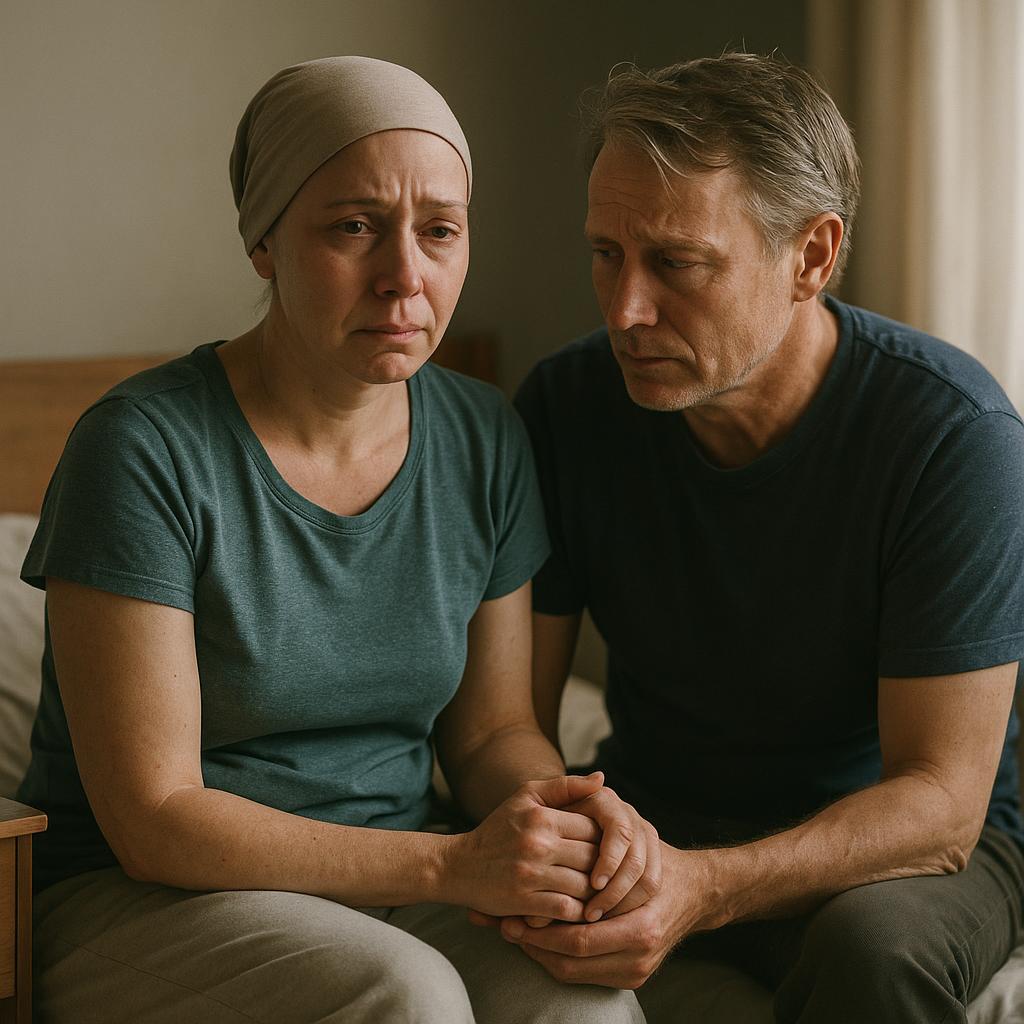 Image by RM AI
Image by RM AI
The Wellness Group
Patricia's 'wellness circle' invitation came with the enthusiasm of someone offering a winning lottery ticket. 'It'll change your perspective on healing,' she promised. To keep the peace, I reluctantly agreed to go, finding myself one Tuesday evening in the back room of a crystal shop that smelled like patchouli and desperation. Six women sat in a circle on meditation cushions, nodding knowingly at each other as Patricia introduced me. 'This is my daughter-in-law, Lorraine,' she announced. 'The one I told you about.' My stomach dropped. These strangers knew about my cancer. The leader, Greta—a woman with silver-streaked hair and eyes that burned with missionary zeal—took my hands in hers. 'The medical establishment has failed so many of us,' she said, staring directly into my soul. One by one, the women shared their stories: diabetes cured by cinnamon, thyroid disorders reversed through visualization, tumors shrunk by positive thinking. When Greta started her PowerPoint presentation titled 'Chemotherapy: The Poison They Call Medicine,' I felt trapped in an alternate reality. 'Big Pharma doesn't want cures,' she declared, pointing at a slide showing doctors with dollar signs for eyes. 'They want customers.' The women all turned to look at me with such pity, as if I were a lamb being led to slaughter, and I realized with growing horror that Patricia hadn't just shared my diagnosis—she'd brought me here to be saved.
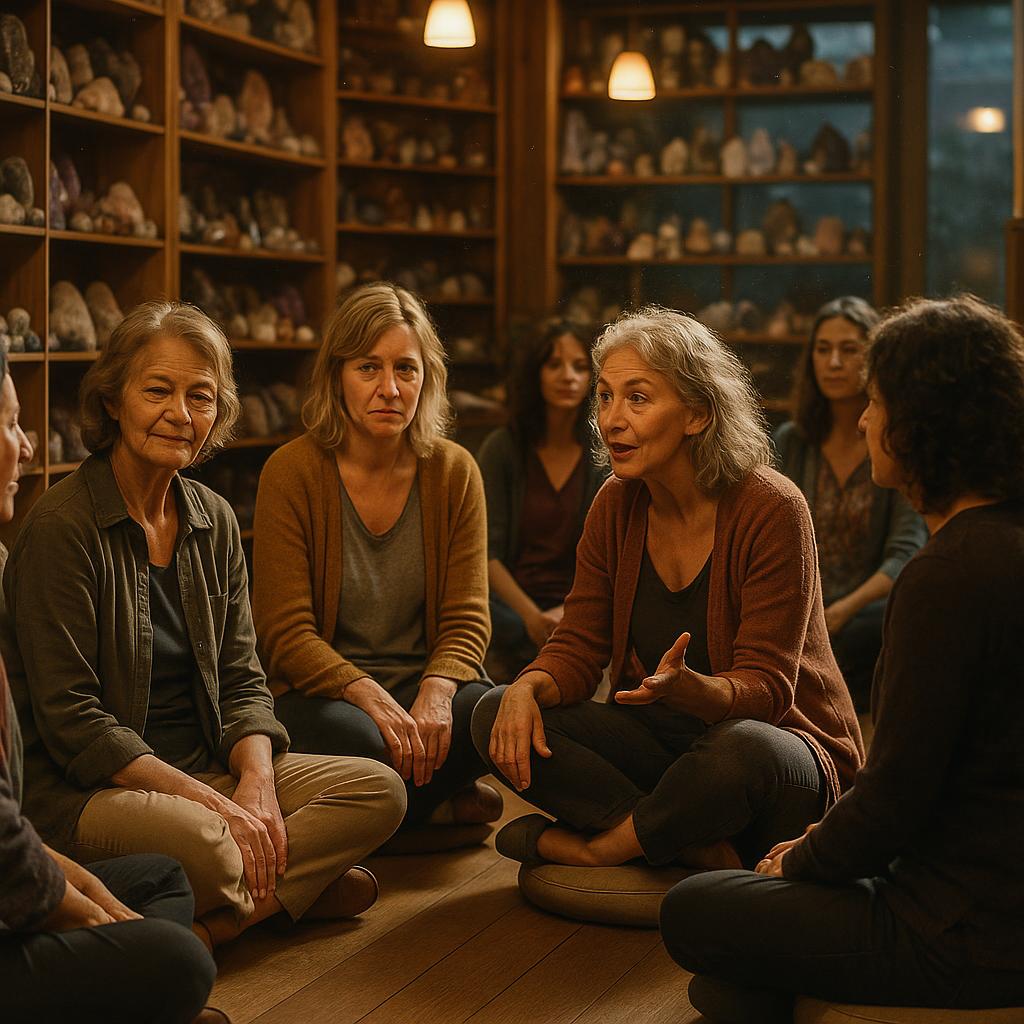 Image by RM AI
Image by RM AI
Preparing for Chemotherapy
I sat in front of my bathroom mirror, watching as Emma carefully snipped away at my hair. Each lock that fell to the floor felt like saying goodbye to a part of myself. 'You look like Audrey Hepburn, Mom,' Emma said, trying to make me smile as she styled my new pixie cut. I touched the short strands, tears streaming down my face. 'It's just hair,' I whispered, more to myself than to her. 'It'll grow back.' The doorbell rang just as we finished, and there stood Patricia, arms loaded with shopping bags. 'I brought headscarves!' she announced, barging in without waiting for an invitation. She dumped colorful fabrics onto my couch before pulling out a brown bottle labeled 'ChemoGuard' in what looked like homemade printer labels. 'This is essential,' she insisted, placing it on my kitchen counter. 'Take it before treatments to protect your cells from damage.' I exchanged glances with Emma. 'Patricia, I appreciate it, but I'm following my doctor's protocol,' I said gently. Her smile tightened, eyes narrowing slightly. 'Of course you are,' she replied, patting my arm with cold fingers. 'But you'll change your mind when you see how sick they make you.' She left the bottle anyway, prominently displayed next to my prescription medications. What I didn't realize then was how far Patricia would go to 'protect' me from my life-saving treatment.
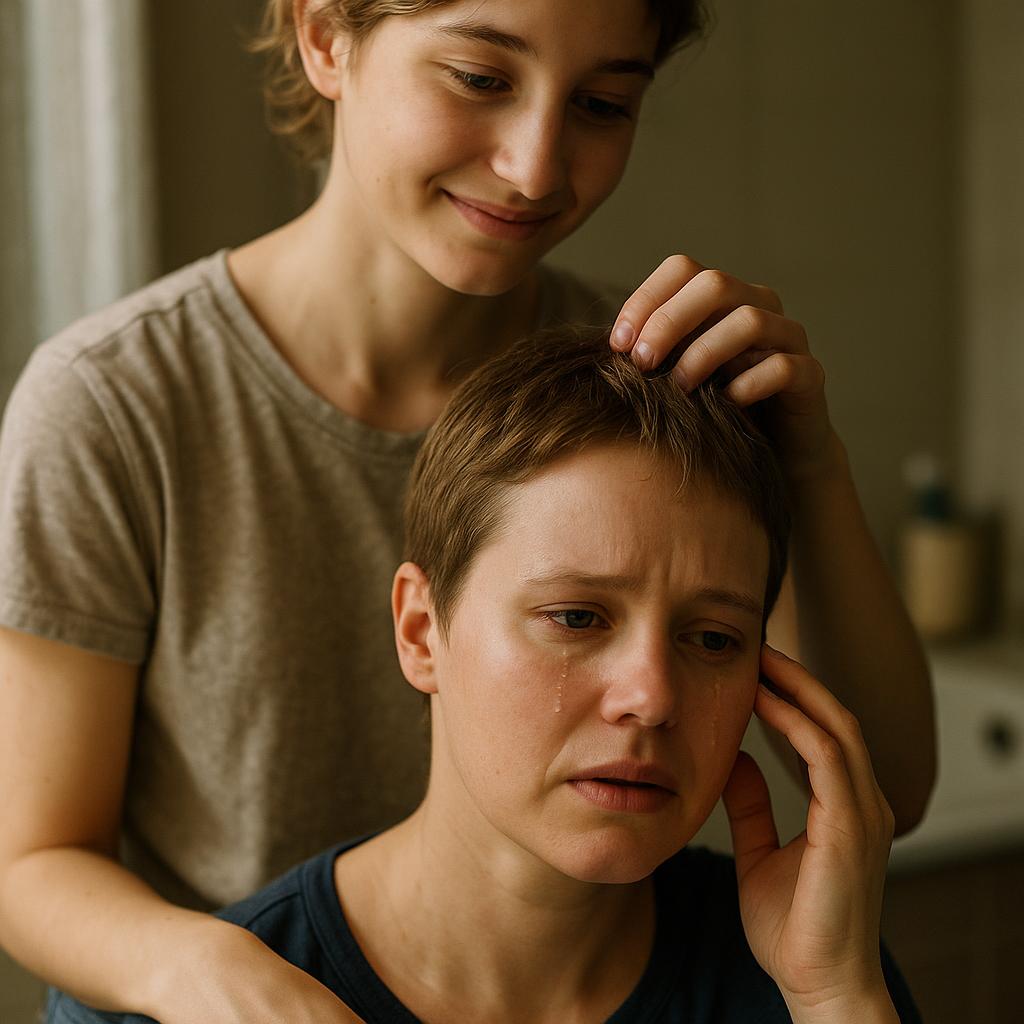 Image by RM AI
Image by RM AI
First Chemo Session
The oncology center's waiting room felt like a strange limbo between hope and fear. Diane, my nurse with kind eyes and steady hands, smiled reassuringly as she prepared my IV. 'First time's always the scariest,' she said, finding a vein with practiced precision. Mark squeezed my hand so tightly I could feel his pulse jumping through his fingers. We were both terrified but performing this silent dance of pretending we weren't. Then Patricia burst through the door like she was storming the Bastille. 'What exactly is in that bag?' she demanded, pointing at the clear liquid about to enter my veins. Diane explained the medication calmly, but Patricia wasn't having it. 'You're pumping her full of poison!' she hissed, loud enough that other patients turned to stare. The charge nurse appeared like a guardian angel, her voice firm but professional. 'Ma'am, you need to lower your voice or step outside.' Mark finally stood up, his face flushed with embarrassment. 'Mom, let's talk,' he said, guiding her toward the hallway. When they returned twenty minutes later, Patricia sat silently in the corner chair, her lips pressed into a thin line, but her eyes—those eyes burned with something that made my skin crawl. It wasn't concern. It wasn't even anger. It was the look of someone who believes they're watching a loved one being sacrificed, and who's already planning their rescue mission.
 Image by RM AI
Image by RM AI
Side Effects Begin
The nausea hit me like a freight train on day two after my first chemo treatment. I'd heard about the side effects, but nothing prepared me for this—the room spinning every time I moved my head, the constant feeling that my stomach was trying to turn itself inside out. Mark became my medication guardian angel, setting up a little plastic organizer on our nightstand with all my anti-nausea pills meticulously labeled with times and doses. 'Just follow the schedule, babe,' he said, kissing my forehead. 'It'll help.' Meanwhile, Patricia launched her own intervention campaign. She called hourly—HOURLY—until Mark finally stopped answering the phone altogether. I was drifting in and out of sleep when I heard her voice downstairs. Before Mark could intercept, she appeared in our bedroom doorway clutching a thermos of something that looked like swamp water. 'This will detoxify the chemotherapy while still giving you the benefits,' she announced, as if she'd discovered the holy grail of cancer treatment. The smell alone made me gag. Mark firmly guided her back downstairs, their hushed argument floating up through the floorboards. What Patricia didn't understand—or refused to understand—was that I needed those 'toxins' she was so desperate to flush out of my system. They were the very things fighting to keep me alive. But as I would soon discover, my mother-in-law's determination to 'save' me was about to take a terrifying turn.
 Image by RM AI
Image by RM AI
The Support Group
Every Tuesday at 3 PM, I found myself in the hospital's basement conference room, surrounded by people who truly understood what I was going through. The cancer support group became my sanctuary—the one place where I could admit I was terrified without someone immediately trying to 'fix' it with positive thinking or miracle cures. 'I'm just so tired of pretending I'm brave all the time,' I confessed during my second meeting, tears streaming down my face. Sarah, a vibrant 52-year-old with a colorful head scarf and infectious laugh, reached over and squeezed my hand. 'Honey, we all wear that mask,' she said. 'In here, you can take it off.' When I finally worked up the courage to mention Patricia's 'alternative treatments' and medication interference, knowing looks circulated around the circle like a silent current. 'My sister-in-law was the same way,' Sarah told me after the meeting, her eyes serious. 'Started with articles, ended with her throwing away my tamoxifen when I wasn't looking.' She gripped my shoulders firmly. 'Lorraine, you need to set boundaries now, before this escalates. People like your mother-in-law don't stop until someone makes them.' I nodded, feeling a chill run through me at her words—not knowing then just how prophetic they would turn out to be.
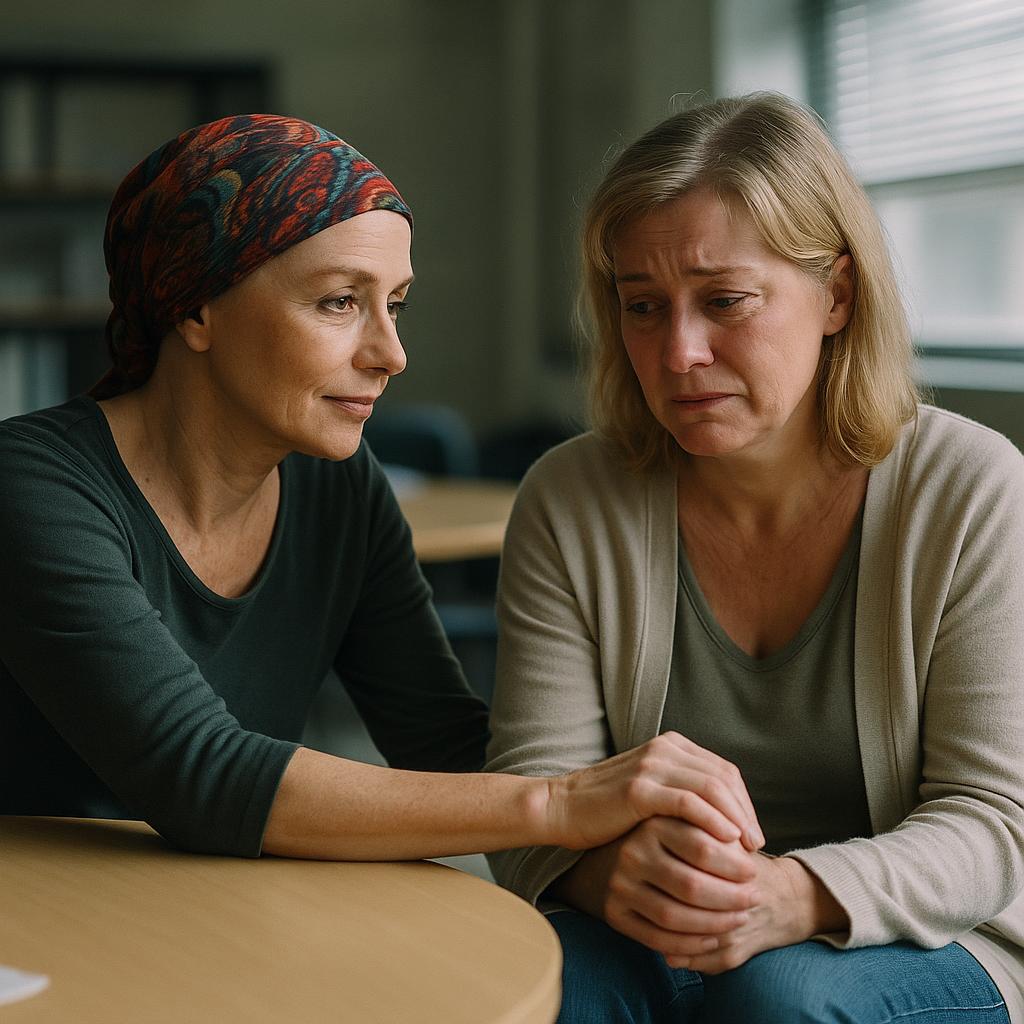 Image by RM AI
Image by RM AI
Hair Loss
I woke up one morning to find my pillow covered in dark strands of hair—not just a few, but actual clumps that had fallen out overnight. I'd been warned this would happen, but seeing it was another thing entirely. I sat there, touching my thinning hair, and made a decision. "I want to shave it all off," I announced at breakfast. "Before it falls out in patches." Mark's eyes welled up, but he nodded. "Whatever you need, babe." That evening, we turned it into a family ritual. Mark set up a chair in the bathroom, Emma brought her salon cape from her cosplay collection, and Jason—my sweet, quiet son—created a playlist of my favorite songs. "Mom goes first," Emma said, handing the clippers to Mark. His hands trembled slightly as he made the first pass, revealing pale skin beneath. Then Emma took a turn, and even Jason, carefully guiding the buzzer across the back of my head. When it was done, I stared at my reflection—bald, vulnerable, but somehow stronger. The next day, Patricia stopped by unannounced and physically recoiled when she saw me. "Oh my God, Lorraine! Why would you do that?" Before I could answer, she was already ordering a "hair regrowth oil" on her phone. "This is completely unnecessary, you know. The baldness is optional if you'd just try my remedies." Mark's jaw clenched, but I just smiled tightly. What Patricia didn't understand was that taking control of my hair loss wasn't surrender—it was reclaiming power over the one thing cancer couldn't take from me: my choice.
 Image by RM AI
Image by RM AI
The First Confrontation
The doorbell rang just as I was swallowing my morning anti-nausea pill. There stood Patricia, struggling under the weight of what looked like half a farmer's market and a gleaming juicer box. 'I've got everything we need to start your healing regimen!' she announced, bustling past me into the kitchen. Mark appeared from his home office, his expression darkening when he spotted the mountain of kale and beets piling up on our counter. 'Mom, what is all this?' he asked, his voice strained with forced patience. Patricia beamed, already plugging in the juicer. 'Cancer-fighting juice! Three times daily will flood Lorraine's body with the nutrients she needs to combat those chemicals they're pumping into her.' Mark's face flushed red. 'Mom, Lorraine needs to follow her doctor's nutrition plan. Some foods can actually interfere with her treatment.' Patricia dismissed him with a wave, not even looking up as she began washing carrots. 'Doctors know nothing about nutrition, dear.' Something in Mark finally snapped. 'ENOUGH!' he shouted, making us both jump. 'This has to stop!' What followed was twenty minutes of escalating voices until Patricia, tears streaming down her face, grabbed Mark's arm. 'How can you just stand by and let them kill your wife?' she sobbed. The room went silent. In that moment, looking at her desperate, tear-stained face, I realized with bone-chilling clarity just how deep Patricia's delusions ran—and how dangerous they might become.
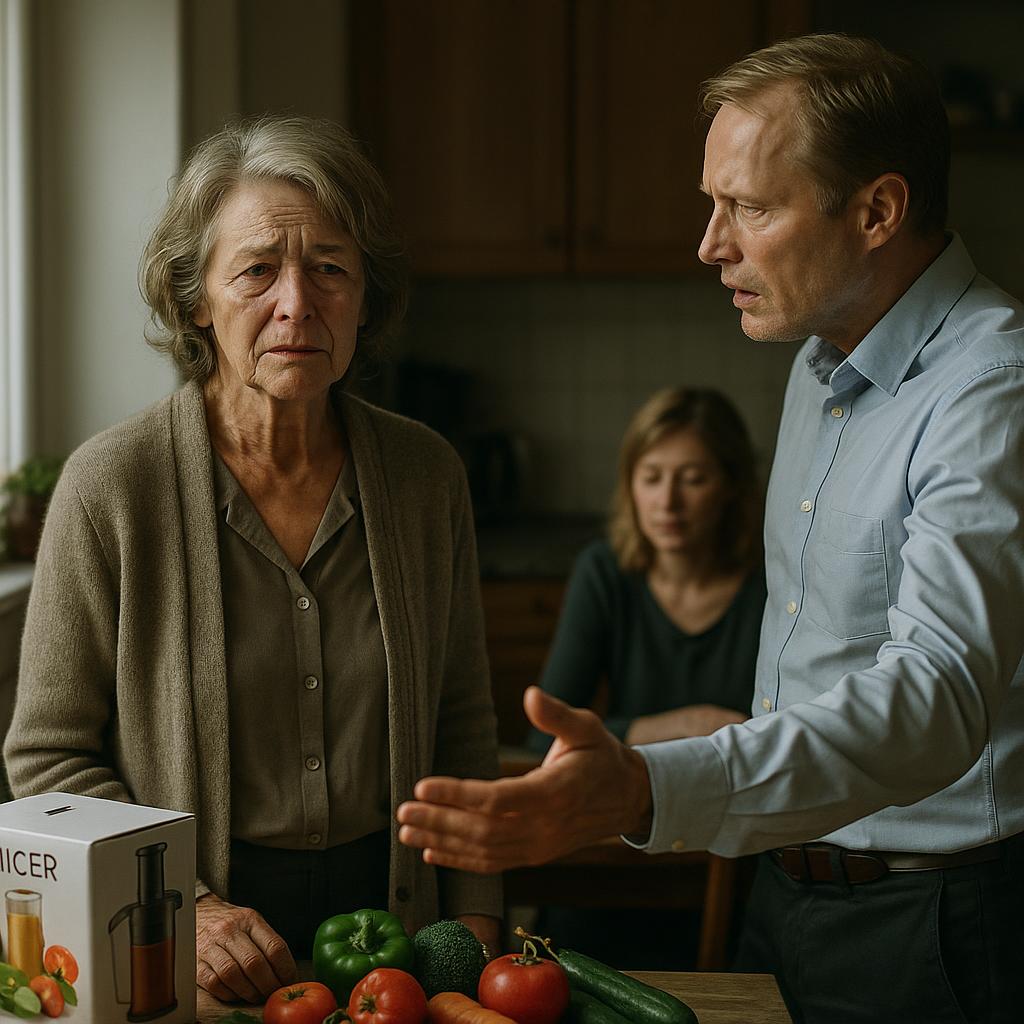 Image by RM AI
Image by RM AI
The Medication Routine
My kitchen counter became command central for my cancer battle, with a rainbow-colored pill organizer as my most important weapon. Every Sunday night, I'd sit at the table with my pharmacy's worth of medications spread out before me, sorting them into their little compartments with the precision of a bomb technician. 'This blue one is for nausea, these white ones boost my white blood cells, and the round ones manage pain,' I explained to Emma one afternoon as she watched me. Patricia appeared in the doorway just as I was finishing, her eyes narrowing at my methodical routine. 'My goodness, Lorraine, that's a lot of chemicals,' she said, picking up one of the prescription bottles. 'Have you researched the long-term effects of these?' I took a deep breath, counting to ten in my head. 'They're keeping me alive, Patricia,' I replied, trying to keep my voice steady. She set the bottle down with a little too much force. 'They're creating dependency, is what they're doing,' she muttered, running her finger along the row of filled compartments. 'Your liver must be screaming for mercy.' Mark shot her a warning look from across the room, but she pretended not to notice. What I didn't realize then was how closely Patricia was studying my medication routine—or that she was already formulating a plan to 'save' me from it.
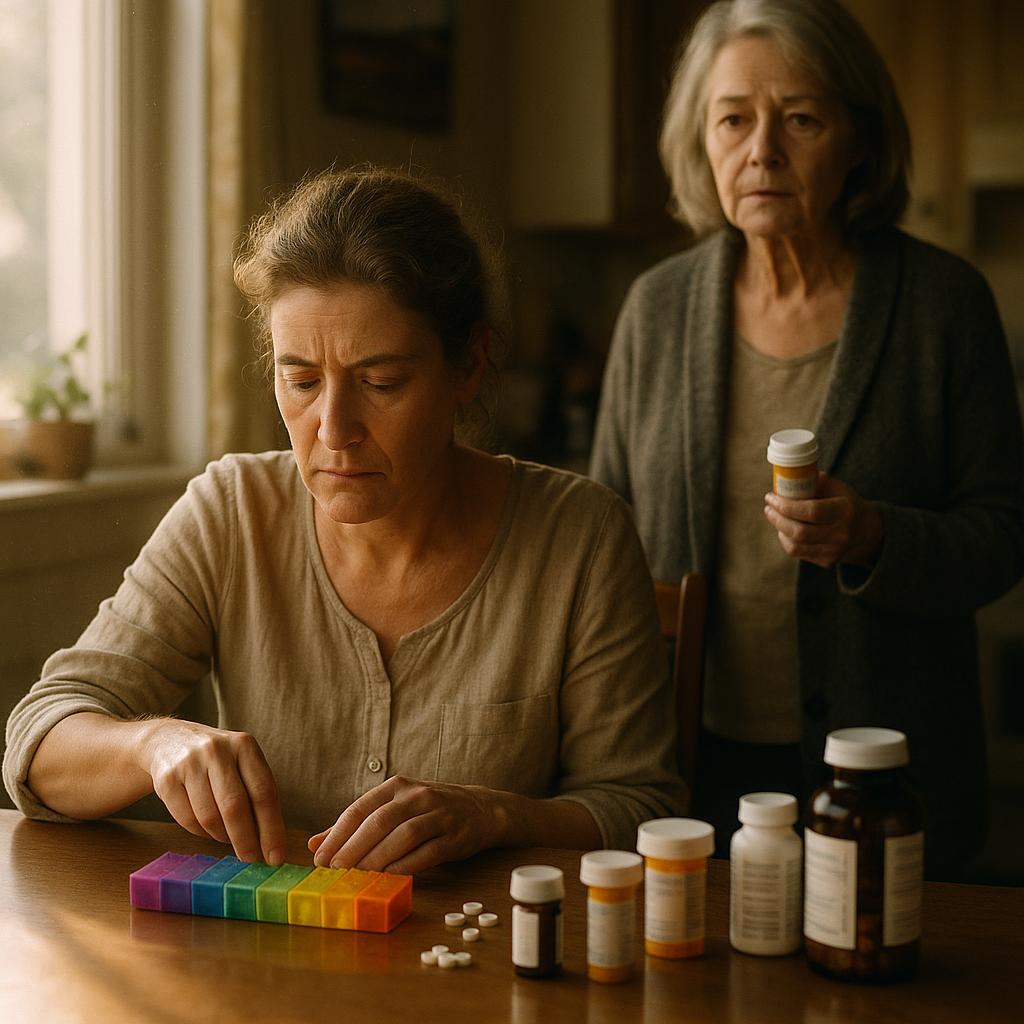 Image by RM AI
Image by RM AI
The Wellness Convention
The brochures started appearing everywhere—tucked under my coffee mug, slipped between the pages of my novel, even taped to the bathroom mirror. 'NATURAL HEALING CONVENTION: Where Modern Medicine Meets Ancient Wisdom!' they proclaimed in garish neon letters. Patricia's not-so-subtle campaign continued for weeks until, in a moment of chemo-induced exhaustion, I finally agreed to attend one session just to get her off my back. The convention center looked like Woodstock for the wellness-obsessed—crystal sellers, essential oil diffusers creating a fog of lavender and patchouli, and earnest people in hemp clothing clutching $15 green juices. 'Isn't this wonderful?' Patricia beamed, guiding me through the crowd. My stomach dropped when I spotted a large poster near the main stage—MY face was on it, alongside the words 'Cancer Journey: A Natural Intervention Case Study.' I grabbed Patricia's arm. 'What is this?' I hissed. She had the audacity to look proud. 'Dr. Greenfield is presenting your case! I've been consulting with him about your treatment.' Blood rushed to my ears as I realized what was happening—Patricia had been sharing my private medical information with some stranger with a dubious doctorate, and now a room full of people were about to hear about my 'toxic medical choices' without my consent. What happened next would forever change my relationship with my mother-in-law.
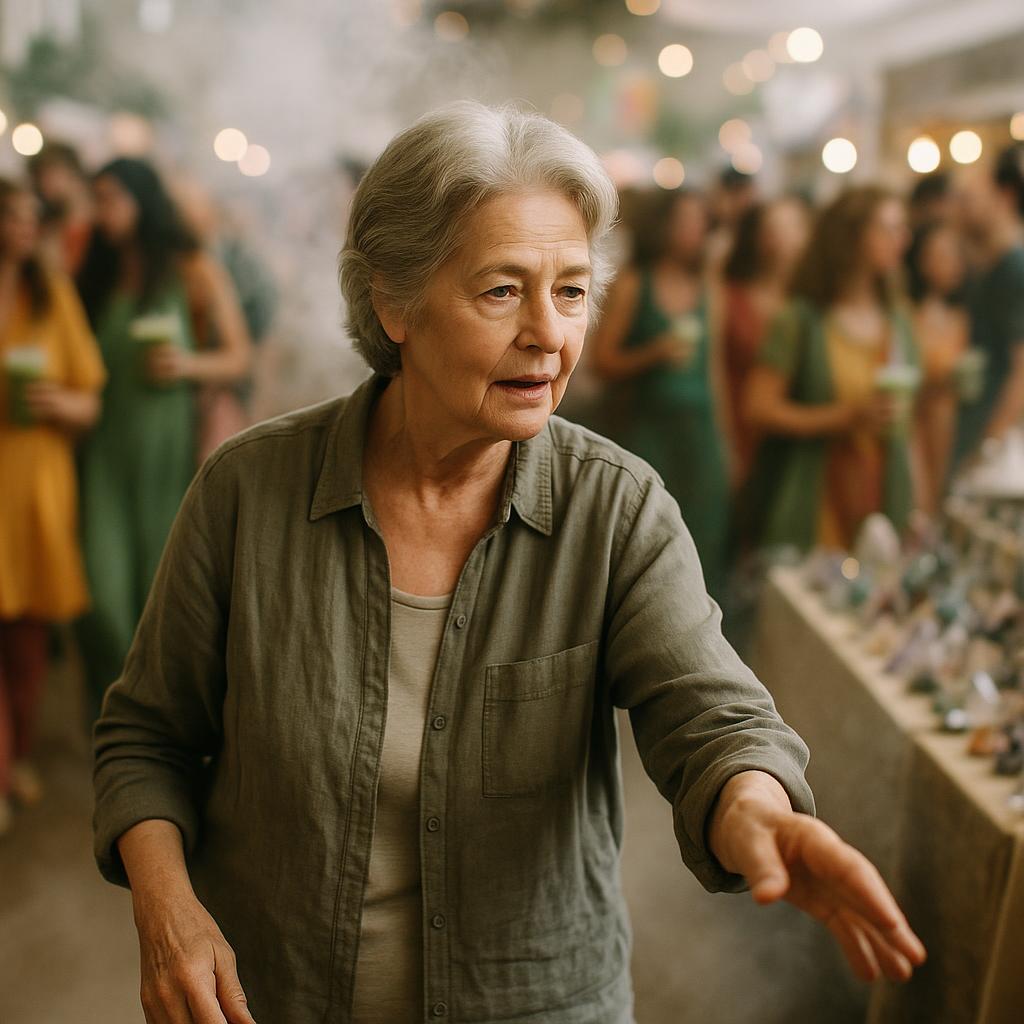 Image by RM AI
Image by RM AI
The Midpoint Scan
The day of my midpoint scan, I gripped Mark's hand so tightly I probably cut off his circulation. 'Whatever we see today, we face it together,' he whispered as we waited. When Dr. Sharma pulled up the images, his usually stoic face broke into a cautious smile. 'The tumor has reduced by almost 40%, Mrs. Wilson, and there's no evidence of spread.' I burst into tears—not the quiet, dignified kind, but full-on ugly crying that had the nurse rushing for tissues. That night, we celebrated with Thai takeout and a Marvel movie marathon with the kids, this small victory feeling monumental after months of suffering. Of course, Patricia called seven times until Mark finally answered. 'It's working!' he told her excitedly. Her response? 'Well of course it is—those supplements I've been bringing are finally counteracting the poison they're giving her.' Mark put the phone on speaker just as she declared, 'She needs to stop the chemotherapy now, while she's ahead!' The kids exchanged worried glances as Mark's face hardened. 'Mom, that's not how this works,' he said firmly before hanging up. Later that night, as I organized my pills for the next day, I noticed something odd—the seal on my anti-nausea medication looked... tampered with. A chill ran down my spine as I wondered just how far Patricia might go to 'save' me from my life-saving treatment.
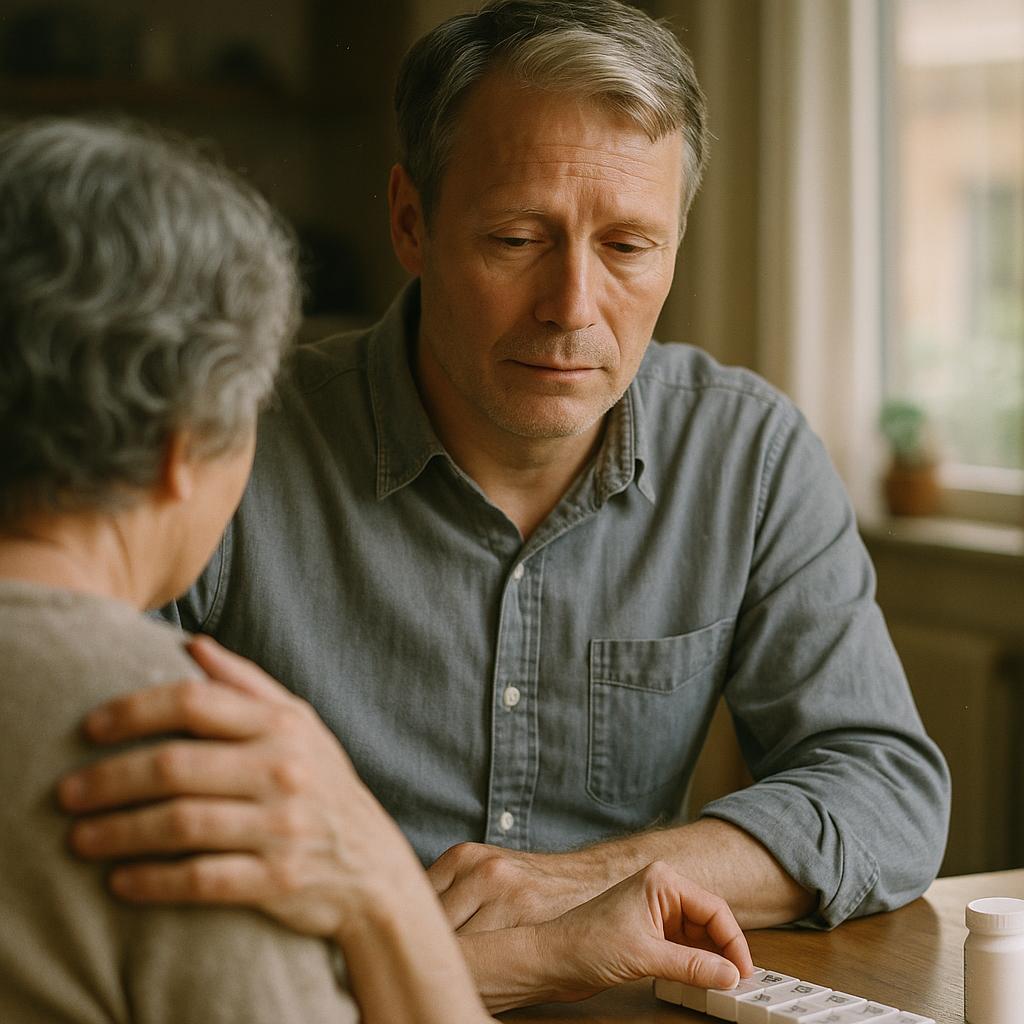 Image by RM AI
Image by RM AI
The Email Campaign
The morning after my scan results, I woke up to find seventeen—yes, SEVENTEEN—new emails in my inbox, all forwarded from Patricia with subject lines that made my blood pressure spike: 'ONCOLOGISTS: THE LEGAL DRUG DEALERS' and 'CHEMOTHERAPY KILLS MORE THAN CANCER!' I created a filter to send them straight to trash, hoping that would be the end of it. But Patricia was nothing if not persistent. By the weekend, she'd started copying Mark on these emails, then Emma, and finally even my quiet, anxiety-prone Jason. 'Mom, why is Grandma sending me links about cancer conspiracies?' my son asked, his voice small and confused. That was my breaking point. Mark called her that evening, his voice tight with controlled anger as he paced our kitchen. 'Mom, you need to stop this. Now.' I could hear her shrill response through the phone: 'If you really loved her, you'd be researching alternatives too!' Mark's face crumpled as she accused him of 'standing by while the medical industry poisons your wife.' When he hung up, he looked utterly defeated. 'She honestly believes she's trying to save your life,' he whispered. What terrified me wasn't just Patricia's delusions—it was the desperate conviction behind them that seemed to be growing stronger by the day.
 Image by RM AI
Image by RM AI
The Mysterious Packages
The first package arrived on a Tuesday—a small brown box with no return address, just my name scrawled in familiar handwriting. Inside, nestled in crumpled newspaper, were three amber bottles with handwritten labels: 'Cancer Killer,' 'Cellular Regenerator,' and 'Immune Booster.' A note, written on floral stationery I recognized immediately, read: 'Take these instead of the poison. They're saving lives the doctors don't want you to know about.' I showed Mark, who called his mother immediately. 'I don't know what you're talking about,' Patricia lied, her voice sickly sweet through the speakerphone. By the end of the week, two more packages had appeared. The notes grew increasingly frantic: 'You're RUNNING OUT OF TIME, Lorraine!' and 'The medical industry is COUNTING on your compliance!' I started checking our doorstep obsessively, bringing the packages inside before the kids could see them. The contents became more concerning—homemade capsules filled with God-knows-what, powders that smelled like dirt, and once, a syringe filled with murky liquid labeled 'IV Alternative.' Mark installed a doorbell camera, hoping to catch her in the act, but Patricia was clever. The packages kept coming, always when we weren't watching. What terrified me most wasn't just the mysterious substances—it was the escalating desperation in those notes, the sense that Patricia was spiraling into something dangerous, something that made me check the locks twice each night.
The Second Round Begins
The second round of chemo hit me like a tsunami compared to the first wave. I spent days curled up in bed, my body feeling like it was waging war against itself. Mark, bless him, took family leave to become my full-time caregiver, creating a detailed schedule with Emma to ensure someone was always by my side. "We've got this covered, Mom," Emma assured me, her confidence masking the worry in her eyes. When Mark desperately needed to run errands and catch up on bills, Patricia saw her opening. "I can take a shift," she insisted, her voice dripping with false sweetness. Mark hesitated, his eyes meeting mine in silent communication. We both knew it was a bad idea, but exhaustion won out. "Just three hours," he finally conceded. As I drifted in and out of consciousness, Patricia sat beside my bed, her presence more exhausting than comforting. In my half-awake state, I heard her whisper, thinking I couldn't hear: "Don't worry, Lorraine. I won't let them kill you with this poison." Her words sent ice through my veins, but I was too weak to respond. I kept my eyes closed, pretending to sleep, wondering what she might do if left alone with me and my medications for too long.
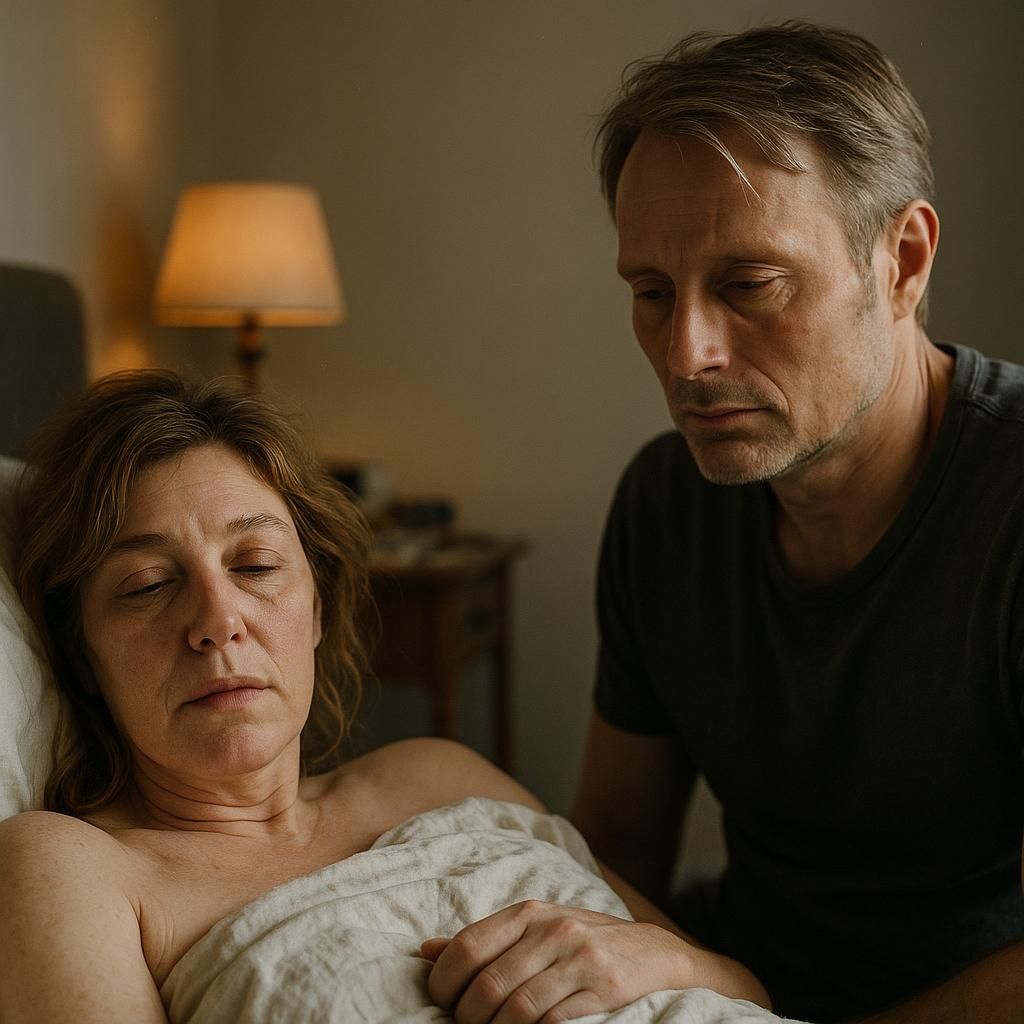 Image by RM AI
Image by RM AI
The Soup Delivery
The doorbell rang just as I was trying to keep down a few sips of water. Patricia stood there with a massive pot of what she called her 'healing soup'—a murky concoction that smelled like a health food store had exploded. 'This will cleanse your blood and strengthen your immune system,' she announced, pushing past me into the kitchen. 'You need to eat it while it's hot. The medicinal properties diminish with temperature.' Despite my complete lack of appetite, she was already ladling it into a bowl. Mark appeared from his office, giving me a sympathetic glance. 'Thanks, Mom, but Lorraine's not feeling up to eating right now. We'll put it in the fridge for later.' Patricia's smile vanished. 'It won't WORK later,' she snapped, her voice rising. 'The energy needs to be fresh!' While they argued, I retreated to the living room. Later, I came back for my evening meds and found Patricia by my pill organizer, supposedly getting water. Something about the way she jumped when I entered, the guilty flicker in her eyes, sent alarm bells ringing through my foggy brain. Her hands moved too quickly, sliding something into her pocket. 'Just getting some water,' she said with a smile that didn't reach her eyes. That night, I couldn't shake the feeling that something was very, very wrong.
 Image by RM AI
Image by RM AI
Something Feels Wrong
I woke up the morning after taking my meds feeling like something was seriously off. Not the usual chemo side effects I'd grown accustomed to—this was different, alarming. My skin felt hot to the touch, like I was running a fever, and my heart was racing so fast I could feel it pounding in my ears. "Mark," I called weakly from the bedroom, "something's wrong." He took one look at me and immediately called Dr. Sharma, who suggested it might be an interaction with something I ate. But that didn't make sense—I'd been following the dietary guidelines religiously, tracking every bite that went into my mouth. By afternoon, instead of improving, the symptoms were getting worse. My hands started trembling, and waves of dizziness washed over me whenever I tried to stand. "This isn't normal," I whispered to Mark as he helped me back to bed after a particularly scary moment where my legs nearly gave out. That night, as I lay awake, my mind kept circling back to Patricia standing by my pill organizer, that guilty look in her eyes, her hands quickly pocketing something. A terrible suspicion began forming in my mind—one so disturbing I could barely allow myself to think it.
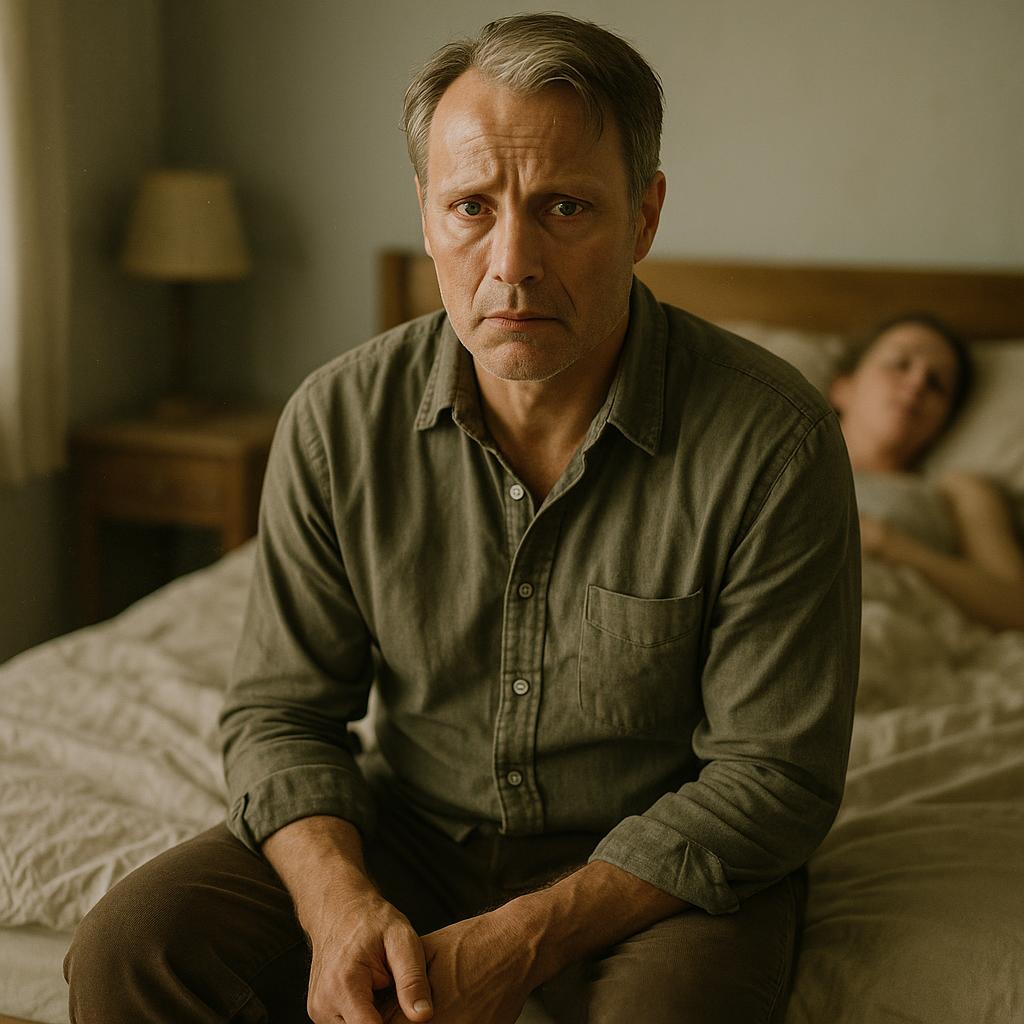 Image by RM AI
Image by RM AI
The Second Day of Symptoms
The second day was worse—much worse. I woke up with my heart hammering so hard I thought it might burst through my chest. The room spun violently when I tried to sit up, and an angry red rash had bloomed across my collarbone overnight like some twisted garden. "Mark," I croaked, my voice barely audible. He was beside me instantly, his face etched with worry lines I'd never seen before. "That's it, we're going to the ER," he insisted, already reaching for his phone. I grabbed his wrist, surprising myself with how weak my grip had become. "No... not unless we have to," I whispered. "I can't face another hospital right now." As Mark reluctantly agreed to wait a few more hours, a memory surfaced through my fog—Patricia standing by my pill organizer, that guilty jump when I entered the kitchen, her hands quickly pocketing something. The thought I'd been avoiding crystallized with terrifying clarity. With trembling hands, I reached for my medication box on the nightstand. "Mark," I said, my mouth suddenly dry, "I need you to look at these pills. Something's not right." As he brought the organizer closer, I noticed his hands were shaking too—as if some part of him already knew what we were about to discover.
 Image by RM AI
Image by RM AI
Checking the Pills
I stared at my pill organizer, a sick feeling washing over me that had nothing to do with cancer or chemo. "Mark," I called, my voice barely above a whisper. "I need you to look at something." He hurried in, concern etched across his exhausted face. With trembling fingers, I pointed to the compartments. "These aren't right." I dumped the pills onto our bedspread and grabbed my prescription bottles from the nightstand drawer. One by one, we compared them—the pharmacy pills versus what was in my organizer. "This one's different," Mark said, holding up what should have been my anti-nausea medication. The shape was similar, but the texture was rougher, the color slightly off. We found three more substitutes—homemade counterfeits carefully disguised to look like my prescriptions. My heart pounded as the horrifying truth sank in. "Your mother," I whispered, meeting Mark's eyes. His face drained of color. "She's been replacing my medication with her herbal remedies." The realization hit us both like a physical blow. This wasn't just misguided advice anymore—Patricia had crossed into something criminal, something that could kill me. And the worst part? I'd been swallowing whatever she gave me, trusting that the pills in my organizer were the ones keeping me alive.
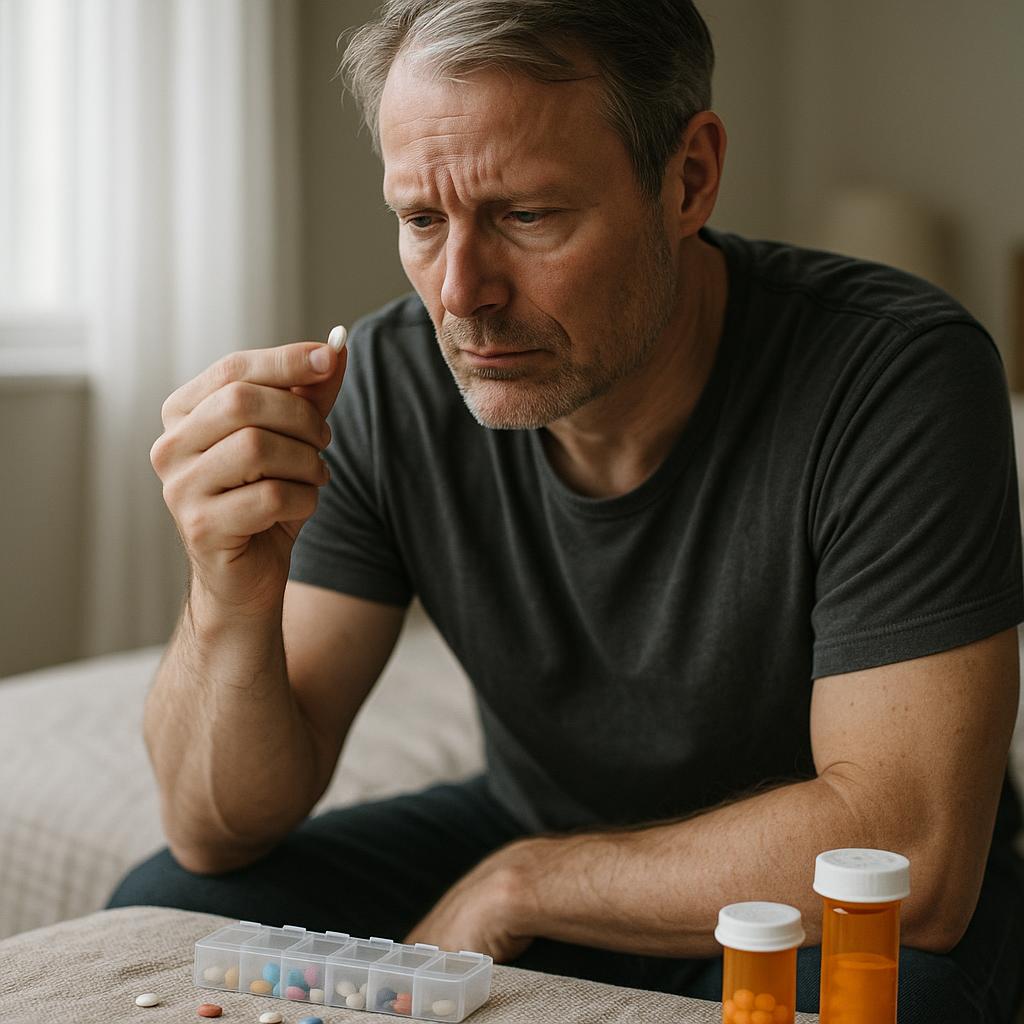 Image by RM AI
Image by RM AI
The Horrifying Realization
I felt like I was in some twisted episode of a crime show as Mark and I methodically laid out the pills across our kitchen table. The bright overhead light made the evidence impossible to deny. 'Look at this one,' I whispered, pointing to what should have been my anti-nausea medication. 'The real one has a tiny 'M' imprinted on it. This one's completely smooth.' Mark picked up another pill, rolling it between his fingers. 'This isn't even professionally manufactured,' he said, his voice tight with barely controlled rage. 'It's crumbling at the edges.' We worked in silence, creating two piles—my actual prescriptions versus the counterfeits. By the time we finished, my hands were shaking, and not from my illness. Five of my critical medications had been replaced with what looked like homemade herbal capsules. 'She could have killed me,' I said, the words hanging in the air between us. Mark's face darkened in a way I'd never seen before. He pulled out his phone and started taking pictures of everything. 'I'm calling the doctor right now,' he said, 'and then I'm dealing with my mother.' The cold determination in his voice sent chills down my spine—but nothing compared to the horror of realizing the person who claimed to love me most had been secretly poisoning me all along.
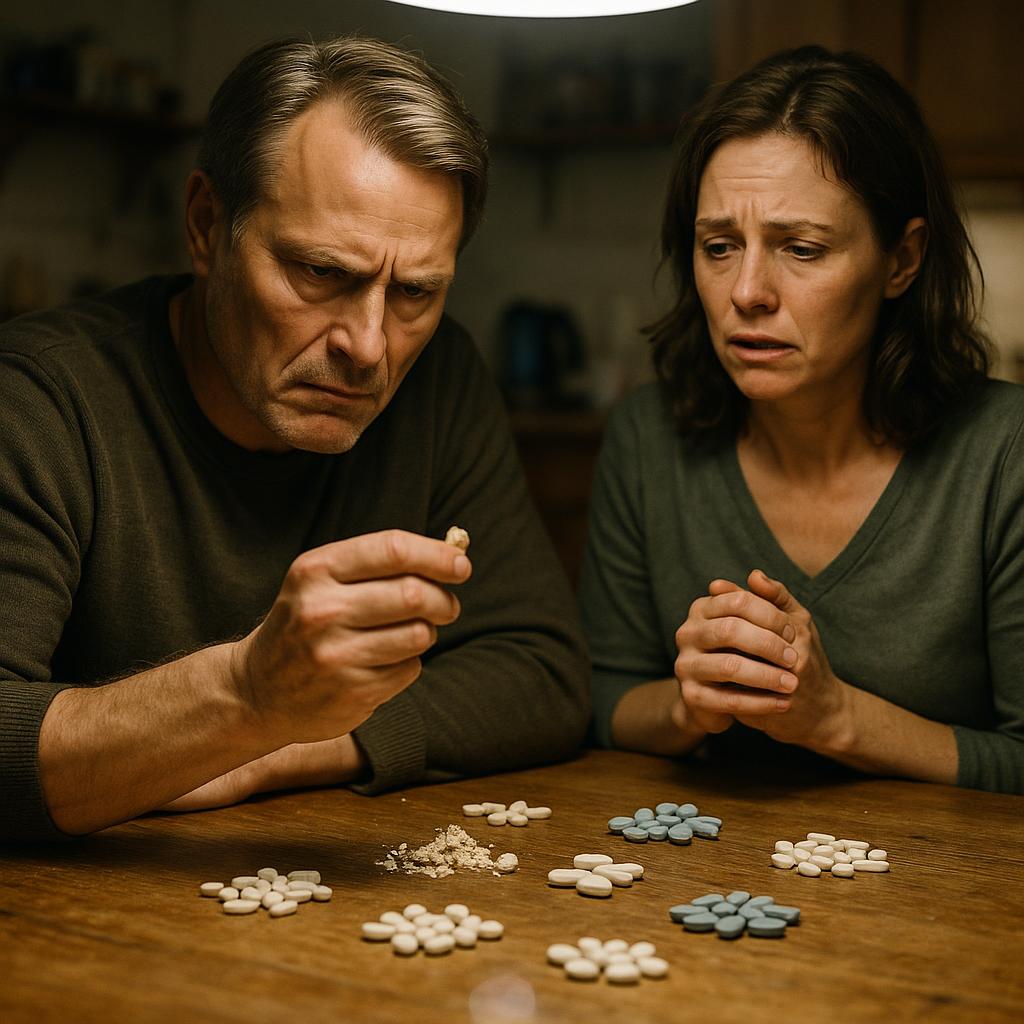 Image by RM AI
Image by RM AI
The Emergency Call
My hands wouldn't stop shaking as Mark punched Dr. Sharma's emergency number into his phone. 'My wife's medication has been tampered with,' he explained, his voice cracking with barely controlled fury. 'Someone replaced her cancer meds with homemade herbal pills.' I sat on the couch, hugging myself, feeling violated in a way I couldn't articulate. Dr. Sharma's voice came through on speaker, urgent and clear: 'Bring everything to the ER immediately—both the originals and the substitutes. Don't touch them with bare hands if possible.' As Mark gathered the pills into separate Ziploc bags, I glanced out our front window and felt my heart nearly stop. 'Mark,' I whispered, my voice thin with panic. 'She's here.' Patricia's silver Camry was turning onto our street, moving slowly like a predator stalking its prey. Mark's face hardened as he helped me to my feet. 'We're going out the back door,' he said, grabbing my jacket and the bags of evidence. 'Text Emma to meet us at the hospital.' As we slipped through our backyard gate, I heard the distinctive sound of Patricia's car door slamming shut in our driveway. What terrified me most wasn't just escaping her now—it was realizing that the woman I'd trusted in my home for years was capable of something so calculated and dangerous.
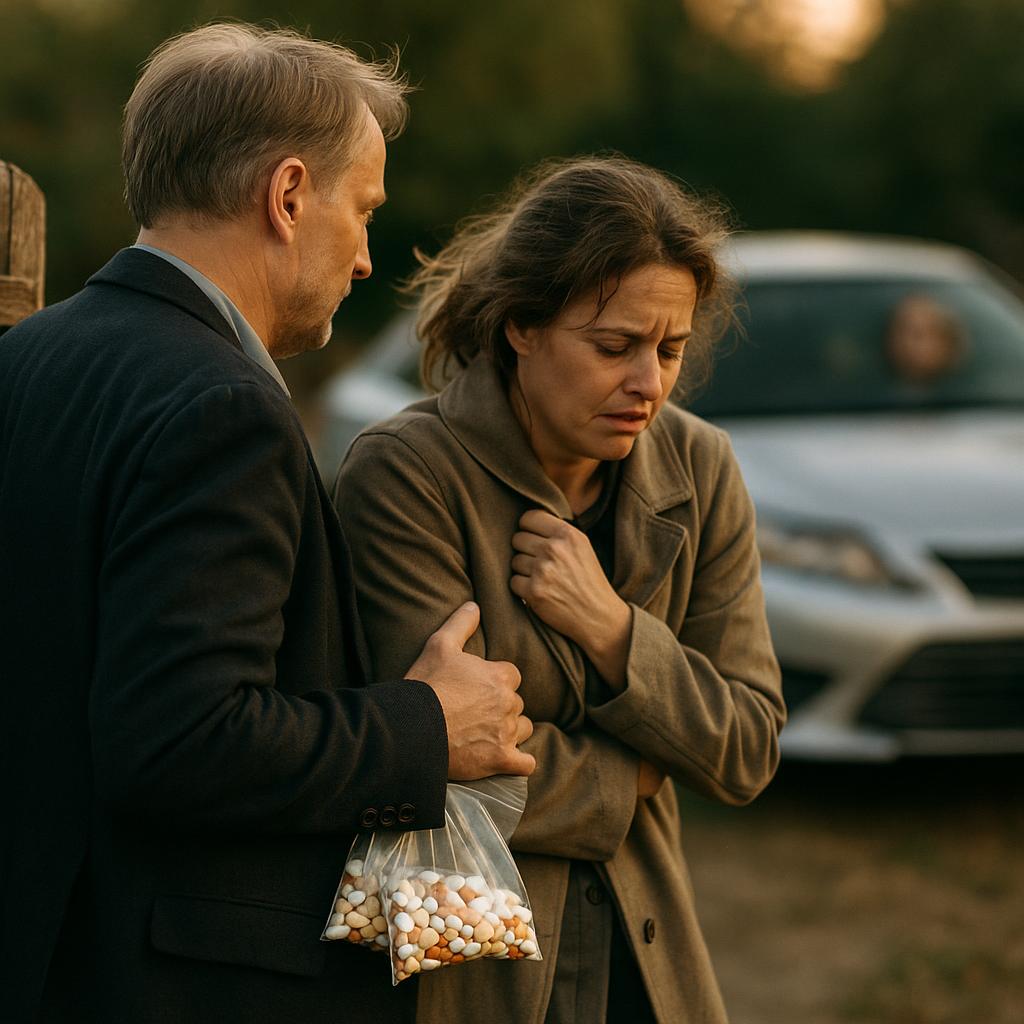 Image by RM AI
Image by RM AI
The Hospital Analysis
The ER waiting room felt like a crime scene as we handed over the Ziploc bags to Dr. Sharma. 'We'll have these analyzed immediately,' he promised, his face grim. I sat trembling as nurses drew vials of blood, checking for any damage Patricia's 'natural remedies' might have caused. Two hours later, a hospital pharmacist with kind eyes and a serious expression confirmed our worst fears. 'These aren't medications,' she explained, pointing to images on her tablet. 'They're compressed herbal supplements—mostly turmeric, echinacea, and something that appears to be ground dandelion root.' Dr. Sharma placed his hand on mine, his voice gentle but direct. 'Lorraine, interrupting your prescribed treatment regimen, even for a few days, could have catastrophic consequences for your cancer battle. The tumor could rebound aggressively.' I nodded, unable to speak past the lump in my throat. The violation I felt went beyond physical—Patricia had weaponized my trust, used my vulnerability against me. 'We're documenting everything,' Dr. Sharma continued, 'and I strongly recommend filing a police report.' Mark squeezed my shoulder, his face set with determination. 'We will,' he promised. What neither of us expected was the hospital security alert that suddenly blared through the speakers, or the commotion we heard coming from the ER entrance where Patricia's voice rose above the chaos: 'WHERE IS SHE? YOU'RE KILLING HER!'
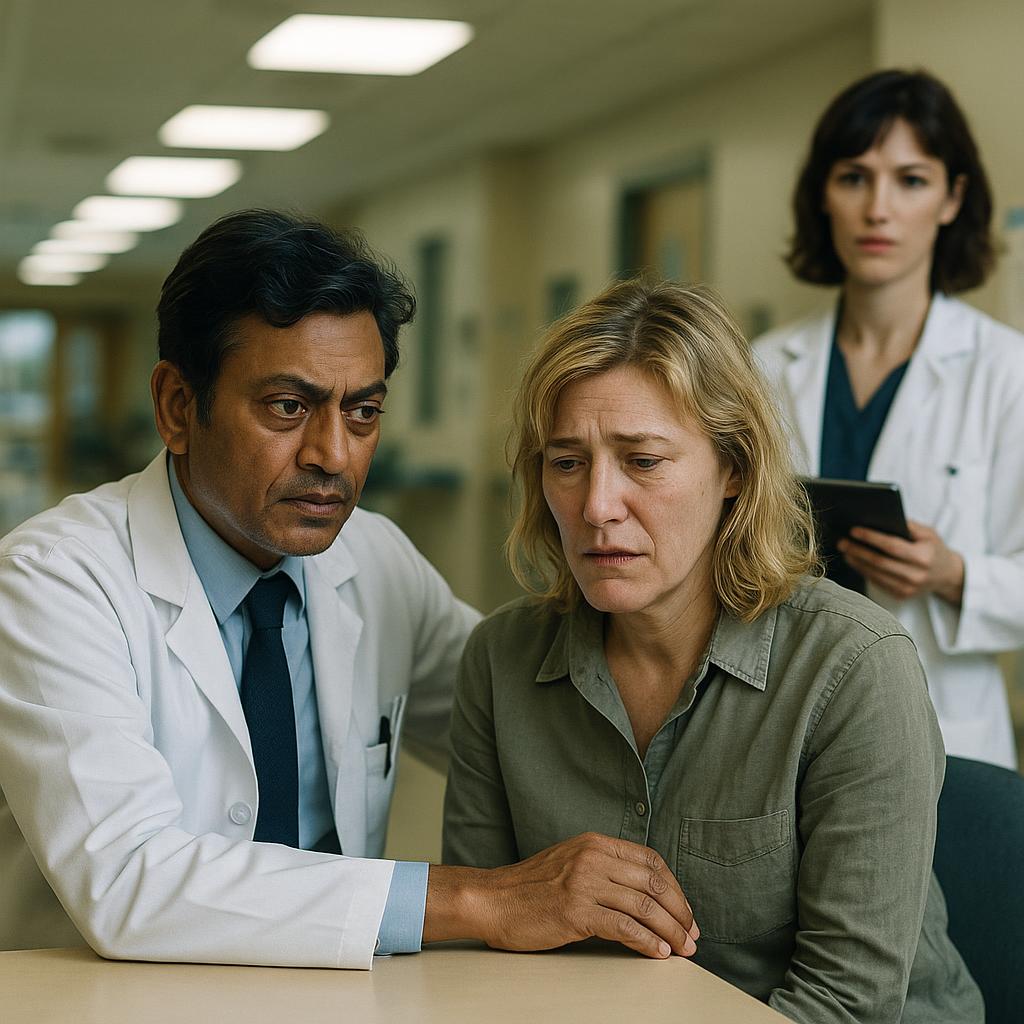 Image by RM AI
Image by RM AI
The Decision to Confront
The hospital room felt like a pressure cooker as Mark paced back and forth, his footsteps creating a rhythm that matched my racing heart. I'd never seen him like this—his face flushed with a mixture of rage and heartbreak, hands clenching and unclenching as if he couldn't decide whether to punch a wall or break down crying. 'My own mother,' he kept saying, his voice cracking. 'My own mother tried to kill you.' I reached for his hand when he passed by my bed for the twentieth time. 'She doesn't think she was trying to kill me,' I whispered. 'That's what makes this so terrifying. She genuinely believes she was saving me.' We debated for hours about what to do next. The police wanted statements. The hospital had already filed reports. But this wasn't just a legal matter—this was family. 'I need to confront her,' Mark finally said, his voice steadier than it had been all day. 'Alone.' I nodded, knowing my weakened state couldn't handle such a confrontation. As he kissed my forehead before leaving, neither of us could have imagined the shocking chain of events his visit to Patricia's house would set in motion.
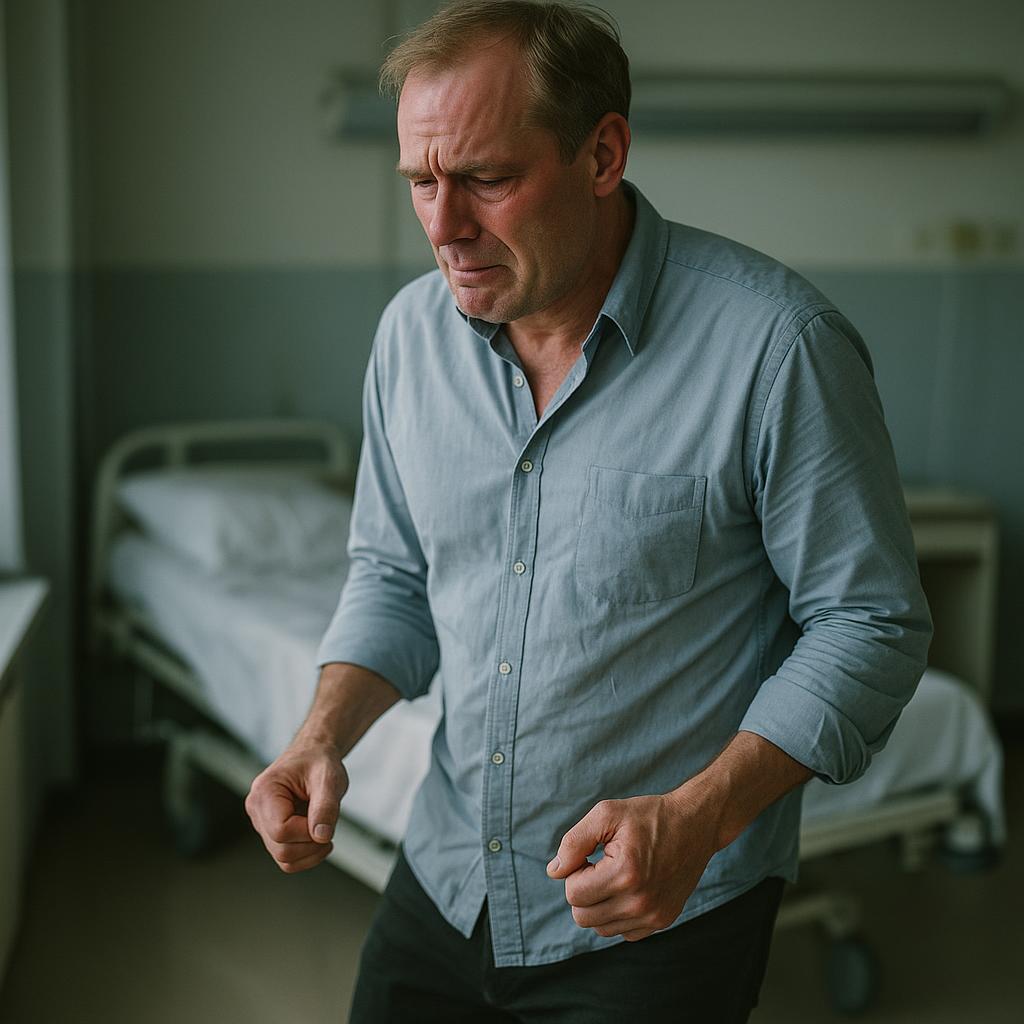 Image by RM AI
Image by RM AI
Mark's Confrontation
The hours crawled by like years as I waited with Emma for Mark to return from Patricia's house. Every time headlights swept across our living room wall, I'd hold my breath, only to deflate when they passed. 'Should we call him?' Emma asked for the third time, her fingers hovering over her phone. I shook my head, though the same worry gnawed at me. When Mark finally walked through the door at 11:42 PM, the look on his face told me everything before he spoke a word. He collapsed into the armchair across from me, his eyes hollow. 'She didn't even deny it, Mom,' he said, his voice barely above a whisper. 'She sat there at her kitchen table and admitted to switching your medication.' My stomach twisted as he described how Patricia had calmly explained that she was 'saving me from poison' and that the doctors were 'pharmaceutical puppets' keeping me sick for profit. 'When I told her she could have killed you,' Mark continued, running his hands through his hair, 'she actually smiled and said sometimes we have to risk death to find true healing.' The chill that ran through me wasn't from my illness. 'But that's not even the worst part,' Mark said, looking up with eyes that seemed aged a decade in one evening. 'When I told her the hospital reported everything, she just... changed.'
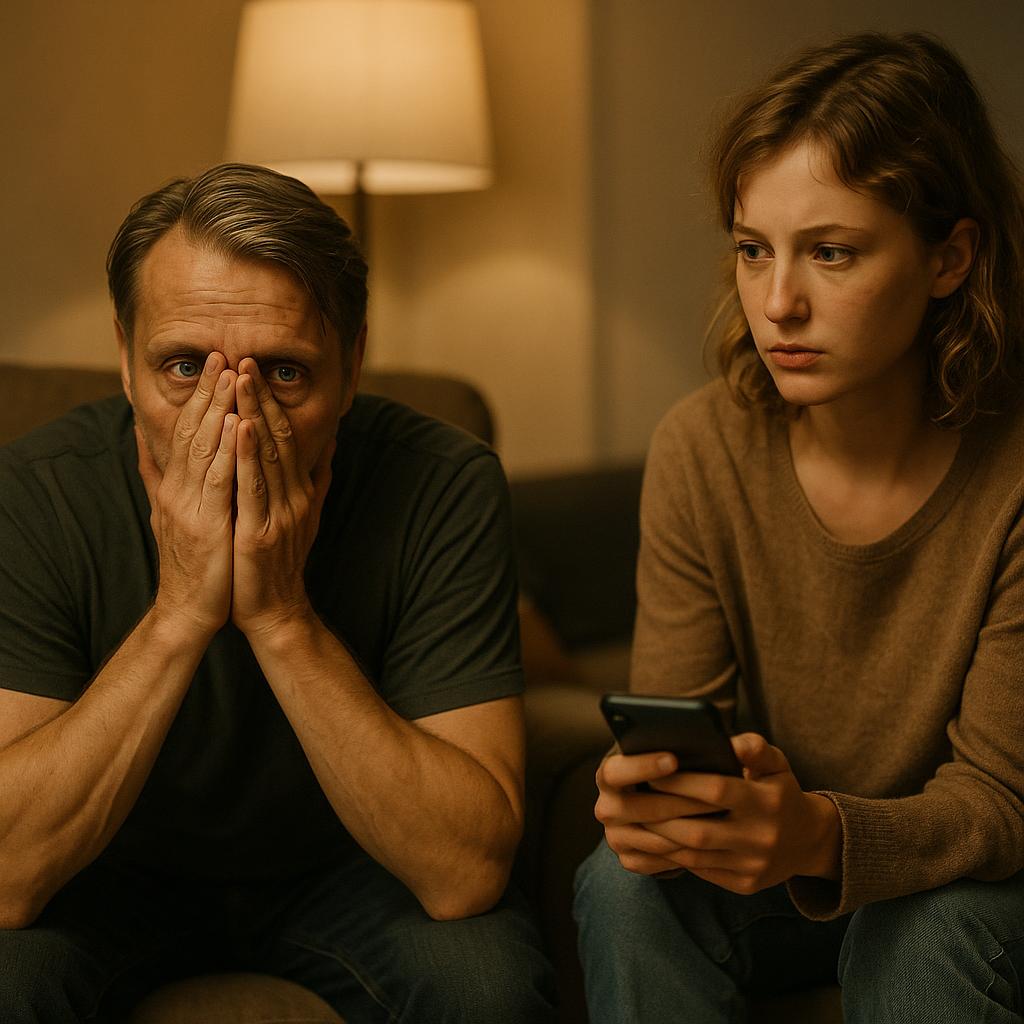 Image by RM AI
Image by RM AI
The Midnight Call
The shrill ring of our phone at 2 AM jolted me from a fitful sleep. Mark fumbled for the receiver, his face instantly hardening when he heard the voice on the other end. He put it on speaker, and Patricia's voice filled our darkened bedroom—frantic, unhinged, and terrifying. "They're coming for me, Mark! The pharmaceutical companies, the government—they're all in on it!" she rambled, her words tumbling over each other. "Mom, you need help," Mark said firmly, his voice steady despite the hour. "What you did to Lorraine could have killed her. Do you understand that?" I watched his knuckles turn white as he gripped the phone. Patricia's laugh sent chills down my spine—a high, brittle sound that bore no resemblance to the woman I'd known for twenty years. "Killed her? I was SAVING her! You're brainwashed, both of you! Part of the system now!" Mark tried reasoning with her, explaining how the hospital had analyzed her homemade pills, but she cut him off with increasingly wild accusations about doctors being paid to poison patients. When Mark mentioned the police report, her voice rose to a shriek: "They'll never find me! I know too much!" The line went dead with a click that seemed to echo in our silent room. Mark and I stared at each other in the darkness, the same unspoken question hanging between us: What would Patricia do next?
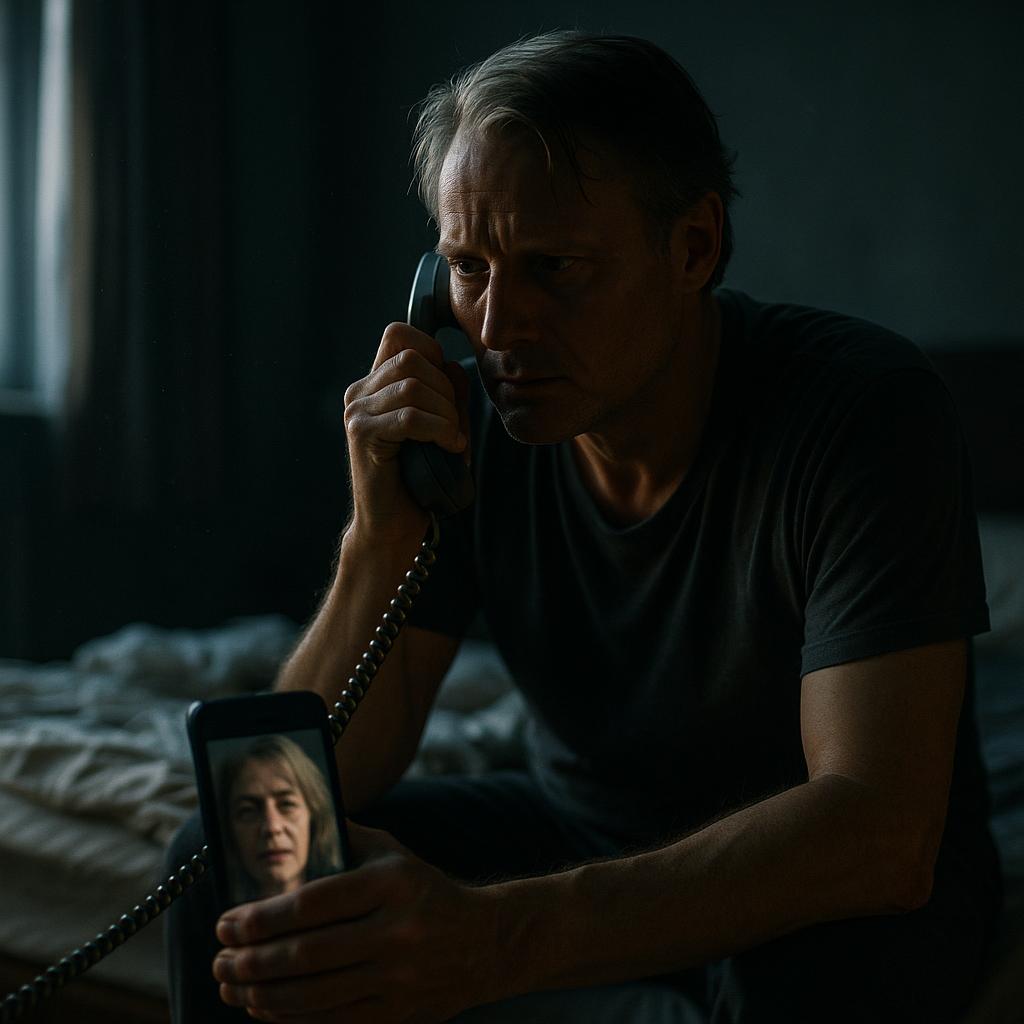 Image by RM AI
Image by RM AI
The Disappearance
The next morning, Mark insisted on checking on his mother. 'I'll be back soon,' he promised, kissing my forehead. When he returned two hours later, the look on his face sent ice through my veins. 'She's gone, Lorraine,' he said, collapsing onto our couch. 'The front door was unlocked, half her clothes missing.' His voice cracked as he handed me a handwritten note: 'I won't let them silence me. When you're ready to hear the truth, you'll find me.' I felt dizzy, and not from my medication. Mark had already called everyone in Patricia's circle—her church friends, her wellness group, even her hairdresser of fifteen years. 'Nobody's admitting anything,' he said, rubbing his temples. 'But someone knows where she went.' The passport missing from her dresser drawer and the empty emergency cash box told us this wasn't a spontaneous decision. She'd been planning this, perhaps from the moment I was diagnosed. As Mark made calls to the police, I couldn't help but wonder: how does a 70-year-old woman with no criminal history just vanish into thin air? And more terrifyingly—what would she do next to 'save' me?
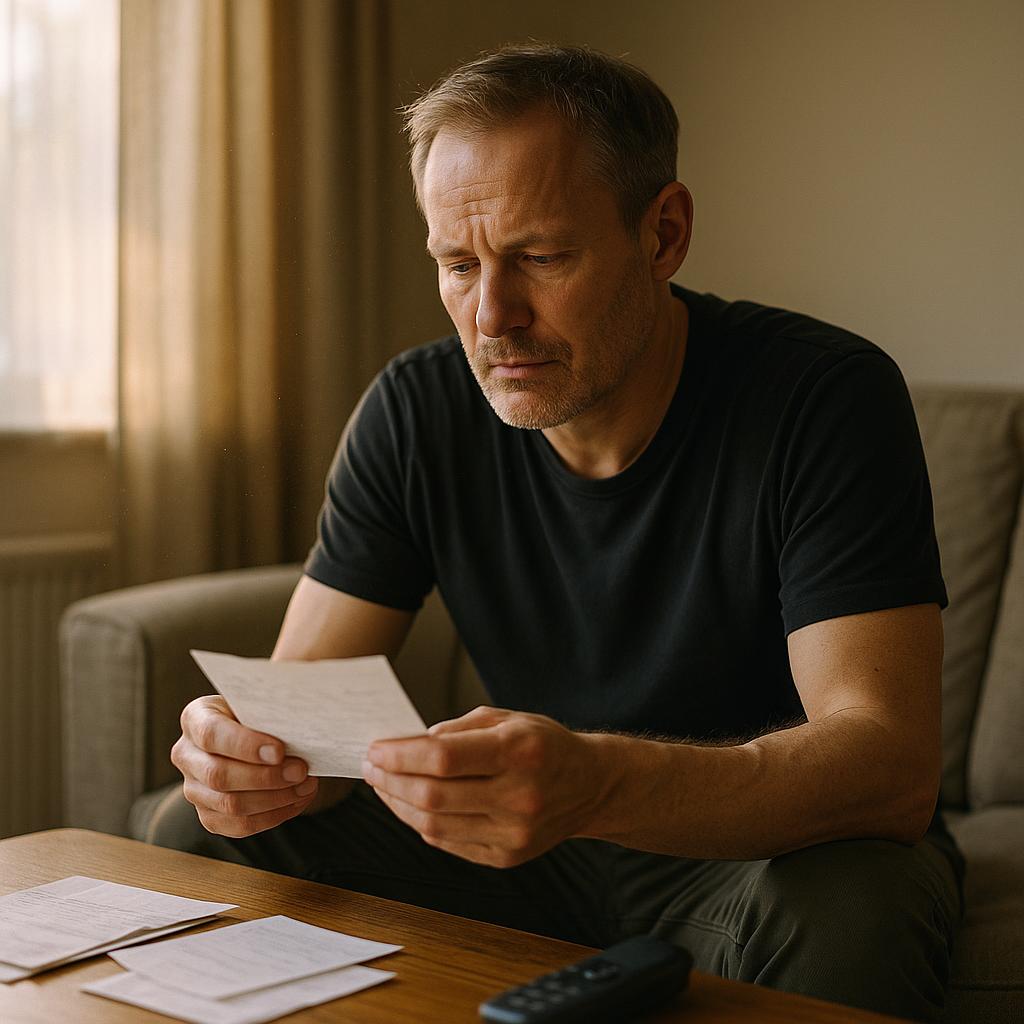 Image by RM AI
Image by RM AI
The Police Report
The doorbell rang at exactly 10:15 AM on Thursday, and my heart nearly stopped. Officer Moreau stood on our porch, her badge glinting in the morning sun, notebook already in hand. "Mrs. Lorraine Wilson?" she asked, her voice professional but kind. I nodded, suddenly feeling like I was in an episode of Law & Order—except this was my actual life. As we sat at our kitchen table, the same one where Mark and I had discovered the tampered pills, Officer Moreau explained in methodical detail how Patricia's actions weren't just misguided or even dangerous—they were criminal. "What your mother-in-law did constitutes assault at minimum," she said, her pen scratching against paper as she took notes. "Depending on what the lab finds in those homemade pills, we could be looking at attempted murder charges." The word 'murder' hung in the air like a toxic cloud. Mark gripped my hand so tightly I could feel his pulse racing through his fingertips. "But she's my mother," he whispered, his voice cracking. "She's seventy years old." Officer Moreau's eyes softened slightly, but her voice remained firm. "Age doesn't exempt anyone from the law, Mr. Wilson. Especially when someone's life was put at risk." As she collected our formal statements, I couldn't help but wonder: how had we gone from family Sunday dinners to police reports and criminal charges in less than a year?
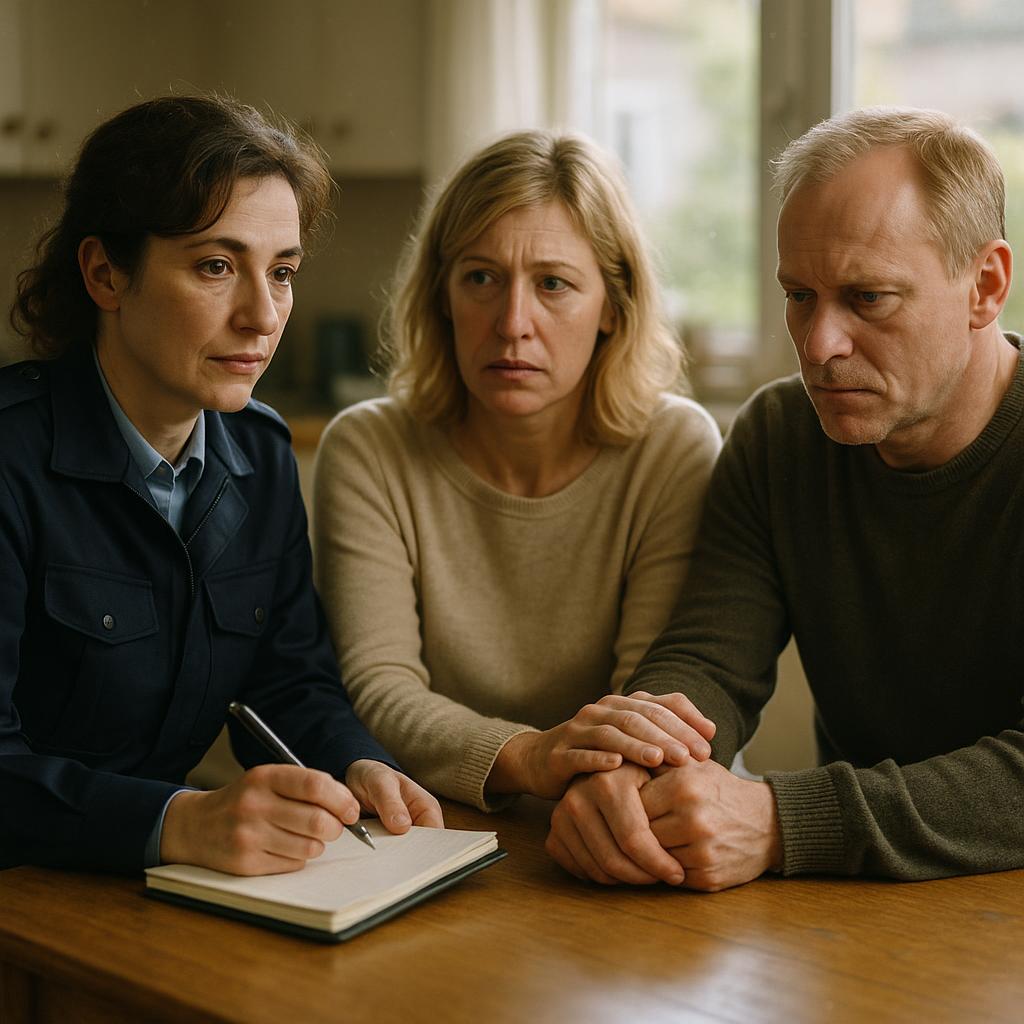 Image by RM AI
Image by RM AI
The Family Meeting
The hardest conversation of my life happened around our kitchen table on a Tuesday evening. Mark and I had called Emma and Jason over, knowing we couldn't keep Patricia's betrayal from them any longer. 'Your grandmother has been replacing my cancer medication with homemade herbal pills,' I said, my voice surprisingly steady despite the tremor in my hands. Jason's face contorted through shock, disbelief, and then pure rage in the span of seconds. 'She tried to KILL you?' he shouted, slamming his fist on the table so hard our water glasses jumped. Before we could answer, he was up and out the door, the slam echoing through our silent house. Emma just sat there, her face drained of color, methodically twisting her wedding ring around her finger—a nervous habit since childhood. 'Is your cancer going to get worse because of this?' she finally asked, always the practical one even in crisis. As Mark explained about the hospital tests and police reports, I watched my daughter's eyes harden with each word. We were all survivors of Patricia's twisted crusade, but the hurricane wasn't over—not with her still out there somewhere, convinced she was our savior rather than our destroyer.
 Image by RM AI
Image by RM AI
The ATM Footage
The call from Officer Moreau came just as I was settling down for my afternoon rest. 'Mrs. Wilson, we have something,' she said, her voice tight with controlled excitement. 'Security cameras captured your mother-in-law at an ATM in Ridgefield yesterday morning, withdrawing nearly $5,000.' Mark put the phone on speaker as we huddled together on the couch. 'There's more,' Officer Moreau continued. 'The footage shows her getting into a silver Toyota Camry. We've identified the driver as Greta Holman.' Mark's face darkened instantly. 'Greta from her wellness group,' he muttered, running his hand through his hair. 'The one who sells those detox kits at the farmer's market.' Officer Moreau explained they'd issued a BOLO for both women and the vehicle. 'Your mother-in-law is now considered a fugitive avoiding questioning in a criminal investigation,' she said, her words landing like stones in my stomach. I couldn't wrap my head around it—Patricia, the woman who baked cookies for church fundraisers and knitted baby blankets for the hospital, was now on the run like some kind of criminal mastermind. The most chilling part wasn't that she'd fled; it was knowing she still believed, with absolute conviction, that she was right and we were wrong. And somewhere out there, she was plotting her next move.
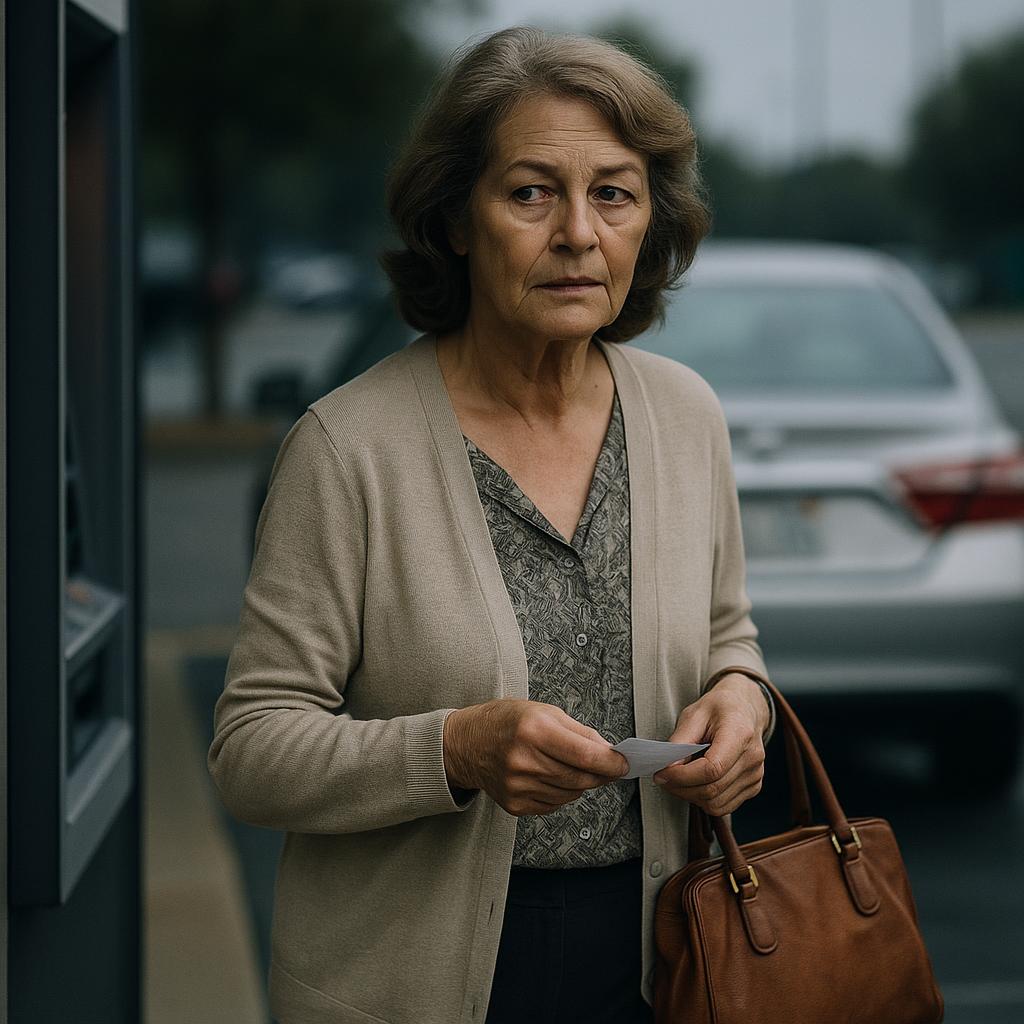 Image by RM AI
Image by RM AI
The Wellness Group Investigation
Officer Moreau called us the next day with news that made my skin crawl. 'We've executed a search warrant at Crystalline Vibrations,' she explained, referring to the new age shop where Patricia's wellness group met weekly. What they found there chilled me to the bone. 'There was a hidden room in the back,' Officer Moreau continued, her voice tense. 'Pill presses, homemade remedies, and—' she paused, '—literature about something called 'medical freedom fighters.' Mark paced our living room, his face ashen. The shop owner, Felix, had apparently cracked under questioning, admitting the group had recently taken a dark turn. 'He said they'd started discussing direct intervention for family members undergoing conventional treatments,' Officer Moreau explained. 'Your mother-in-law wasn't acting alone, Mrs. Wilson. This entire group has been radicalizing each other.' I felt physically ill imagining Patricia sitting in that back room, learning how to make fake pills while plotting to 'save' me from my life-saving treatment. The most terrifying part wasn't just what they'd done—it was what they might still be planning to do. As Officer Moreau showed us photos of the seized materials on her tablet, I couldn't help but wonder: how many other cancer patients out there had 'well-meaning' relatives secretly poisoning them in the name of natural healing?
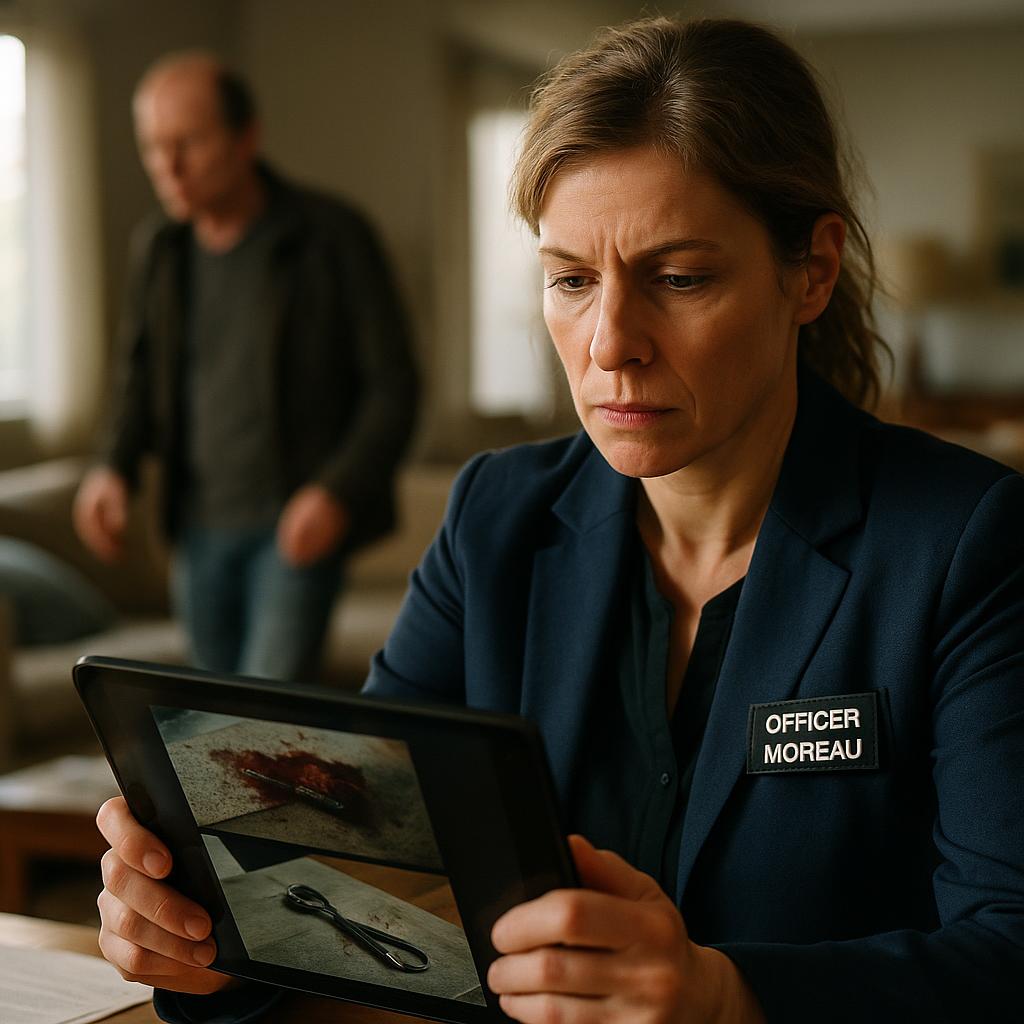 Image by RM AI
Image by RM AI
The Online Network
Officer Moreau called us in for a meeting I'll never forget. 'We've uncovered something disturbing,' she said, sliding her laptop across the table. On screen was a private forum called 'Medical Liberation Front' with thousands of members worldwide. My stomach dropped as she scrolled to Patricia's profile—username 'NaturalHealer70.' 'Your mother-in-law has been posting here for months,' Officer Moreau explained, her voice gentle but firm. I felt physically ill reading Patricia's posts: detailed plans to 'rescue' me from 'toxic' chemotherapy, questions about pill substitution techniques, even photos of her homemade capsules. What broke me was seeing the responses—dozens of strangers cheering her on, offering advice on how to trick me into taking her 'medicine.' 'You're saving her life,' one comment read. 'She'll thank you when she's cured naturally.' Mark's hand found mine as we scrolled through this nightmare. 'The forum has members in 43 countries,' Officer Moreau continued. 'We've linked it to at least twelve other cases of medication tampering.' I couldn't process it—my mother-in-law hadn't just gone rogue; she'd found an entire community that validated her delusions and taught her how to act on them. And somewhere in this vast network, Patricia was still out there, possibly planning her next move.
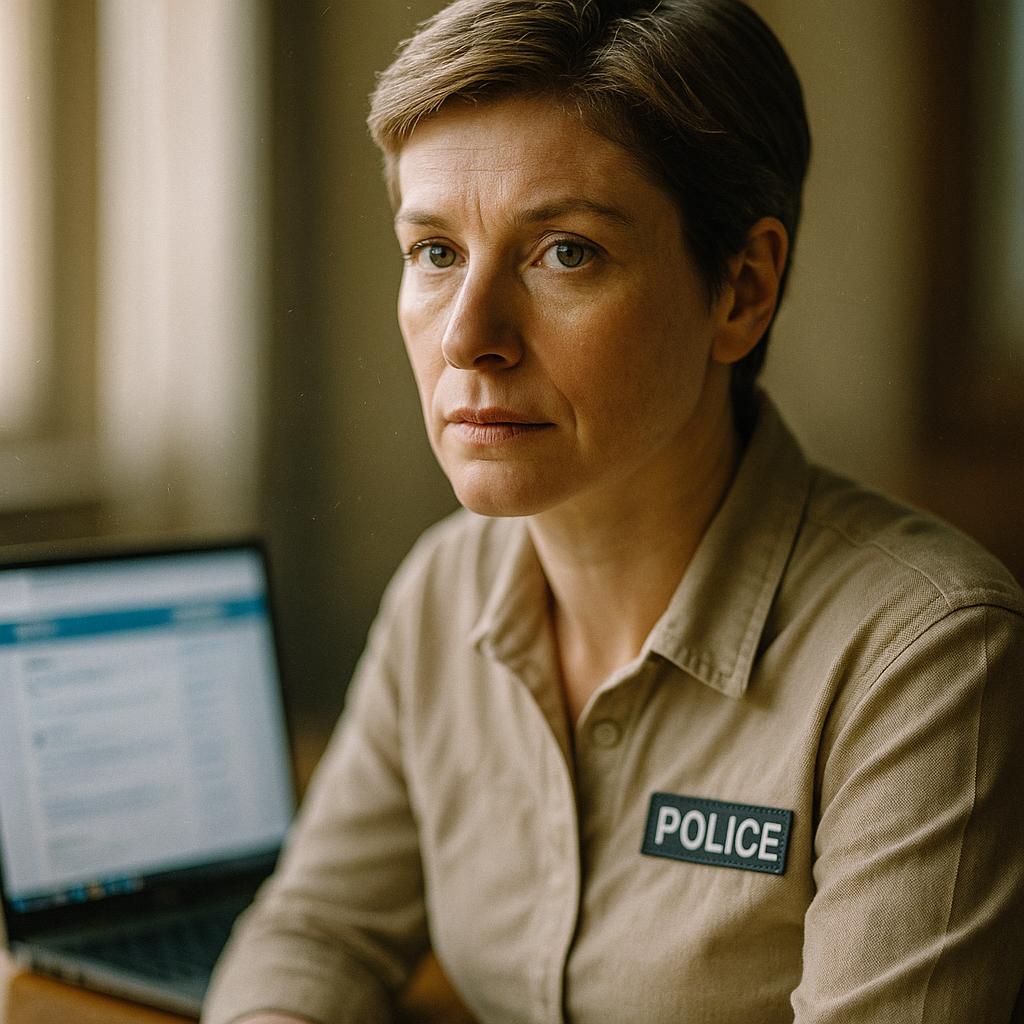 Image by RM AI
Image by RM AI
The Treatment Continues
The hospital felt different when I returned for my next chemo session—not just because of the extra security measures, but because I felt different. Vulnerable in a way cancer hadn't made me feel. The nurse who checked me in wore a sympathetic smile that told me everyone knew. 'We've implemented some new protocols for you, Mrs. Wilson,' she explained, unlocking a small metal box containing my medications. 'I'll personally verify each dose before you take it.' I nodded, trying to ignore the whispers from other patients in the waiting area. One elderly woman leaned over, her IV pole between us like a barrier. 'Is it true someone tampered with your meds?' she asked, her eyes wide with concern. Before I could answer, Mark squeezed my hand. 'Mom's going to be fine,' he said firmly, but I could see the dark circles under his eyes—he hadn't slept properly since Patricia disappeared. Dr. Sharma stopped by during my infusion, his clipboard clutched tightly against his chest. 'Your blood work is promising, Lorraine,' he said, his voice deliberately upbeat. 'The interruption doesn't seem to have set back your progress.' I wanted to feel relieved, but all I could think about was Patricia out there somewhere, possibly planning her next attempt to 'save' me from the very treatment keeping me alive.
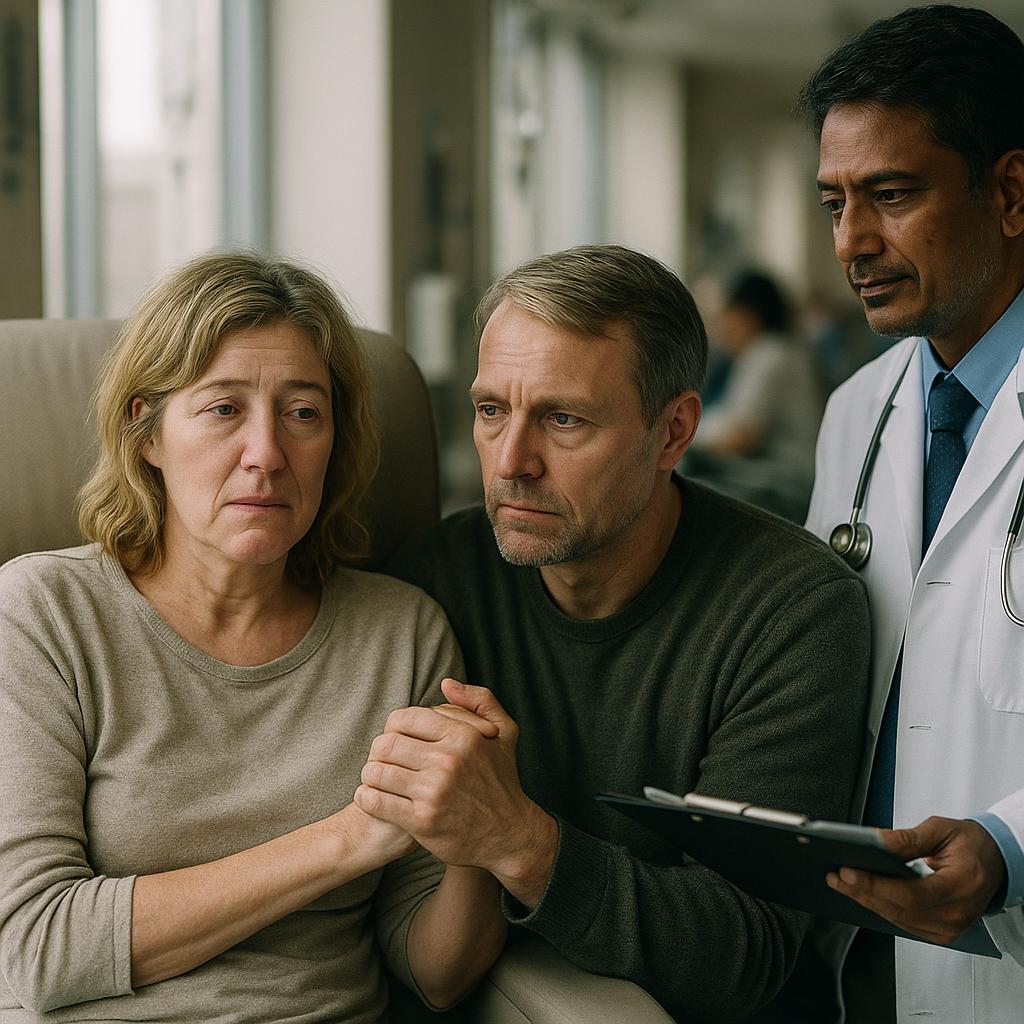 Image by RM AI
Image by RM AI
The Support Group Revelation
I'd been avoiding my cancer support group for weeks, afraid of what I'd say if someone asked how I was doing. How do you casually mention your mother-in-law tried to poison you? But when I finally walked into that church basement, something in me broke open. 'My mother-in-law replaced my cancer meds with homemade herbal pills,' I blurted out during sharing time, my voice shaking. The room went silent—until Sarah, a breast cancer survivor with a pixie cut, leaned forward. 'My sister did something similar,' she said quietly. 'She threw away my pain medication because she read online it was "addictive poison."' Then Greg, a normally quiet older man, shared how his daughter had secretly been adding cannabis oil to his food without telling him, convinced it would cure his prostate cancer better than radiation. I wasn't alone. After the meeting, Sarah introduced me to her therapist, Dr. Winters, who specialized in family conflicts during illness. 'She saved my relationship with my sister,' Sarah explained, pressing the business card into my palm. 'And possibly my sanity.' For the first time since Patricia disappeared, I felt something beyond betrayal and fear—I felt understood. What I didn't realize then was that this support group would soon become crucial in ways none of us could have anticipated.
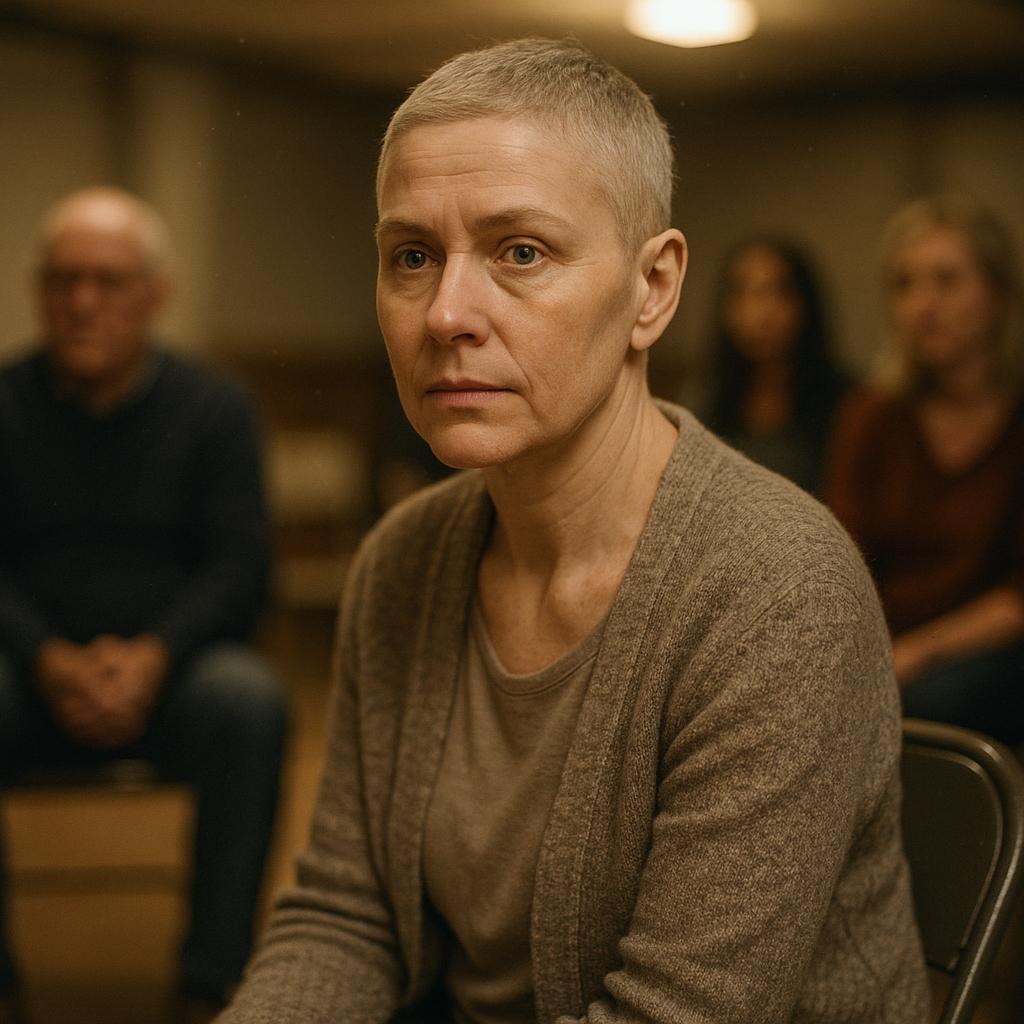 Image by RM AI
Image by RM AI
The First Therapy Session
Dr. Winters' office felt like a sanctuary—warm lighting, no medical equipment in sight, just comfortable chairs and a box of tissues I was already putting to good use. 'What Patricia did wasn't just dangerous, Lorraine—it was a profound betrayal of trust,' she said, her voice gentle but direct. I nodded, twisting my wedding ring nervously. 'But here's what's complicated: she genuinely believed she was saving your life.' I laughed bitterly. 'By replacing my actual medicine with glorified vitamins?' Dr. Winters leaned forward. 'In her mind, she was rescuing you from poison. This wellness group essentially radicalized her—they convinced her that conventional medicine was the enemy.' She explained how these groups operate like cults, preying on people's fears and love for their family members. 'The hardest part for you,' she continued, 'will be reconciling the Patricia you knew for decades with the woman who did this.' I felt tears welling up again. 'How do I forgive someone who nearly killed me while thinking they were helping?' Dr. Winters handed me another tissue. 'Forgiveness isn't about excusing what happened, Lorraine. It's about not letting it consume you.' As I left her office that day, I wondered if I could ever look at Patricia again without seeing the woman who chose herbs over my life—and if Mark could ever forgive his mother for what she'd done to his wife.
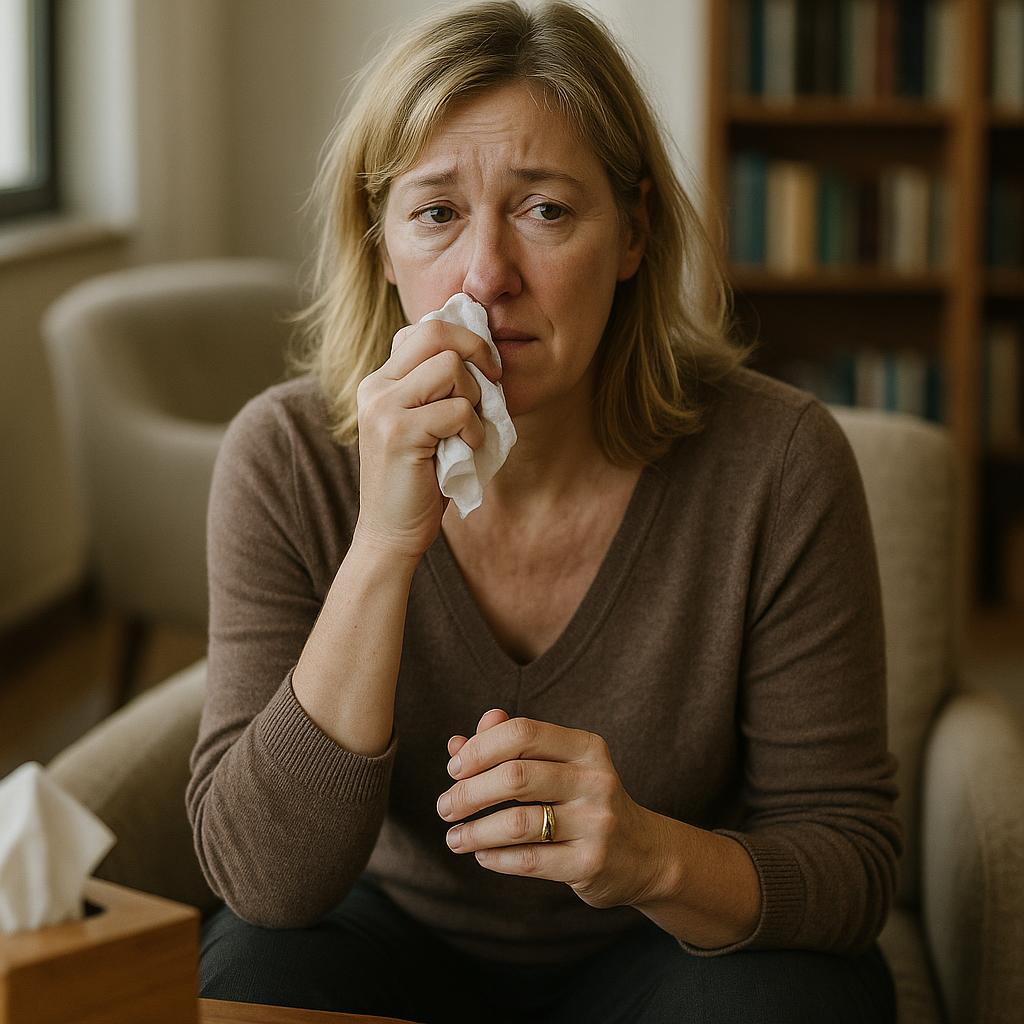 Image by RM AI
Image by RM AI
Mark's Guilt
Mark started therapy last week. He came home from his first session with red-rimmed eyes and a heaviness I hadn't seen before—not even during my worst chemo days. 'I should have seen it coming, Lorraine,' he confessed that night, his voice breaking as we sat on our back porch. 'Mom was posting conspiracy theories on Facebook for years. Remember when she started calling doctors "Big Pharma puppets"?' I did remember, but like Mark, I'd written it off as harmless eccentricity—the kind of thing you roll your eyes at during Thanksgiving dinner. 'She once told me chemotherapy was a money-making scheme,' he continued, staring into his untouched tea. 'I laughed it off. I actually laughed.' His therapist had helped him see that Patricia's descent into extremism hadn't happened overnight. There had been red flags: the increasing isolation, the growing distrust of mainstream medicine, the wellness group that demanded more and more of her time and money. 'I could have gotten her help,' Mark whispered, tears streaming down his face. 'Instead, I let her nearly kill the person I love most.' I held him as he sobbed, wondering how many other families were out there, watching their loved ones slip away into radical beliefs, dismissing the warning signs until it was too late.
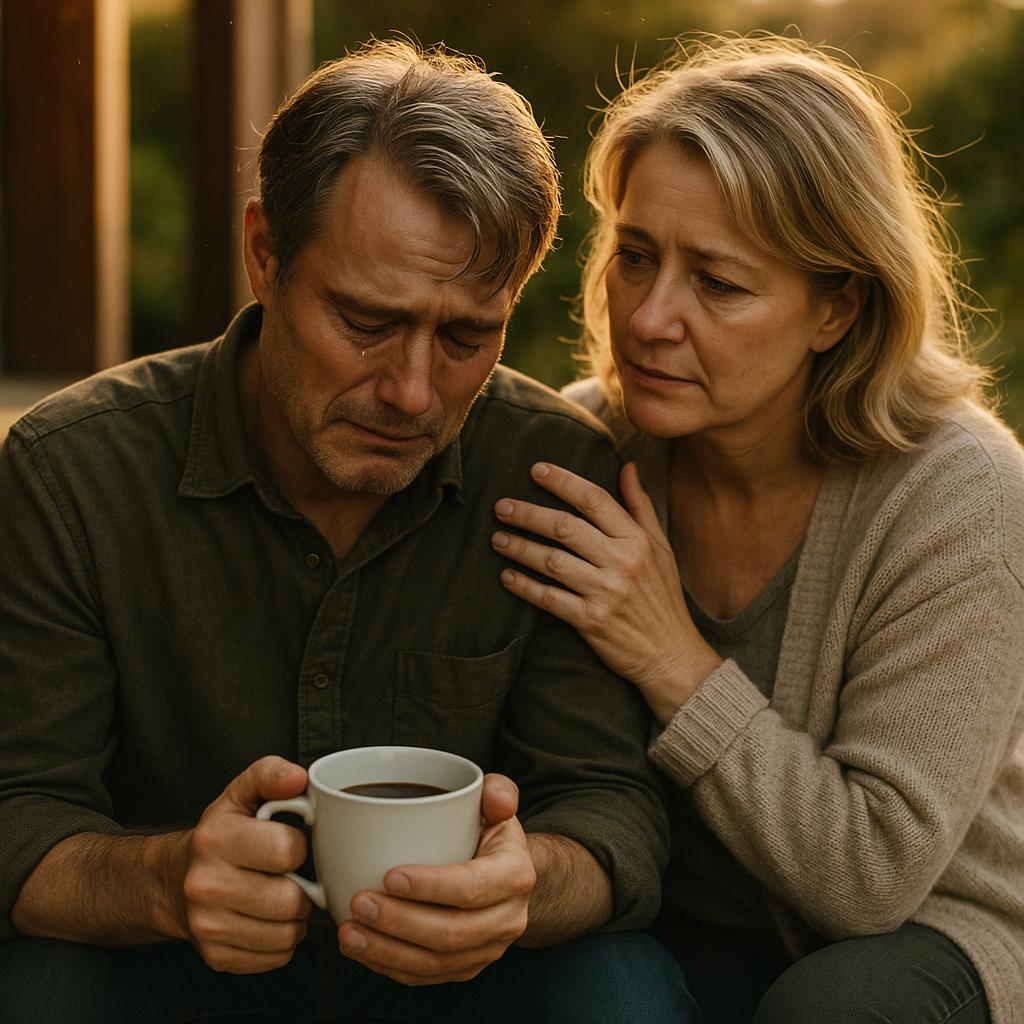 Image by RM AI
Image by RM AI
The First Lead
The call from Officer Moreau came at 2:37 AM, jolting Mark and me from our first decent sleep in weeks. 'We have a lead,' she said, her voice crackling with urgency. 'Patricia used her Visa at the Pinewood Motel in Oakridge, three states away.' My heart hammered against my ribs as Mark put the phone on speaker. 'By the time local police arrived, they'd already checked out,' Officer Moreau continued, 'but the motel owner remembered them clearly.' Apparently, Patricia and Greta had been discussing something called a 'healing retreat' in the mountains, showing the owner brochures with images of meditation circles and crystal healing sessions. 'We're focusing our search on alternative medicine centers in that region,' Officer Moreau explained. 'There are seven facilities that match the description.' I gripped Mark's hand, trying to process this bizarre reality—my mother-in-law, who once baked cookies for church bake sales, was now on the run, hopping from motel to motel like some kind of wellness outlaw. The most chilling part wasn't that she was hiding; it was knowing she still believed she was right. And somewhere in those mountains, surrounded by like-minded zealots, she might be gathering strength—and resources—for another attempt to 'save' me.
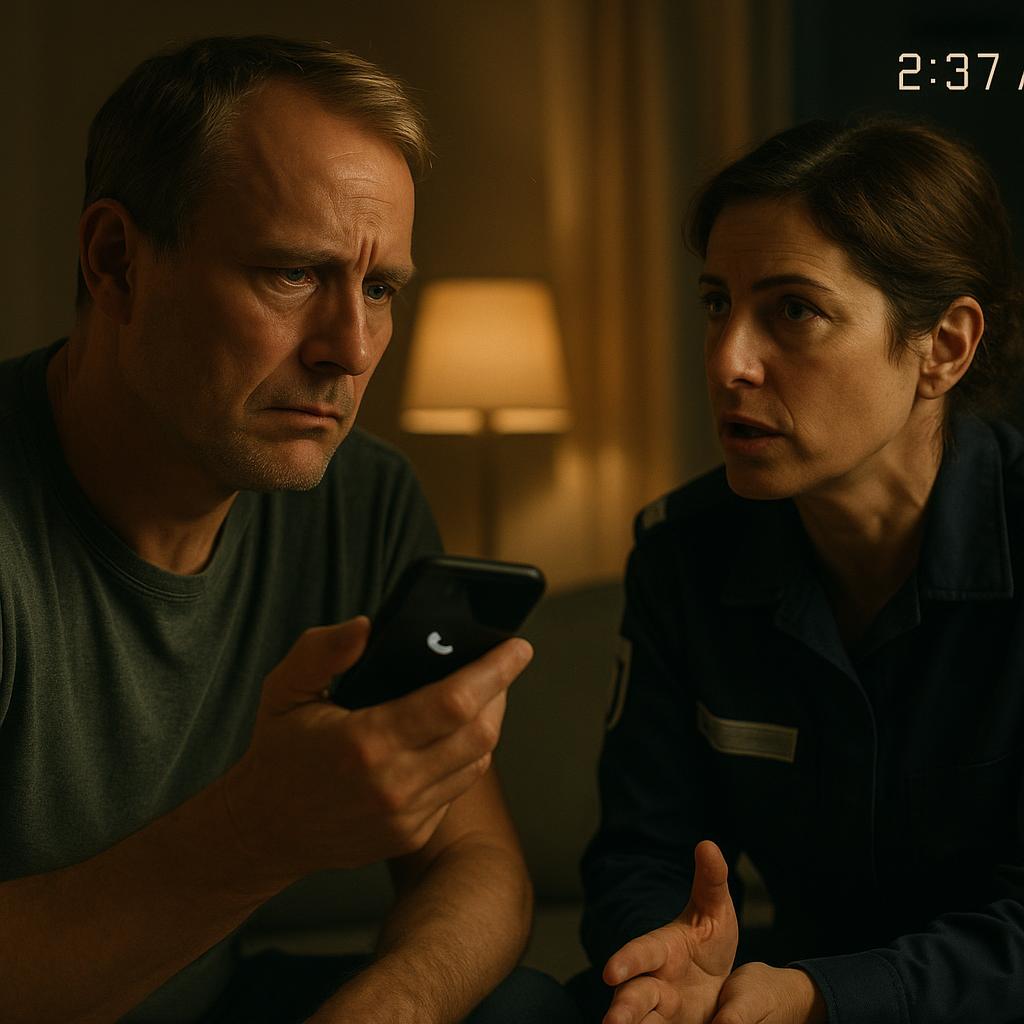 Image by RM AI
Image by RM AI
The Email from Patricia
I was sorting through my inbox on Tuesday morning, deleting spam and answering work emails, when a subject line made my blood run cold: 'I Did It Because I Love You.' The sender's address was unfamiliar—[email protected]—but I knew instantly who it was from. My hands trembled as I clicked open Patricia's message. 'Dearest Lorraine,' it began, 'The medical establishment has brainwashed you and Mark.' What followed was five paragraphs of rambling justifications, calling oncologists 'agents of Big Pharma' and chemotherapy 'legalized poison.' She'd attached links to websites with names like 'Cancer Truth Revealed' and 'Oncology Deception.' 'I couldn't stand by while they killed you slowly,' she wrote. 'Someday you'll understand I acted out of love.' I called Officer Moreau immediately, who arrived within the hour. 'This is actually good news,' she said, her eyes scanning the email on my laptop. 'Our tech team can trace the IP address.' By evening, they'd confirmed it came from a public library computer in Pinecrest—the same mountain region where they'd been focusing their search. 'We're closing in,' Officer Moreau assured us. But that night, as Mark slept fitfully beside me, I kept rereading Patricia's final line: 'I haven't given up on saving you yet.' It wasn't just a goodbye—it was a promise.
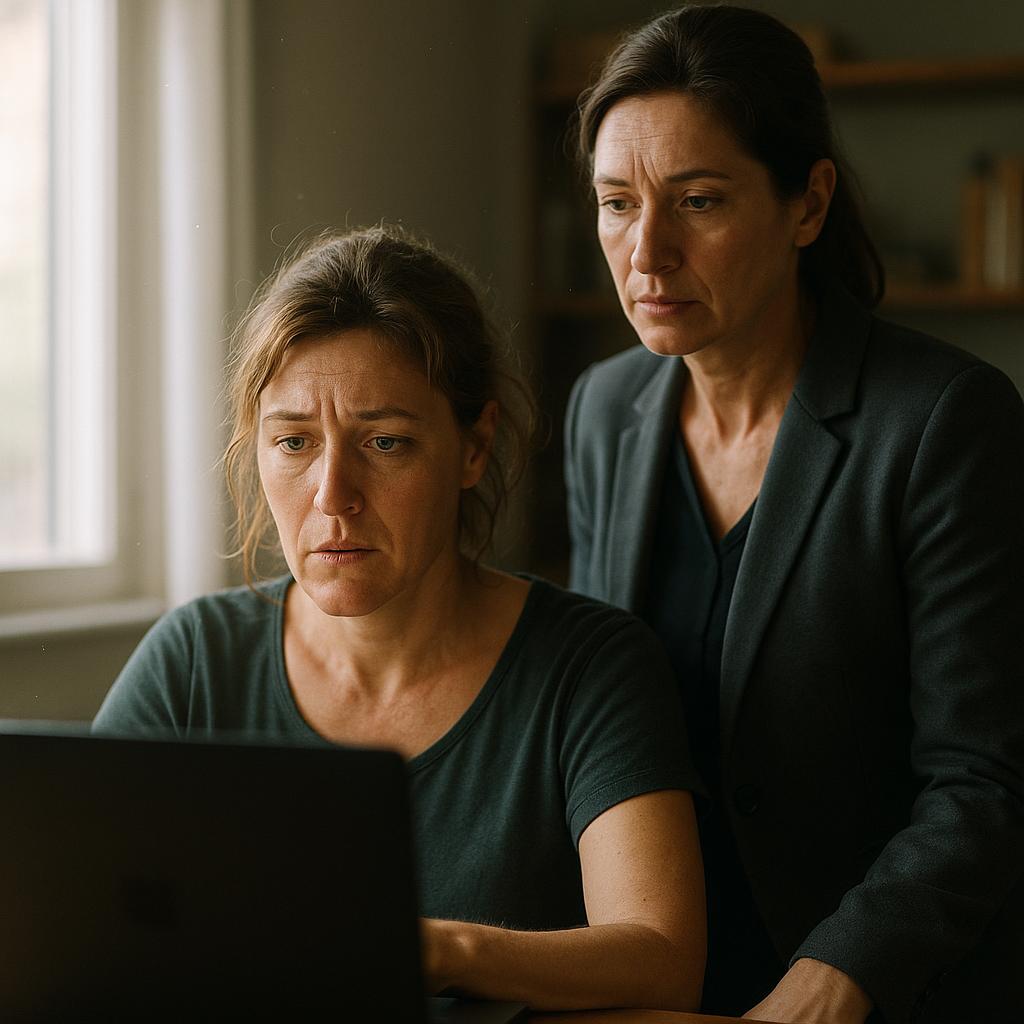 Image by RM AI
Image by RM AI
The Children's Reactions
The aftermath of Patricia's betrayal affected my children in ways I never anticipated. Emma, always the researcher, threw herself into understanding what had happened. Our dining room table disappeared under stacks of printouts about 'medical freedom' groups and cult psychology books. 'Mom, did you know these wellness groups follow the same recruitment patterns as actual cults?' she'd ask, eyes wide with horrified fascination. She'd stay up until 2 AM watching documentaries about medical misinformation, as if understanding Patricia's mindset could somehow undo the damage. Jason, on the other hand, went completely silent on the subject. The one time I mentioned his grandmother, he slammed his water glass down so hard it cracked. 'She doesn't exist to me anymore,' he said through clenched teeth. His coach called to tell me Jason had broken the school's backboard during practice—his anger finding release in increasingly aggressive play. Mark and I found ourselves caught between them: Emma demanding family discussions about 'how we missed the signs,' while Jason would immediately leave the room. 'I can't be in this house when she's talking about that woman,' he told Mark during a rare moment of vulnerability. What terrified me most wasn't just Patricia's betrayal, but how it was creating new fractures in my family—cracks I wasn't sure would ever fully heal.
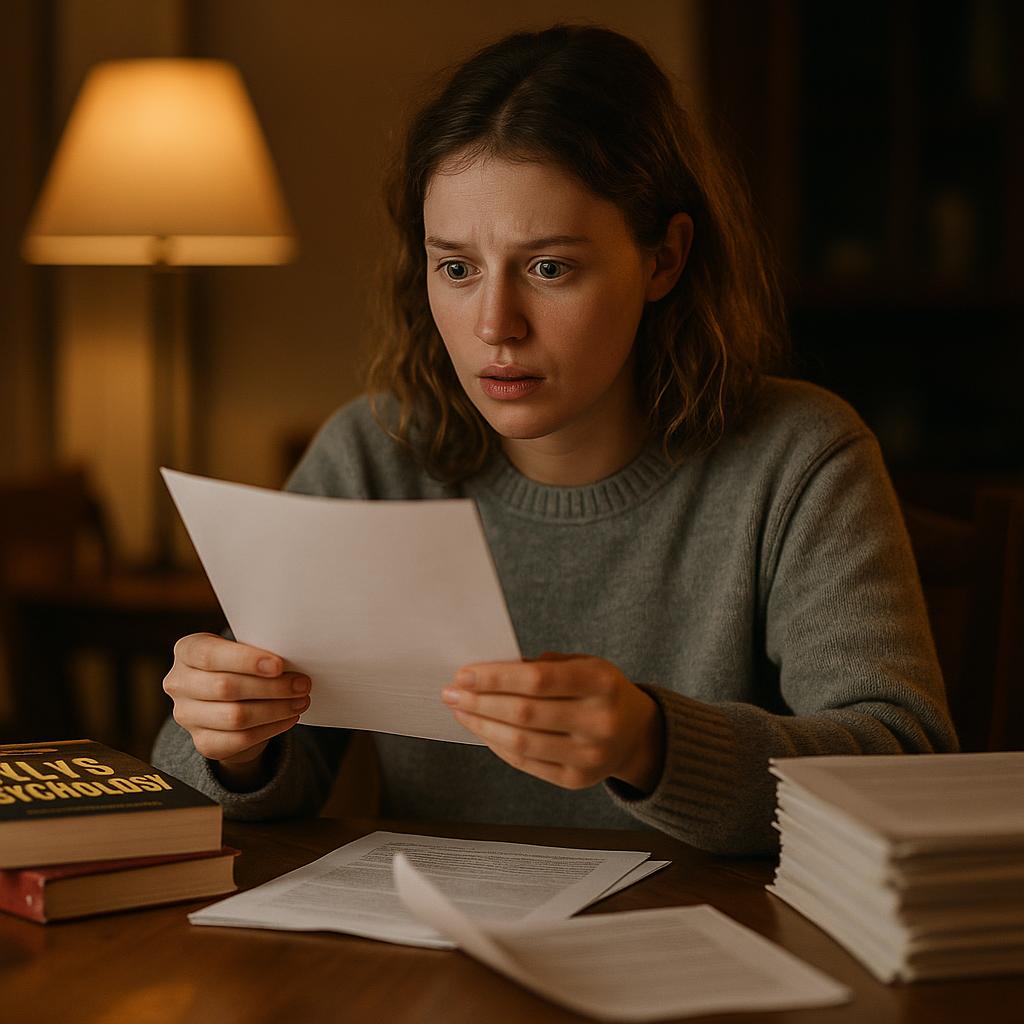 Image by RM AI
Image by RM AI
The Retreat Raid
Officer Moreau called at dawn with news that made my heart race. 'We've located the retreat,' she said, her voice tense with anticipation. 'Natural Harmony—it's hidden on private property in the mountains.' I gripped Mark's hand as she explained how SWAT teams had surrounded the compound at first light. 'We found Greta and twelve others,' she continued, 'but no Patricia.' The footage they recovered showed my mother-in-law had been there just three days earlier, participating in what looked like some kind of ceremony involving herbs and candles. When officers questioned Greta, she'd become combative, screaming about 'medical freedom fighters' being persecuted. 'She demanded a lawyer and hasn't said a word since,' Officer Moreau sighed. 'But we did find something concerning in her cabin.' They'd discovered journals detailing 'rescue missions' for cancer patients—complete with recipes for homemade pill substitutes and strategies for gaining access to medication. My name appeared multiple times, alongside others I didn't recognize. 'We believe Patricia may have gone to meet another member of their network,' Officer Moreau explained. 'Someone who could help her with...' She hesitated. 'With what, exactly?' Mark demanded, his voice breaking. The officer's response chilled me to the bone: 'With what they're calling Phase Two.'
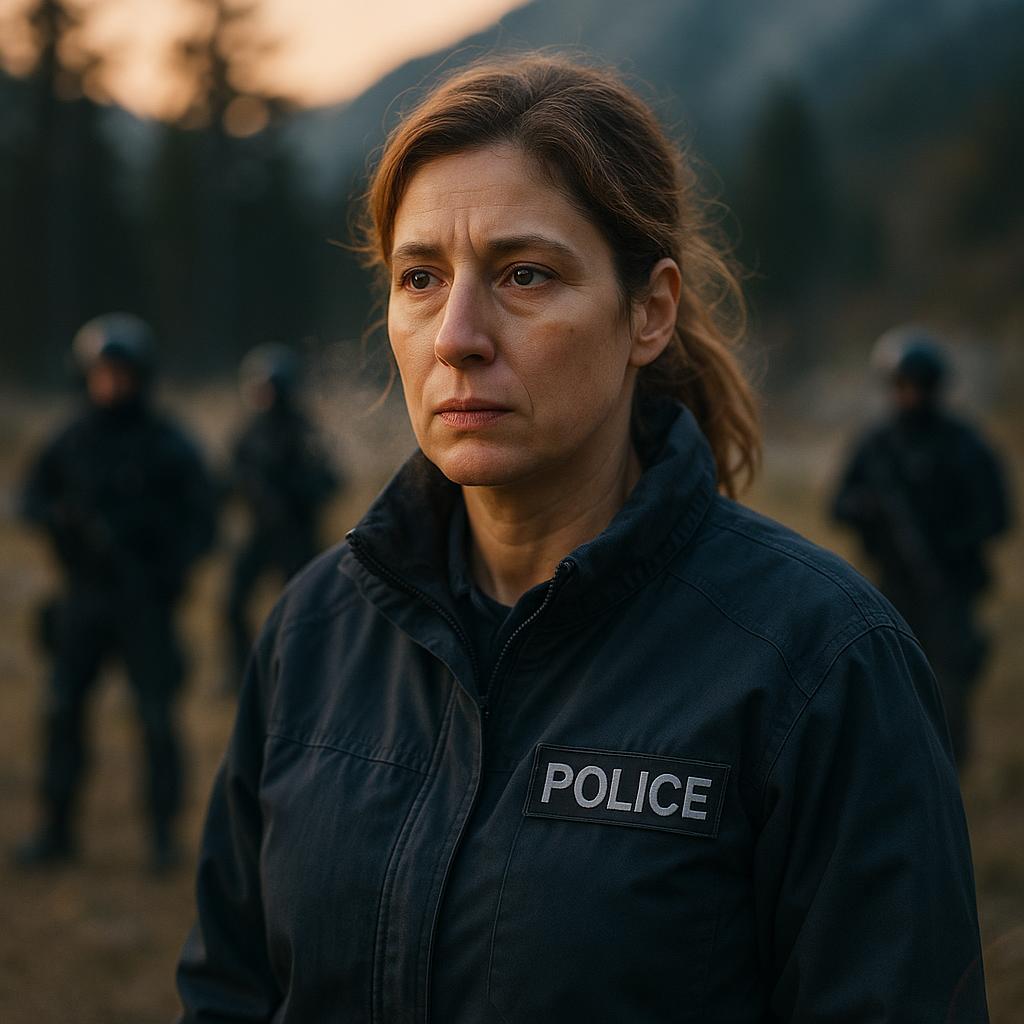 Image by RM AI
Image by RM AI
The Final Scan
The day of my final scan arrived with a weight that felt heavier than all my chemo sessions combined. Mark and I sat in the hospital waiting room, not speaking, just holding hands so tightly our knuckles turned white. Every time the door opened, we both jumped. I couldn't stop thinking about those pills Patricia had switched—had they compromised everything? Had her 'natural healing' crusade cost me my life? When Dr. Sharma finally called us in, his face was unreadable, that practiced neutral expression doctors perfect over years of delivering both miracles and devastation. 'Lorraine,' he said, gesturing to the chair across from his desk. My legs felt like jelly as I sat down. He pulled up my scans on his computer screen, and I held my breath, unable to interpret the gray and white images that held my fate. 'I've reviewed your results thoroughly,' he said, turning to face us directly. His eyes met mine, and for a moment that stretched into eternity, the world stood still. I thought about Emma and Jason, about the grandchildren I might never meet, about all the moments Patricia had tried to steal from me with her misguided love. Dr. Sharma's face suddenly broke into a smile—the first genuine, unguarded expression I'd seen from him. 'The treatment worked, Lorraine. Despite everything, you're in remission.'
 Image by RM AI
Image by RM AI
The Good News
Dr. Sharma's face broke into a smile I hadn't seen before—genuine, unguarded, almost radiant. 'The scans are clear, Lorraine,' he said, turning his computer monitor toward us. 'No detectable cancer remains.' I stared at the gray and white images, unable to process what I was seeing. 'Despite the... interruption in your treatment,' he continued carefully, 'you've responded remarkably well.' Mark's grip on my hand tightened as tears streamed down both our faces. We embraced right there in the office, sobbing with a relief so profound it felt like physical pain. Dr. Sharma gave us a moment before gently adding, 'We'll need vigilant follow-up care, of course. Every three months for the first year.' I nodded through my tears, unable to speak. The victory felt bittersweet—Patricia wasn't here to share it, and even if she were, she'd never attribute my healing to the very medicine that saved me. She'd claim her herbs had done the work, that the doctors were taking credit for nature's miracle. As we walked to the car, Mark's phone buzzed with a text. His face went pale as he showed me the screen: 'Unknown Number: Congratulations on your healing, Lorraine. I knew you'd be okay. Love, Mom.' Somehow, she already knew.
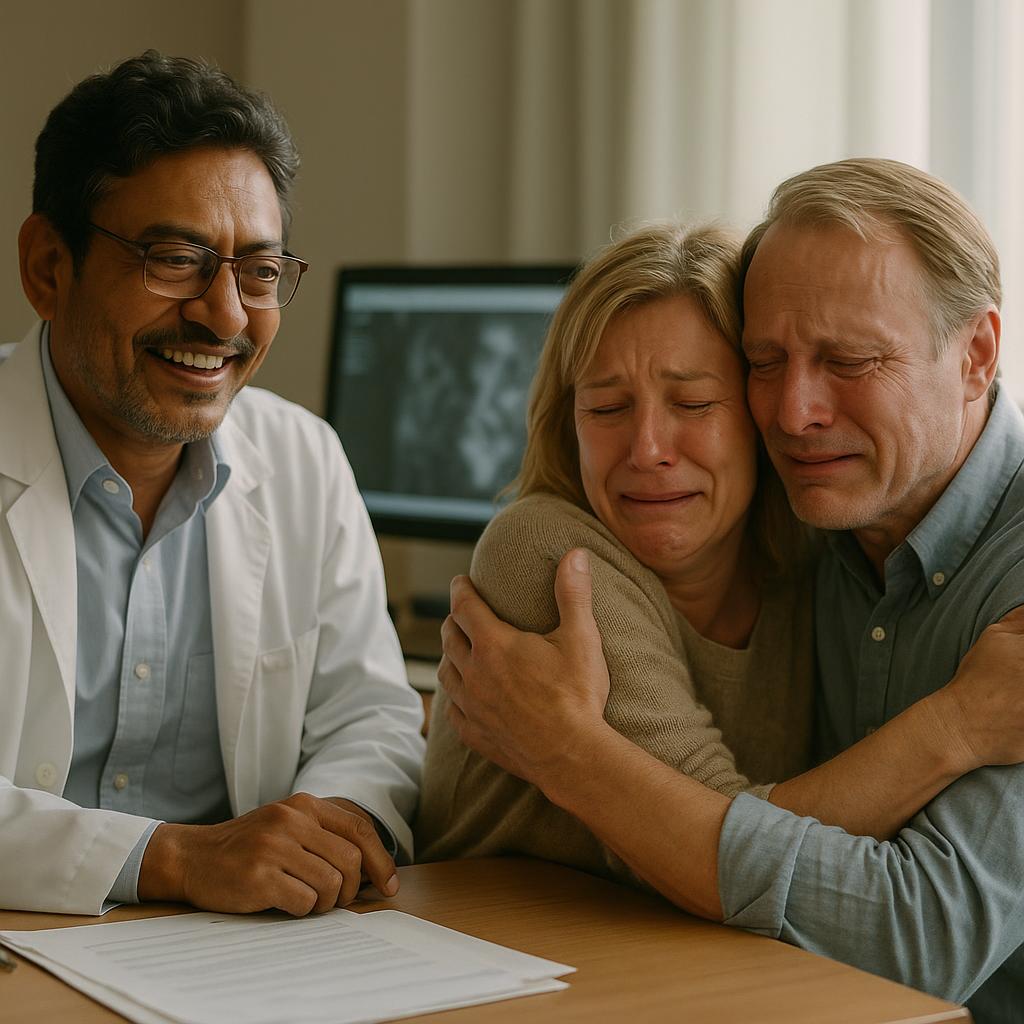 Image by RM AI
Image by RM AI
The Celebration Dinner
I spent all afternoon making Mark's famous pot roast and Emma's favorite lemon cake, determined to make this dinner special. We needed this celebration—this moment of normalcy after months of chaos. As we clinked glasses around our dining table, I felt a warmth I hadn't experienced since before my diagnosis. 'To Mom,' Jason said, his voice cracking slightly, 'the toughest person I know.' Emma wiped away tears, and Mark squeezed my hand under the table. For a fleeting moment, Patricia's absence felt like a phantom limb—painful but somehow necessary. We were halfway through dessert when the doorbell rang. Mark answered while I served coffee, but when he returned, Officer Moreau was with him, her expression somber despite her attempt at a smile. 'I'm sorry to interrupt your evening,' she said, declining my offer of cake. 'We've located Patricia.' My fork clattered against my plate. 'She's been staying with a woman named Diane in Vermont—another member of the wellness group.' Officer Moreau explained that Patricia was being transported back to our state for questioning. 'You'll need to decide whether to press charges, Mrs. Wilson.' The officer's words hung in the air like smoke. 'We'll need your decision by tomorrow morning.' As she left, four pairs of eyes turned to me, and I realized with a sinking feeling that my cancer might have gone into remission, but the hardest decision of my life was still ahead of me.
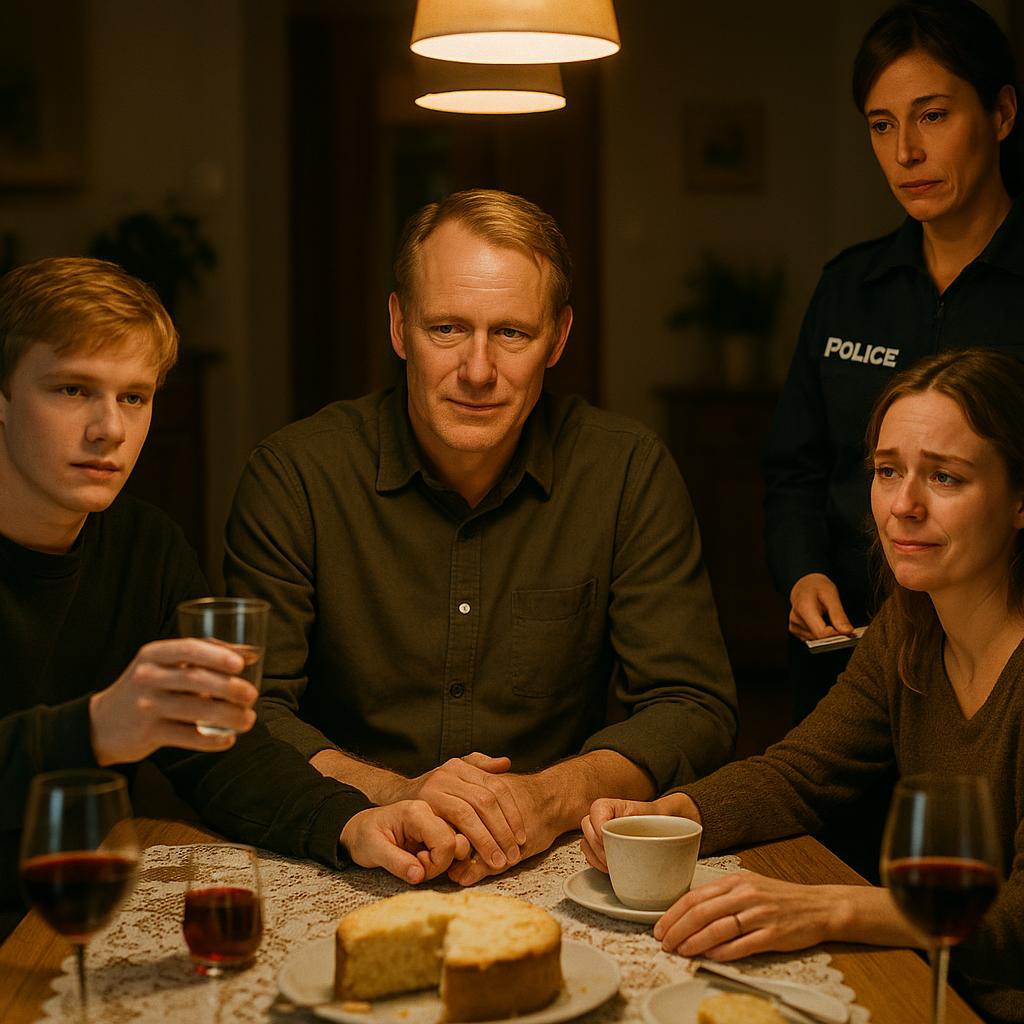 Image by RM AI
Image by RM AI
The Family Decision
We gathered in our living room until 2 AM, four exhausted people trying to decide the fate of someone we once loved. The coffee table between us was littered with empty mugs and crumpled tissues as we debated what to do about Patricia. 'She needs to face consequences,' Mark insisted, his voice hoarse from hours of talking. 'What if she does this to someone else?' I couldn't stop thinking about the toll a court case would take—more stress when I should be focusing on healing. 'There has to be another way,' I pleaded. Emma, ever the mediator, leaned forward with her laptop. 'What about mandatory psychiatric evaluation and treatment?' she suggested, showing us similar cases where courts had ordered mental health intervention. Jason, who'd been eerily quiet all evening, suddenly slammed his fist on the armrest. 'She tried to KILL Mom!' he shouted, tears streaming down his face. 'How is this even a question?' His outburst silenced the room. I reached for his hand, but he pulled away, storming upstairs. The sound of his bedroom door slamming echoed through our home like a gavel, and I realized that whatever decision we made about Patricia would either begin our healing—or fracture our family beyond repair.
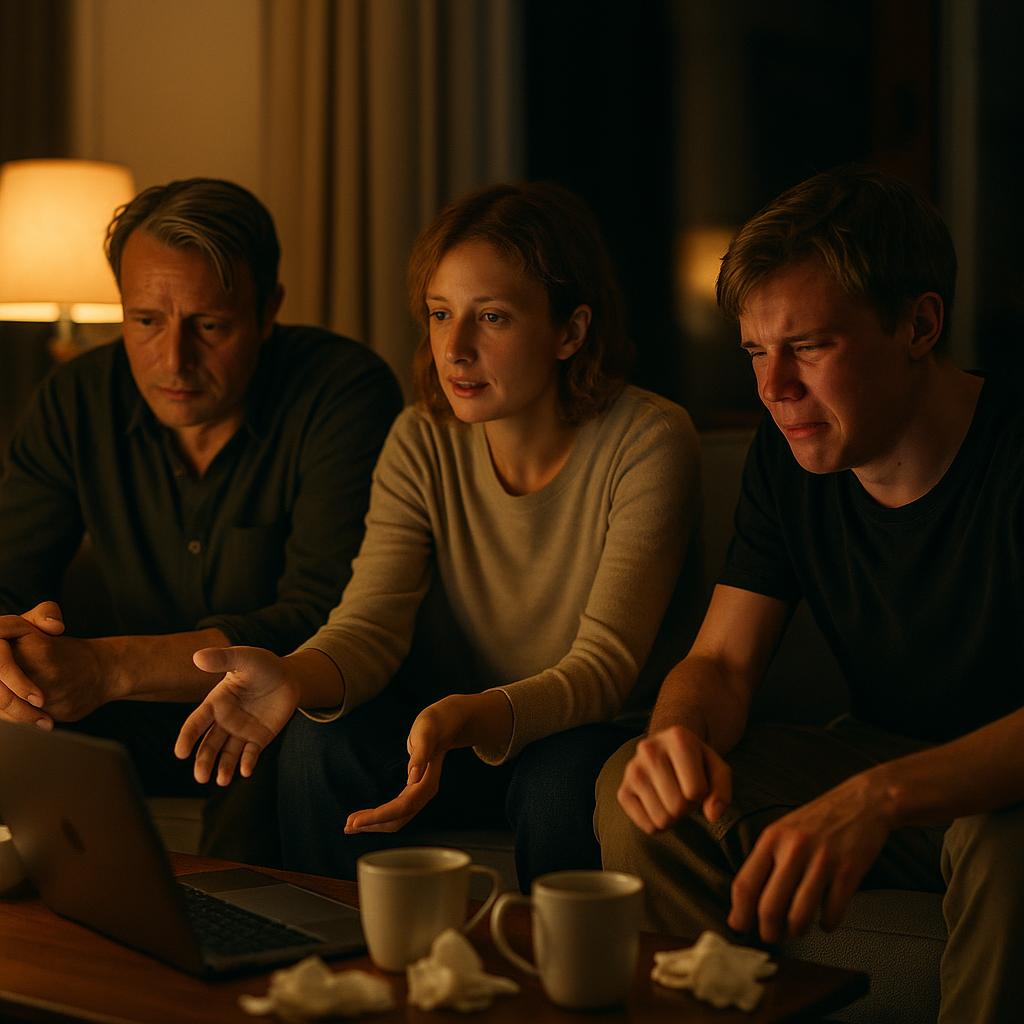 Image by RM AI
Image by RM AI
The Police Station
The drive to the police station was the longest twenty minutes of my life. Mark gripped the steering wheel so tightly his knuckles turned white, while I rehearsed what I might say to the woman who'd betrayed me in the name of love. 'Are you sure you're ready for this?' Mark asked as we pulled into the visitor parking. I wasn't sure at all, but I nodded anyway. Officer Moreau met us in the lobby, her face professionally neutral as she led us down a sterile hallway. 'She's been cooperative,' she explained, 'but still insists she was trying to help you.' When we reached the interview room, my heart nearly stopped. Through the window, I saw Patricia—my mother-in-law who once brought me chicken soup when I had the flu, who taught me her secret pie crust recipe, who tried to replace my cancer medication with herbs. She looked diminished somehow, her shoulders hunched, her usually perfect hair unwashed. The defiance in her posture couldn't hide the fear in her eyes. When she spotted us watching through the glass, her expression crumpled into something impossible to categorize—part shame, part righteousness, part desperate love. It was like watching two versions of Patricia battling within the same body: the woman who loved her family and the zealot who'd risked my life for her beliefs. Officer Moreau's hand rested on the door handle. 'Ready?' she asked. I took a deep breath, knowing that whatever happened next would change our family forever.
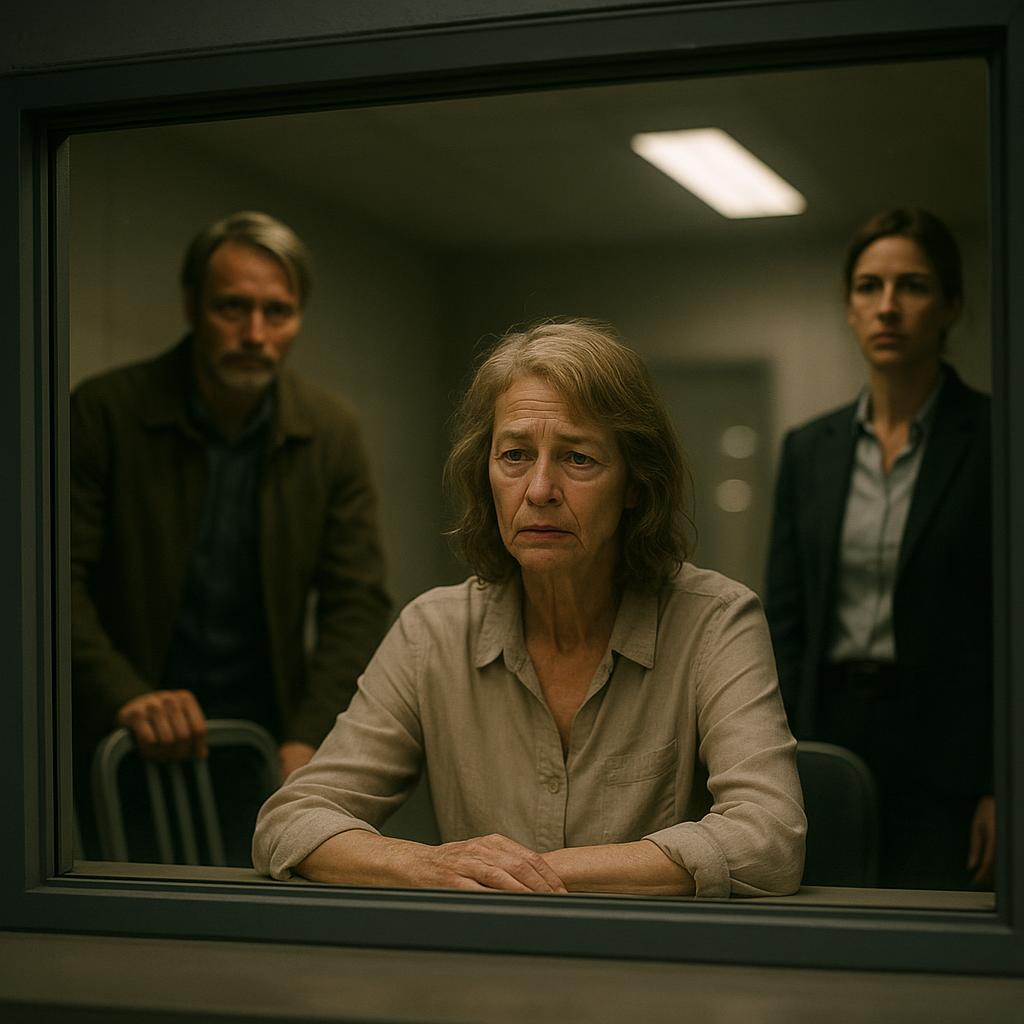 Image by RM AI
Image by RM AI
The Confrontation
Officer Moreau opened the door, and I stepped into the interview room, my heart pounding against my ribs. Patricia looked up, her eyes brightening with what looked disturbingly like vindication. 'Lorraine! You look wonderful. See? I told you those natural remedies would work!' I felt Mark tense beside me. For the next forty minutes, we showed her medical reports, explained how her actions had endangered my life, even played a recording of my oncologist explaining how the interrupted medication could have been fatal. Nothing penetrated. 'That's just Big Pharma propaganda,' she scoffed, waving away the evidence like it was cigarette smoke. 'Your clean scan proves I was right all along.' I watched her face—the same face that had beamed with pride at our wedding, that had cradled my newborns with tears of joy—and realized with crushing finality that the Patricia I knew was gone. In her place sat a stranger, a woman so entrenched in her beliefs that she'd rewrite reality itself before admitting she was wrong. 'The herbs worked,' she insisted, leaning forward with evangelical fervor. 'The doctors are just taking credit.' As Mark's voice cracked with emotion beside me, I reached for his hand under the table. The most heartbreaking part wasn't that Patricia had betrayed me—it was that she'd never understand why what she did was wrong.
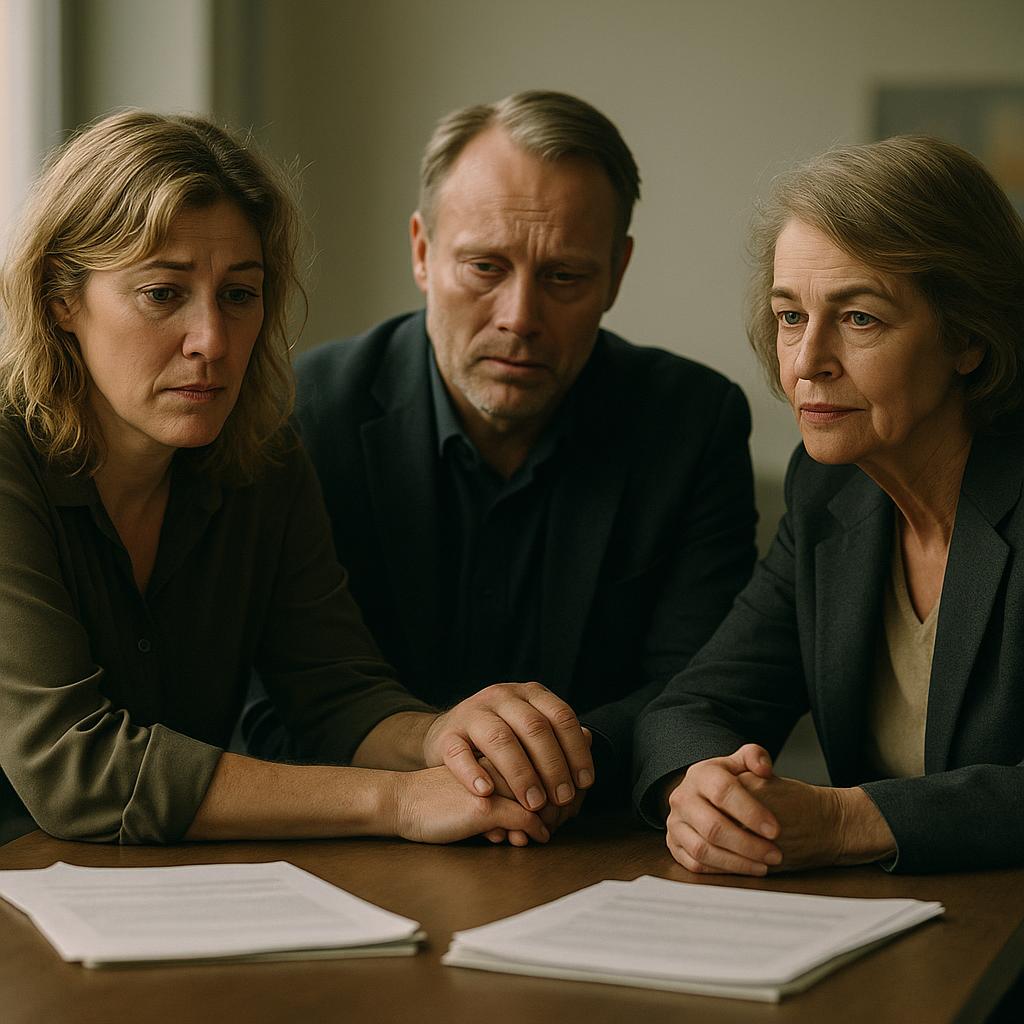 Image by RM AI
Image by RM AI
The Decision
The silence in our car felt heavier than any chemo treatment I'd endured. Mark and I sat in the police station parking lot, both staring straight ahead, emotionally gutted after that surreal conversation with Patricia. How do you process someone you love becoming unrecognizable? 'I can't do it,' I finally whispered, my voice cracking. 'I can't press charges.' Mark turned to me, his eyes red-rimmed. 'Lorraine, she could have killed you.' I reached for his hand. 'I know. But a court case would drain whatever energy I have left. I need to focus on staying cancer-free, not reliving this trauma for months in a courtroom.' He squeezed my fingers so hard it almost hurt. 'I understand,' he said after a long pause. 'But I have one non-negotiable condition.' His jaw tightened. 'She never sets foot in our home again. Ever.' I nodded, feeling both relief and profound sadness wash over me. Sometimes the hardest part of surviving isn't the disease itself—it's navigating the wreckage it leaves in your relationships. As we drove home, I wondered if Patricia would ever understand that in trying to save my life, she'd lost her place in it forever.
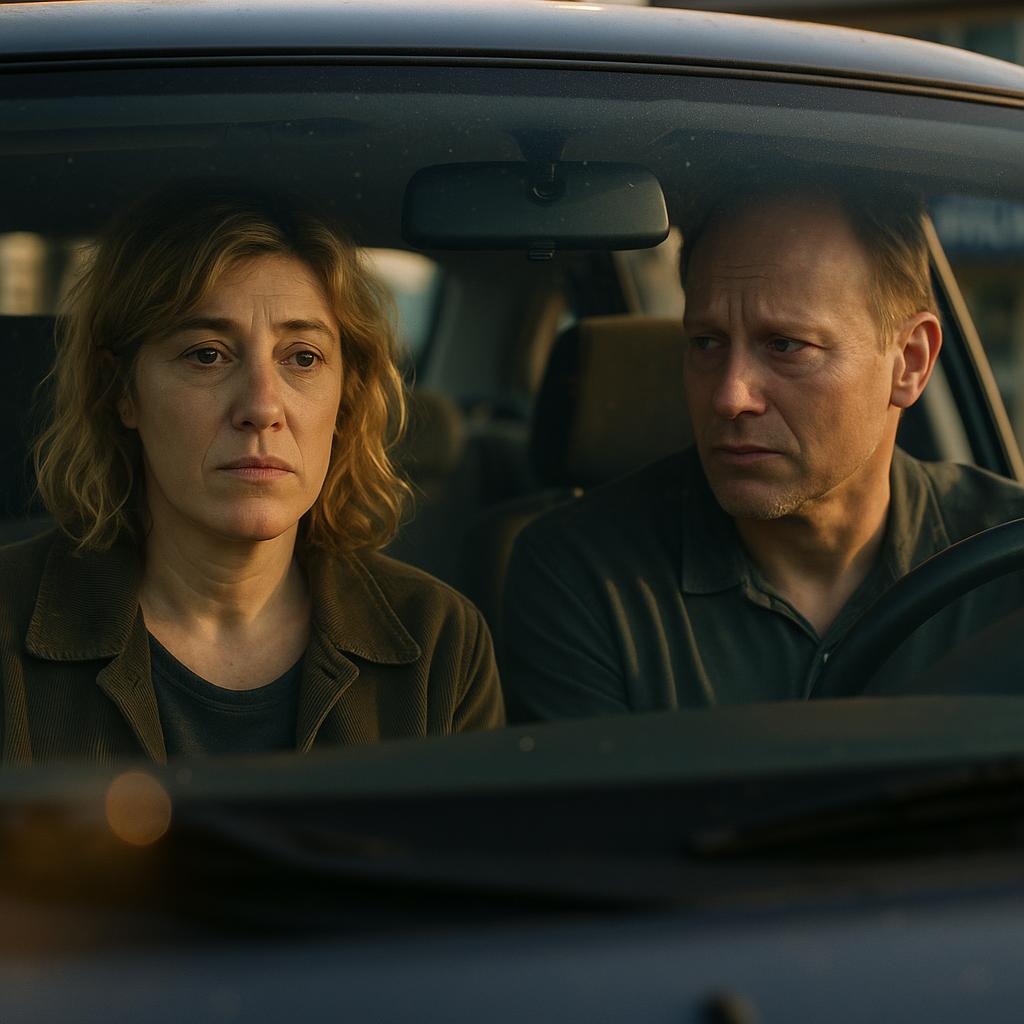 Image by RM AI
Image by RM AI
The Release
The call came from Officer Moreau at 3:17 PM. 'Mrs. Wilson, Patricia has been released.' My stomach dropped as she explained that without my testimony, they could only hold her for the mandatory 48 hours. I'd chosen healing over vengeance, but now faced the consequences of that mercy. Just after dinner, the doorbell rang. Through the kitchen window, I watched Mark's shoulders stiffen as he opened the door to his mother. 'You can't come in,' he said, his voice carrying across our front yard. Patricia stood there clutching a paper bag—probably more 'healing' concoctions—her face a mask of confusion. 'But I came to help with Lorraine's recovery,' she insisted, trying to peer around him into our home. 'My recovery doesn't include you anymore,' I whispered to myself, frozen by the sink. Their conversation escalated, Patricia's hands gesturing wildly until Mark finally stepped onto the porch, closing the door behind him. I couldn't hear his words, but I saw their impact—Patricia's face crumpled, tears streaming down her cheeks as she backed away. As her car disappeared down our street, I felt an odd mixture of relief and heartbreak. The cancer hadn't killed me, but it had claimed something else—the mother-in-law I thought I knew.
 Image by RM AI
Image by RM AI
The New Normal
Six months after the Patricia incident, we've settled into what I hesitantly call our 'new normal.' My follow-up scans remain clear, though I still flinch whenever I open my pill organizer. Mark returned to work full-time last month, and the kids are busy with school activities that mercifully distract them from our family fracture. Patricia's letters arrive like clockwork every Tuesday—thick envelopes filled with apologies tangled with justifications, often accompanied by newspaper clippings about 'medical miracles.' Most end up in our recycling bin unread, though Mark occasionally sends her brief texts about the children's achievements. 'Just the facts,' he says, 'nothing she can twist.' Last week, Officer Moreau called with news that the Natural Harmony group had officially disbanded after three members were charged with practicing medicine without a license. 'Greta took a plea deal,' she explained. 'She's providing names of other patients they've "treated."' I should feel vindicated, but mostly I feel tired. At dinner last night, Emma asked if Grandma would ever come back to our house. The silence that followed her question stretched across our dining table like a physical thing. Just when I thought no one would answer, Jason looked up from his plate and said something that's been echoing in my mind ever since: 'Some bridges don't get rebuilt, Em. Sometimes the fire takes everything.'
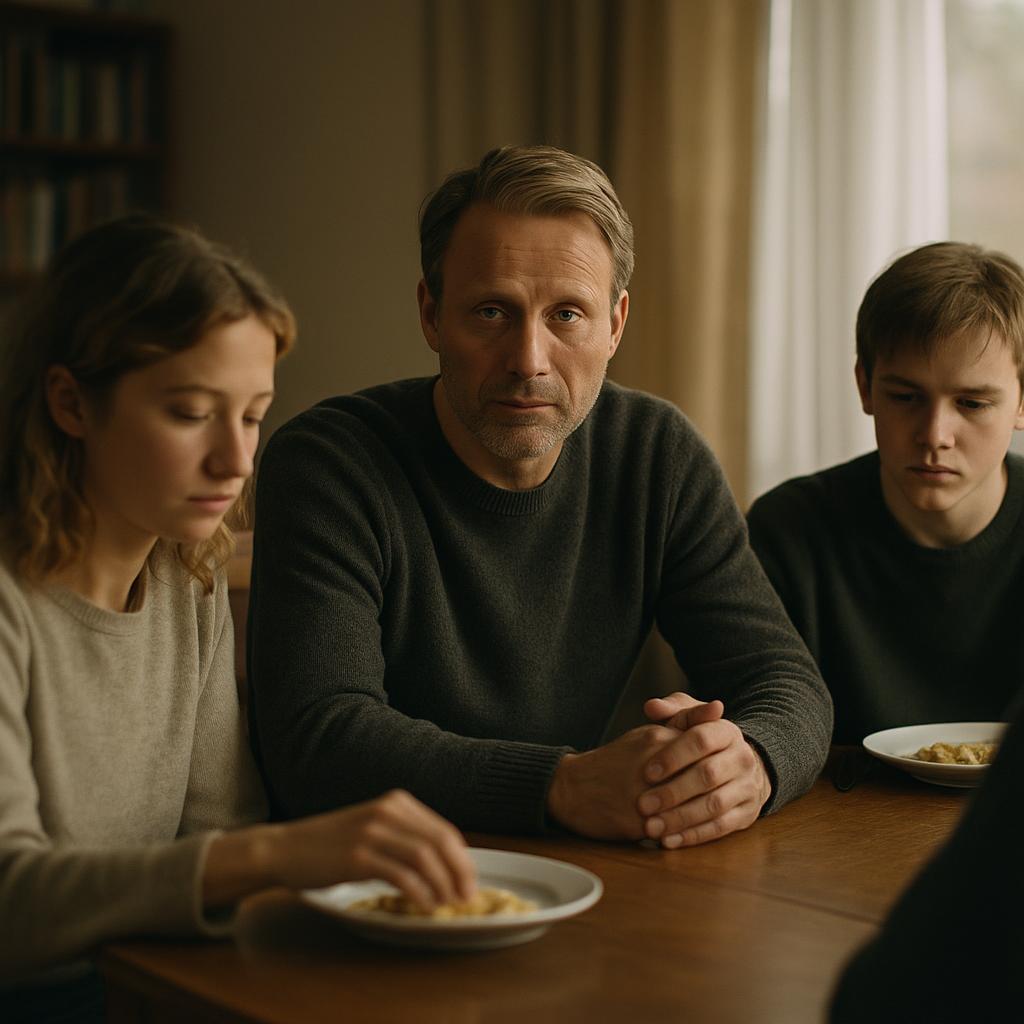 Image by RM AI
Image by RM AI
The Six-Month Checkup
The waiting room at Dr. Sharma's office has become almost familiar now—the same outdated magazines, the same soothing blue walls, the same anxiety churning in my stomach despite six months of clear scans. When he called me in and showed me the images, his smile told me everything before he even spoke. 'Still clear, Lorraine. You're doing remarkably well.' I felt tears spring to my eyes as relief washed over me. But then came the part I wasn't expecting. As he checked my vitals, his brow furrowed slightly. 'Your blood pressure is elevated, and your cortisol levels suggest chronic stress.' He leaned forward, his kind eyes meeting mine. 'The body keeps the score, as they say. What Patricia did to you—that's a different kind of trauma.' He handed me a business card with a name I didn't recognize. 'Dr. Levine specializes in betrayal trauma. In patients whose loved ones have harmed them.' I stared at the card, turning it over in my hands. 'I'm fine,' I insisted automatically. Dr. Sharma just smiled sadly. 'The cancer is in remission, Lorraine. But sometimes the wounds we can't see take the longest to heal.' I tucked the card into my purse, not ready to admit he might be right—that while my body was healing, the betrayal was still poisoning me from within.
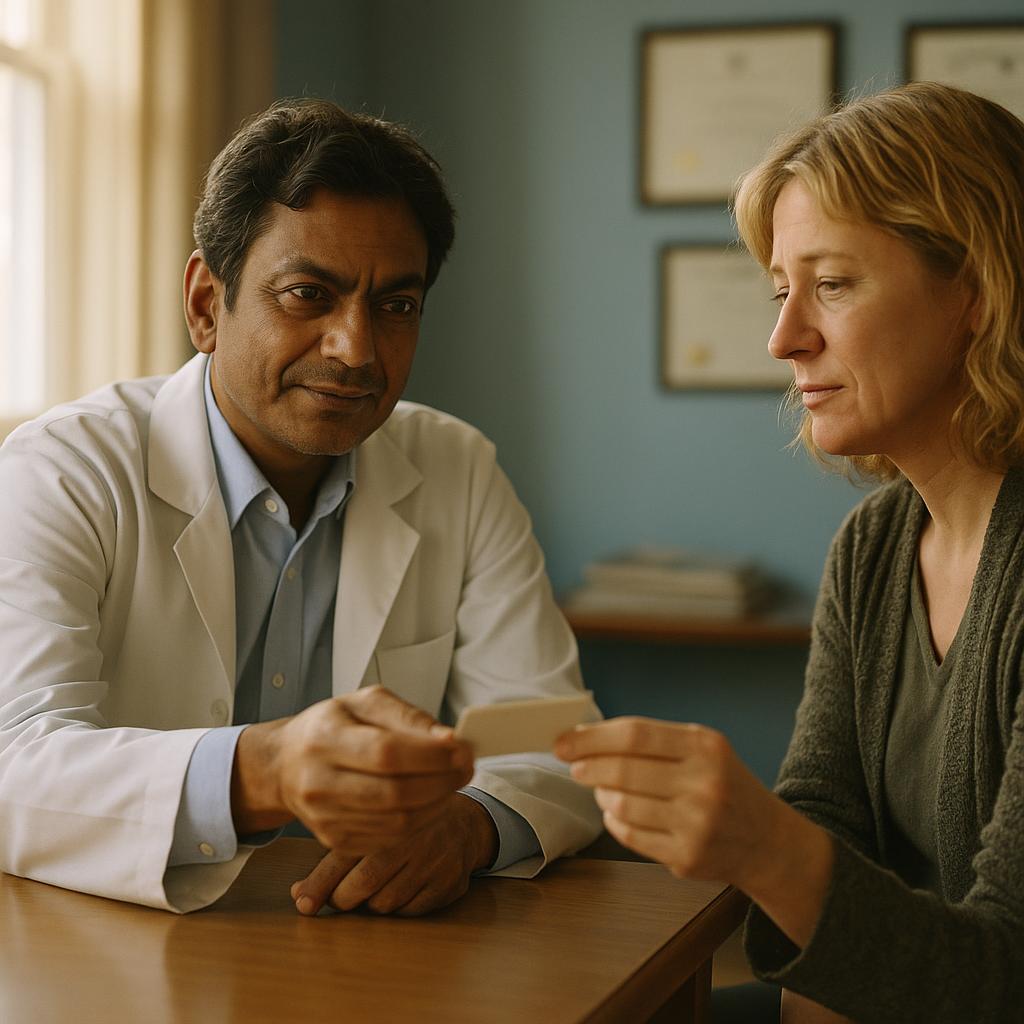 Image by RM AI
Image by RM AI
The Holiday Dilemma
October rolled into November, and suddenly the holiday question loomed over us like a storm cloud. What do we do about Patricia at Thanksgiving? Our first major holiday since... everything. Emma, ever the peacemaker, suggested meeting at a neutral restaurant. 'We could set clear boundaries,' she said, scrolling through Yelp reviews at the kitchen counter. 'Maybe just a two-hour lunch?' Jason slammed his coffee mug down so hard I thought it would crack. 'I'm not spending Thanksgiving watching Grandma slip herbs into Mom's food when she goes to the bathroom,' he snapped. Mark and I exchanged glances across the room—that silent communication you develop after decades of marriage. We were both exhausted by the constant tug-of-war between family unity and self-preservation. After three family meetings and one tearful argument, we reached a compromise that felt like failure wrapped in pragmatism: two separate celebrations. A controlled lunch with Patricia at Olive Garden the Saturday after Thanksgiving, and our real holiday meal—the one with laughter and second helpings and no pill-checking—at home without her. As I addressed her invitation card, I wondered if this was our future now—fractured celebrations, divided loyalties, and the ghost of what our family used to be haunting every holiday table.
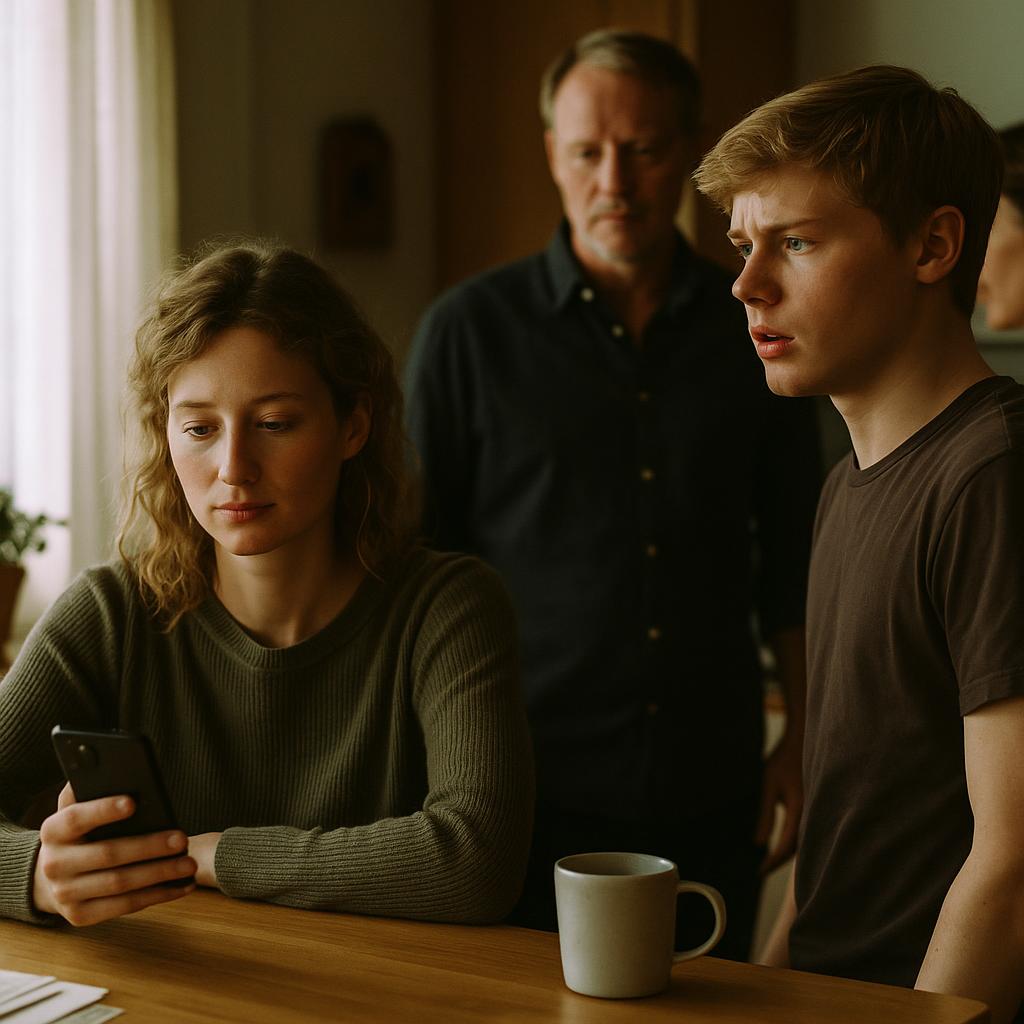 Image by RM AI
Image by RM AI
The Restaurant Meeting
The Olive Garden sign glowed like a beacon of forced normalcy as we pulled into the parking lot. 'Remember, two hours max,' Mark whispered, squeezing my hand before we exited the car. Patricia was already waiting at a table, her face lighting up when she spotted us. She'd gotten her hair done—something about her desperate attempt to look put-together broke my heart a little. 'Emma! Mark! Lorraine!' She stood, arms outstretched, as if the past year had been a minor misunderstanding rather than a criminal investigation. The breadsticks arrived just as the awkward hugs ended, giving us all something to focus on besides the elephant in the room. I noticed Patricia's oversized tote bag bulging with what looked suspiciously like folders. Sure enough, halfway through our salads, she pulled out a thick manila folder. 'I brought some research I thought you might find interesting, Lorraine,' she said, her voice trembling slightly. 'About cancer survivors who—' Mark set his fork down with a clink that somehow sounded like thunder. 'Mom. We discussed this. Not today.' I expected the usual argument, but something had changed. Patricia's shoulders slumped as she silently returned the folder to her bag. In that moment, I saw something I'd never noticed before—fear. Pure, unfiltered fear of losing us completely. She was willing to hide her beliefs, at least temporarily, just to sit across from her son and grandchildren for two hours in a chain restaurant. As our entrees arrived, I caught Emma watching her grandmother with a mixture of pity and confusion, and I wondered if Patricia realized that compliance wasn't the same as redemption.
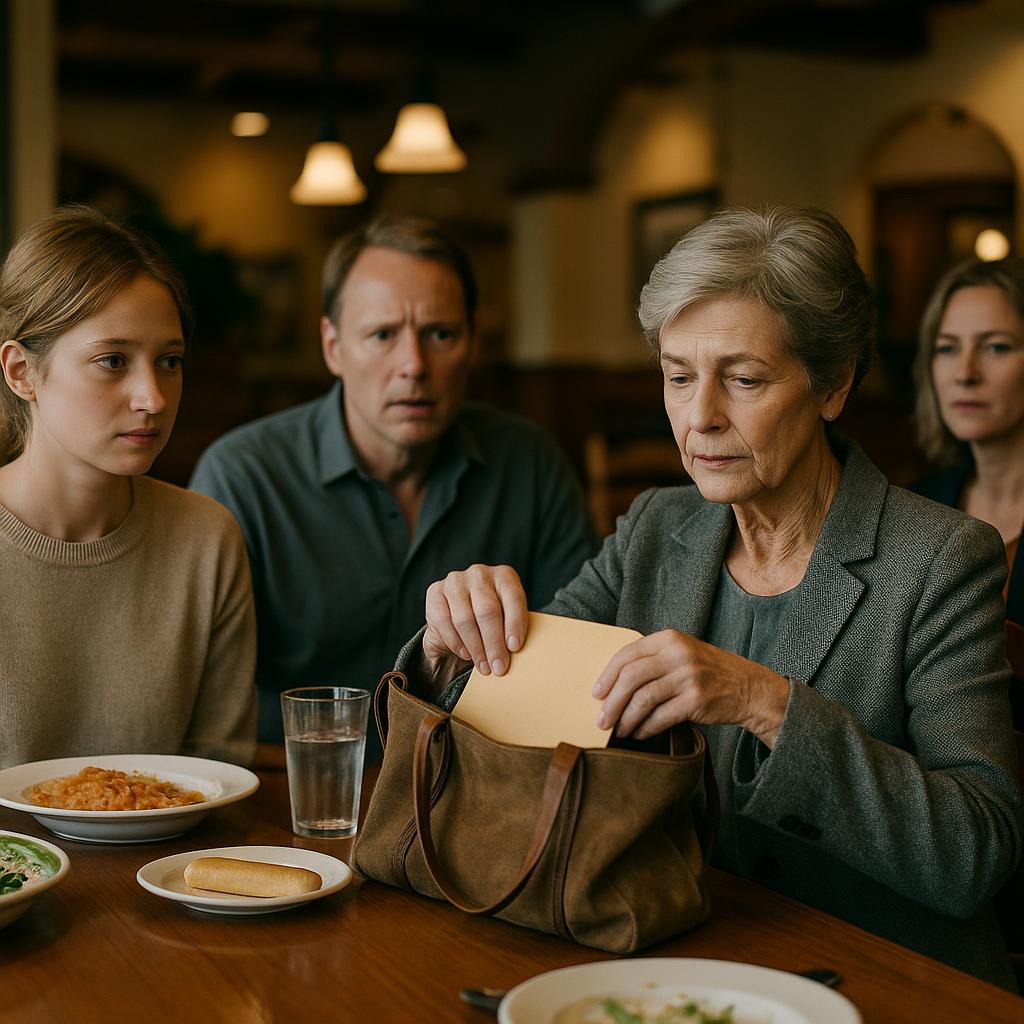 Image by RM AI
Image by RM AI
The Support Group Leadership
I was sipping my morning coffee when Sarah, my oncology nurse, called with an unexpected request. 'Lorraine, we've been seeing more cases like yours,' she said, her voice gentle but urgent. 'People whose family members interfere with their treatment—sometimes with the best intentions, sometimes with the worst outcomes.' She explained that the hospital wanted to start a support group specifically for patients navigating this bizarre intersection of cancer and family sabotage. 'Would you consider co-leading it?' My first instinct was to say no. Reliving my experience with Patricia felt like picking at a wound that was finally starting to heal. But then Sarah mentioned a woman whose sister had thrown away her chemo pills, convinced they were 'poison.' Another whose husband had secretly been diluting her medication because he'd read online it was 'too strong.' I thought about how alone I'd felt, how I'd questioned my own sanity. 'I'll do it,' I heard myself say, surprising us both. 'If my story can be someone else's warning sign, then maybe what Patricia did wasn't completely in vain.' As I hung up, I realized that while I couldn't change my past, I might be able to change someone else's future—and maybe that was the real healing I needed all along.
 Image by RM AI
Image by RM AI
The First Group Session
The community center meeting room felt both sterile and comforting as I arranged chairs in a circle. My hands trembled slightly as I placed my notes on the facilitator's table—who was I to lead others through this bizarre maze of betrayal? But when the first attendees trickled in, their anxious expressions mirroring my own, something shifted. 'My name is Lorraine,' I began, my voice steadier than expected, 'and my mother-in-law replaced my cancer medication with homemade herbal pills.' The relief on their faces was immediate. A young woman with a colorful head scarf squeezed her hands together. 'My father flushed my leukemia meds down the toilet,' she whispered. 'Said they were poisoning my soul.' An elderly gentleman nodded vigorously. 'My wife of forty-two years tried to swap my hormone therapy with saw palmetto. Told everyone at church I was cured.' One by one, they shared stories so similar to mine it was eerie—the same language, the same justifications, the same betrayals wrapped in love. For two hours, we formed an unlikely fellowship of the medically sabotaged. As we ended the session, a woman in her thirties grabbed my hand. 'I thought I was the only one,' she said, tears streaming down her face. 'I thought I was crazy.' Walking to my car afterward, I realized that Patricia's actions, which had nearly destroyed me, might now be the very thing helping others survive their own family's dangerous 'love.'
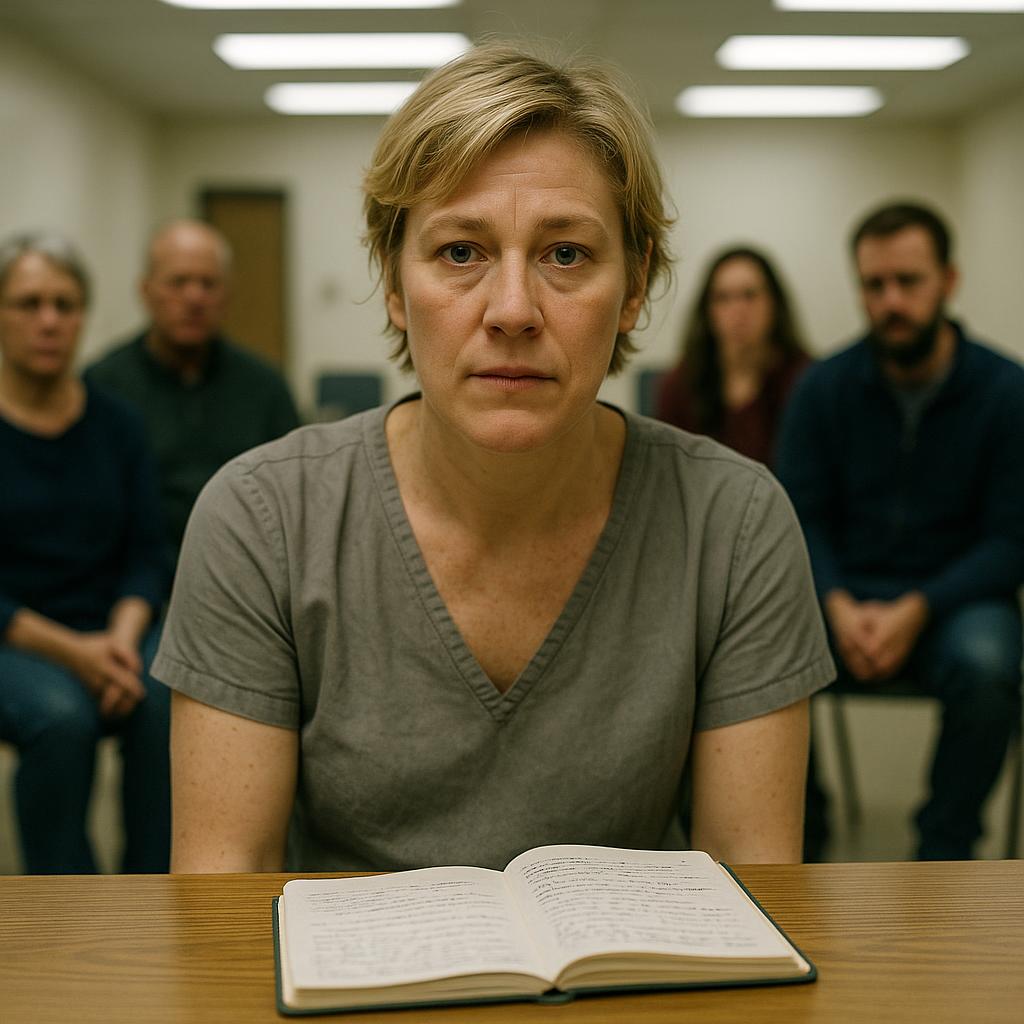 Image by RM AI
Image by RM AI
The One-Year Anniversary
One year to the day after hearing those three terrifying words—"you have cancer"—I stood in our backyard surrounded by the people who'd actually helped me survive it. The string lights twinkled overhead as Dr. Sharma raised his glass of sparkling cider. "To science, to medicine, and most importantly, to Lorraine's incredible resilience," he toasted, his kind eyes crinkling at the corners. Everyone cheered, but I couldn't help noticing the empty space where Patricia should have been. Her absence felt like a phantom limb—painful yet necessary. Later, after our guests had gone and the kids were cleaning up, Mark found me sitting on our bed, tears streaming down my face. "Hey," he whispered, sitting beside me. "What's wrong?" I shook my head, unable to explain that these weren't sad tears. "I made it," I finally managed. "Not just through the cancer, but through... everything." He wrapped his arm around me, and we sat in silence, both understanding that surviving betrayal had been its own kind of chemotherapy—toxic, necessary, and ultimately life-saving. As I drifted off to sleep that night, I wondered if Patricia was marking this anniversary too, and what version of the story she was telling herself about why she wasn't there to celebrate it.
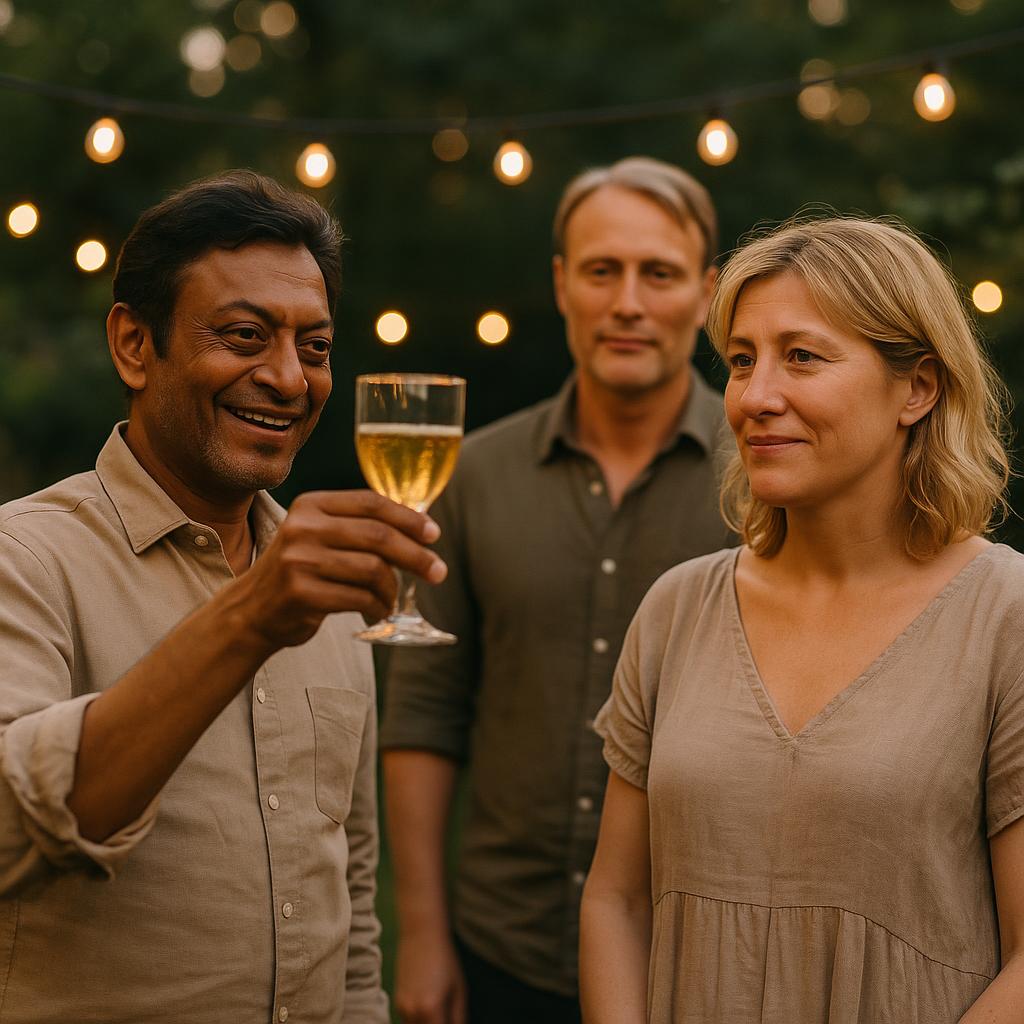 Image by RM AI
Image by RM AI
The Unexpected Letter
The envelope sat on our kitchen counter for three days before I found the courage to open it. The return address—'Dr. Eleanor Weiss, Cognitive Behavioral Therapy'—made my stomach clench. Inside was a letter on crisp professional letterhead, not Patricia's usual handwriting. 'Dear Lorraine,' it began, 'I am writing with the express permission of Patricia Wilson, who has been under my care for the past four months.' I had to sit down, my legs suddenly weak. The therapist explained she specialized in deprogramming individuals from extremist health beliefs—a growing field, apparently. Patricia had been attending twice-weekly sessions, working through the ideology that had led her to replace my medication. 'She understands now that her actions could have killed you,' Dr. Weiss wrote, 'though this realization has been profoundly traumatic for her to accept.' I traced my finger over the words, trying to imagine Patricia—stubborn, certain Patricia—admitting she was wrong. The letter ended with a question that made my coffee go cold in my hands: 'Patricia is not asking for forgiveness, but for understanding. Would you consider meeting with her in my office, in a controlled therapeutic environment?' I folded the letter and slid it back into its envelope, wondering if healing could ever be possible when the wound was inflicted by someone who claimed to love you.
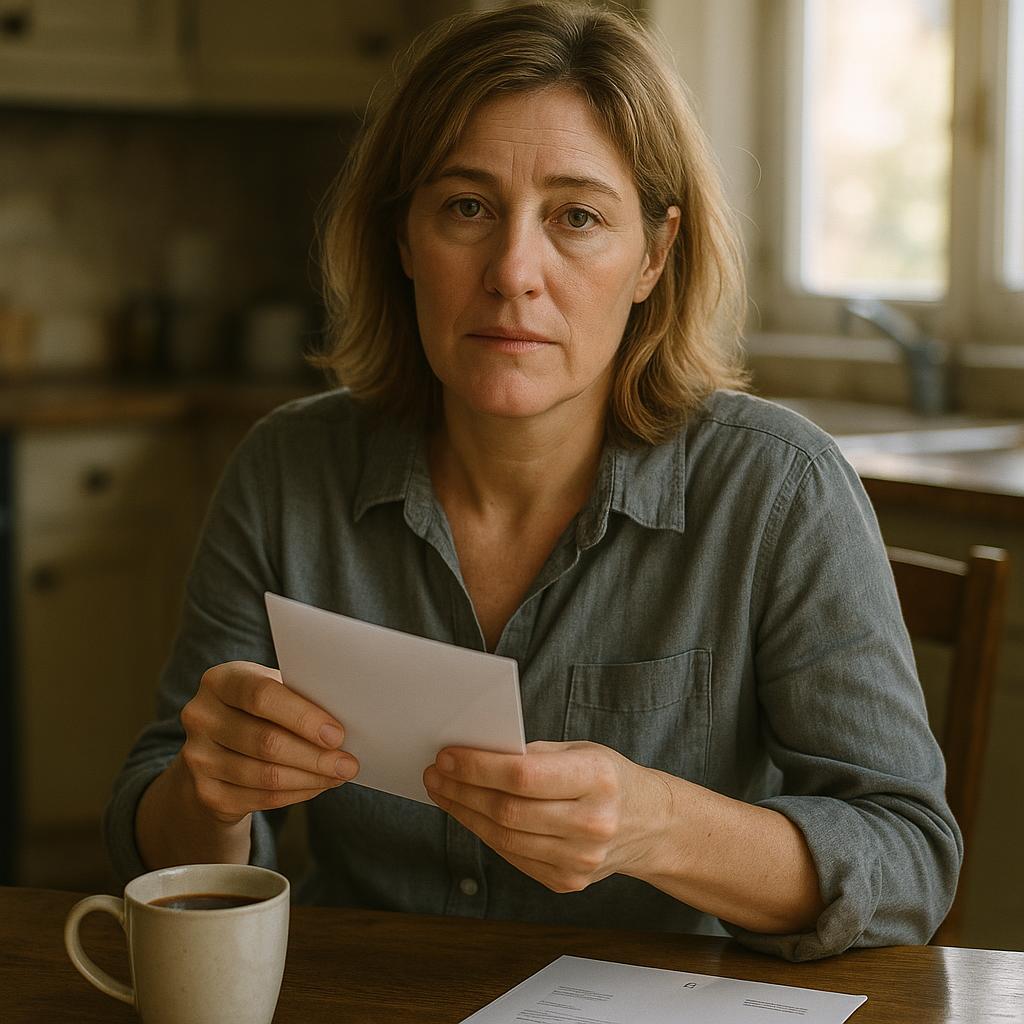 Image by RM AI
Image by RM AI
The New Boundaries
The drive to Dr. Weiss's office felt like the longest twenty minutes of my life. I'd spent weeks in therapy myself, preparing for this moment—not to forgive Patricia, but to reclaim my power in this relationship. 'Remember,' my therapist had told me, 'boundaries aren't punishment; they're protection.' As I parked, I caught sight of my reflection in the rearview mirror. The woman staring back had changed—not just from the cancer, but from the betrayal. I took a deep breath and whispered my mantra: 'I am not responsible for her feelings.' Inside, the waiting room was painted a soothing sage green, with those generic watercolor paintings that scream 'this is a safe space.' When Patricia walked in behind Dr. Weiss, I barely recognized her. She'd lost weight, and the certainty that once radiated from her was gone. Our eyes met, and for a moment, I saw something I'd never seen in her before—shame. 'Lorraine,' she whispered, her voice cracking. I nodded, not trusting myself to speak yet. As we followed Dr. Weiss into her office, I realized that whatever happened in the next hour wouldn't erase the past year, but it might determine whether Patricia would ever be allowed back into our lives—and if so, exactly how far from my medicine cabinet she would need to stay.
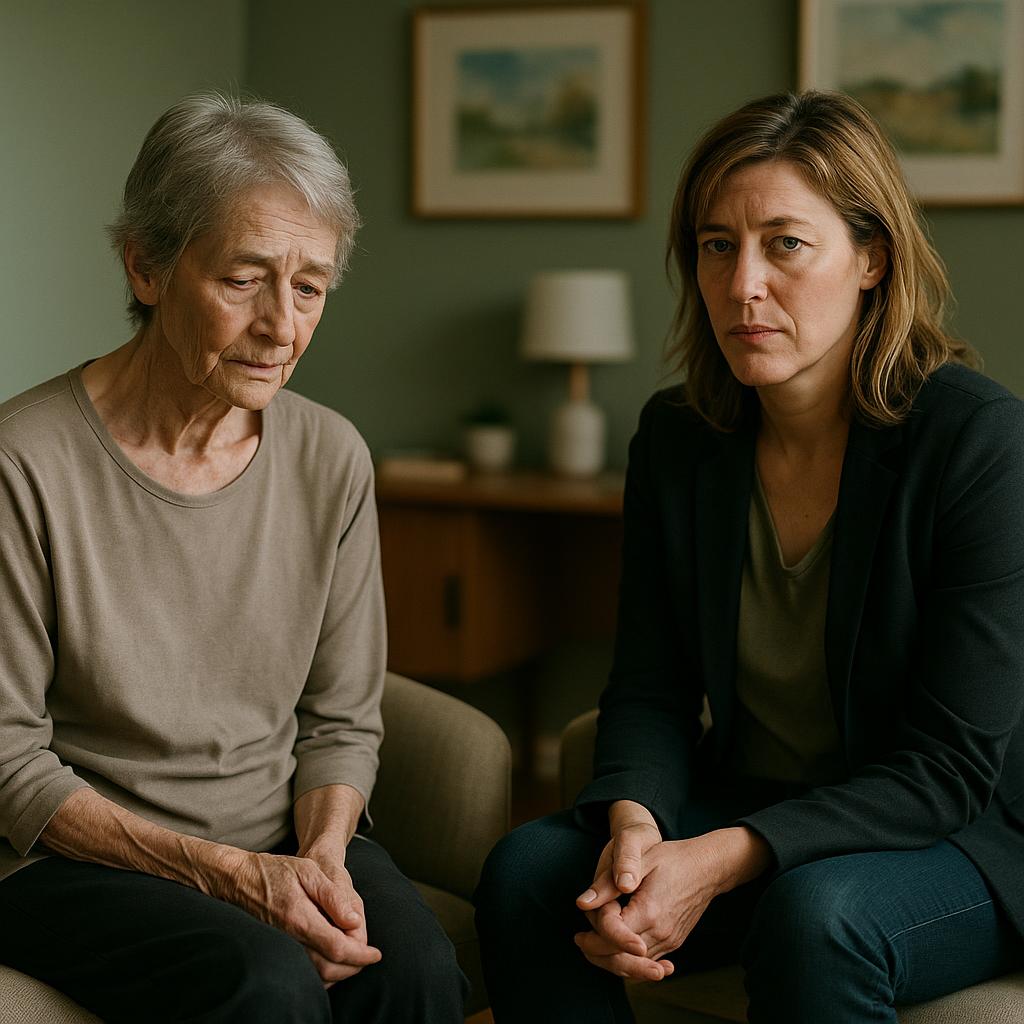 Image by RM AI
Image by RM AI
KEEP ON READING
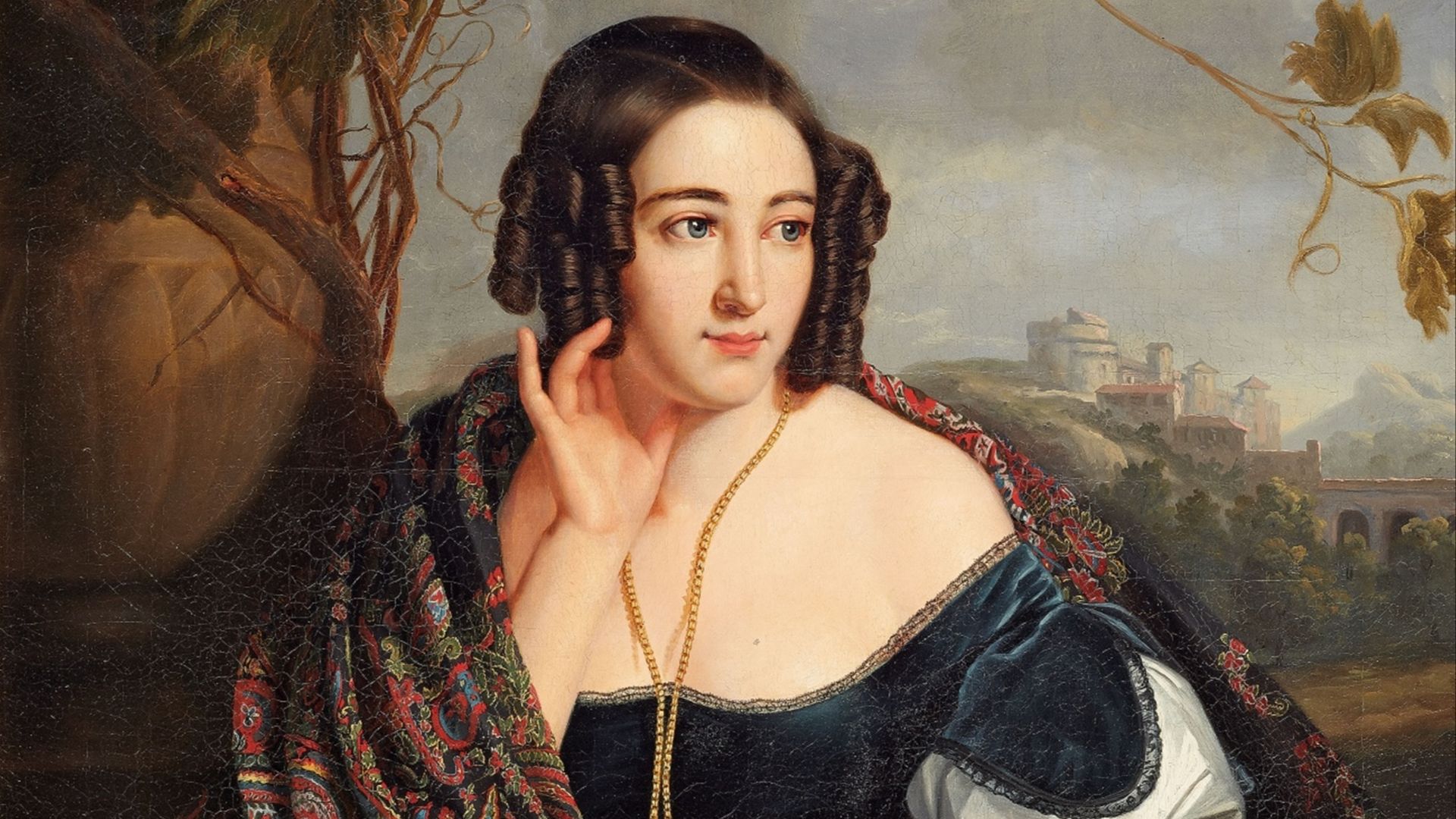
The Glass Delusion: When Historical Figures Believed They'd Shatter
Joseph Karl Stieler on WikimediaPrincess Alexandra of Bavaria had a…
By Ashley Bast Nov 20, 2025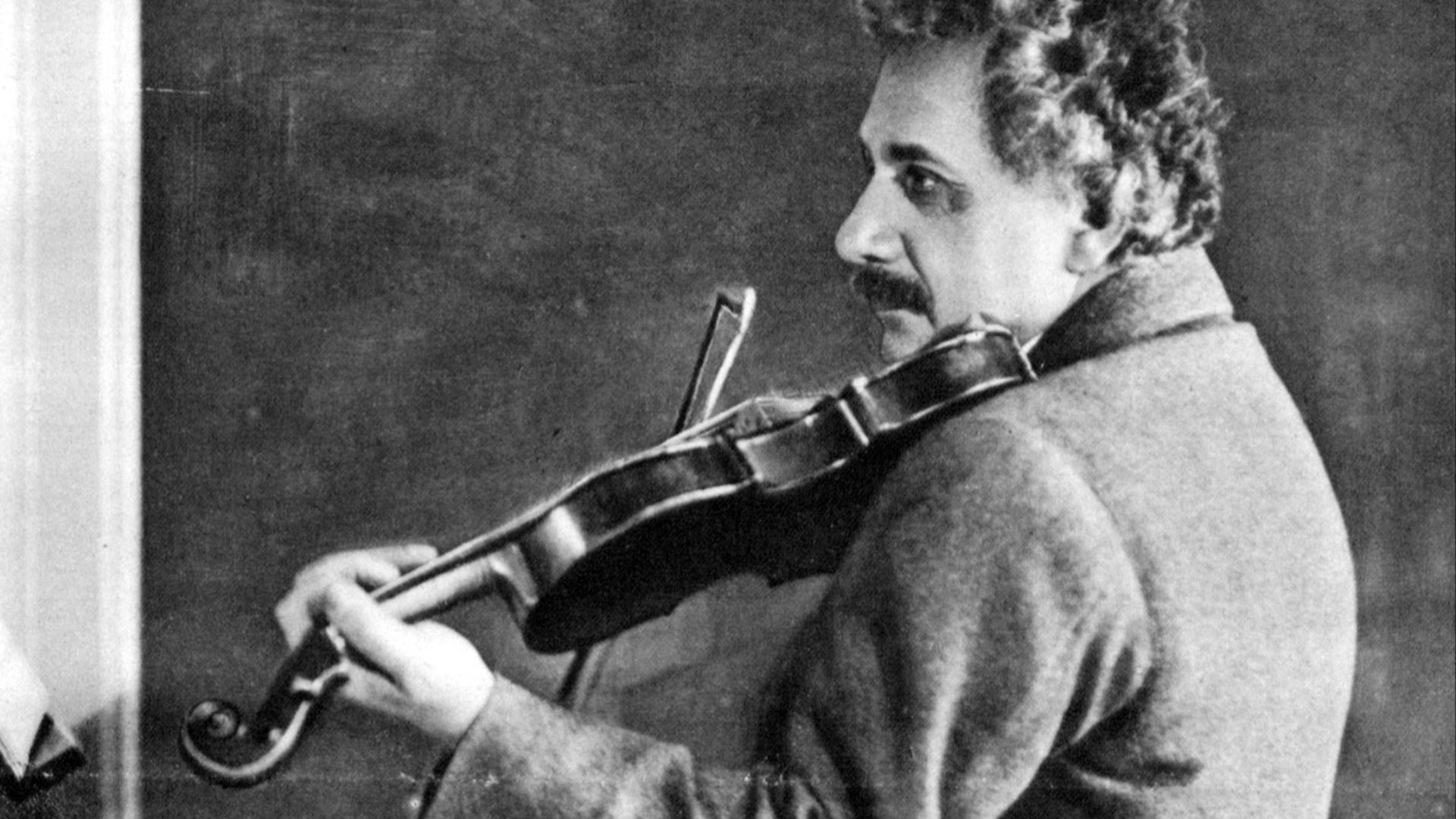
Einstein's Violin Just Sold At An Auction—And It Earned More…
A Visionary's Violin. Wanda von Debschitz-Kunowski on WikimediaWhen you hear…
By Ashley Bast Nov 3, 2025
This Infamous Ancient Greek Burned Down An Ancient Wonder Just…
History remembers kings and conquerors, but sometimes, it also remembers…
By David Davidovic Nov 12, 2025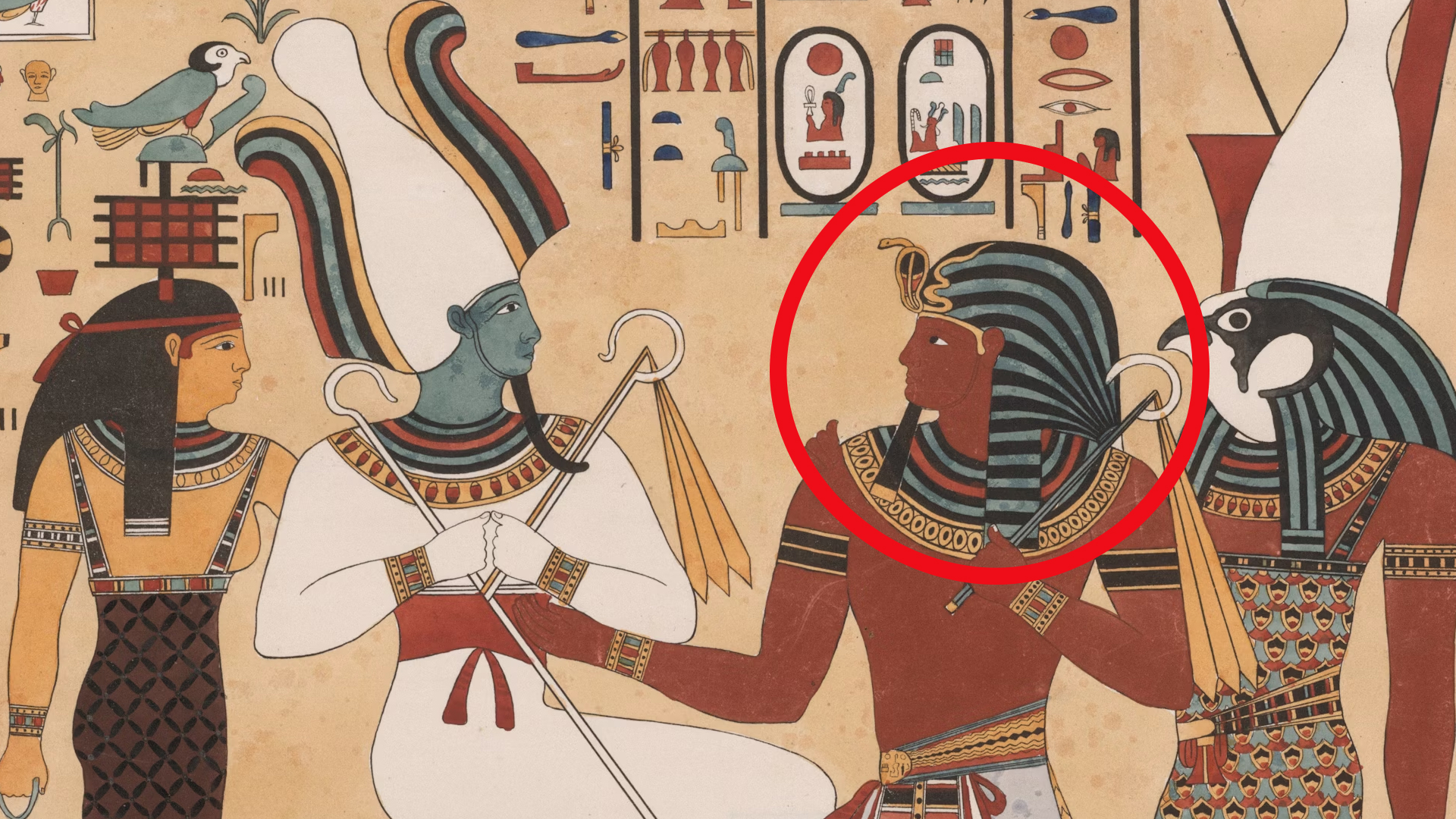
The Mysterious "Sea People" Who Collapsed Civilization
3,200 years ago, Bronze Age civilization in the Mediterranean suddenly…
By Robbie Woods Mar 18, 2025
20 Inventors Who Despised Their Creations
Made It… Then Hated It. Inventors often dream big, but…
By Chase Wexler Aug 8, 2025
20 Incredible Items In The British Museum People Say Were…
Mystery In History. The mighty halls of the British Museum…
By Chase Wexler Sep 8, 2025
